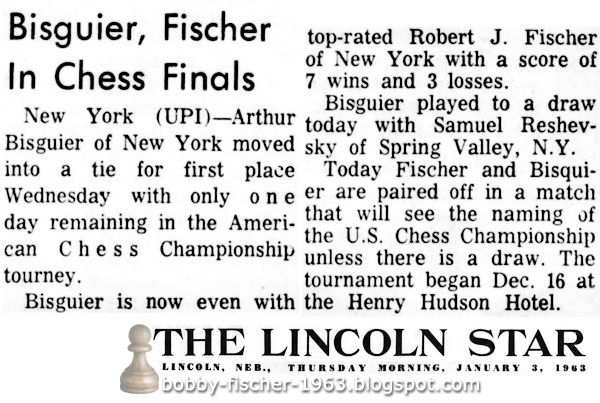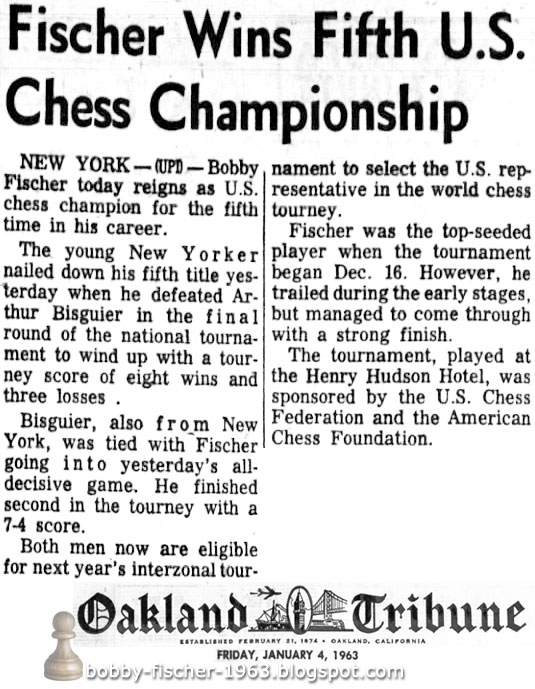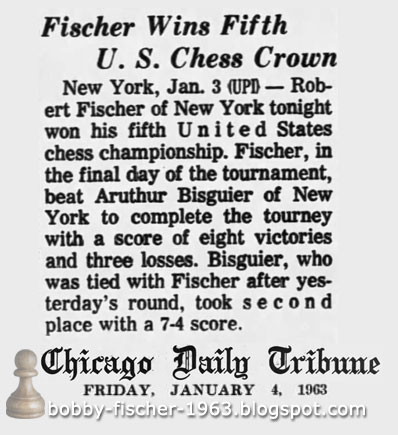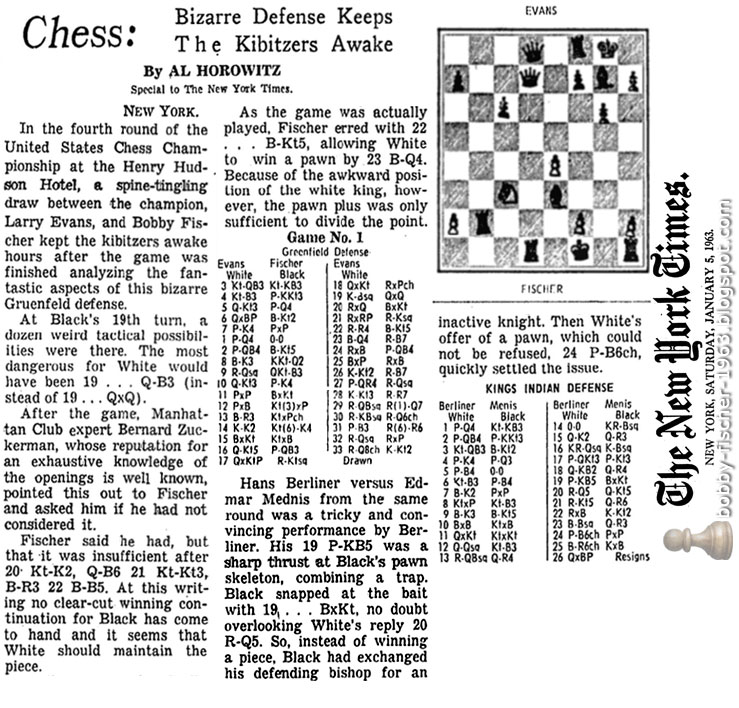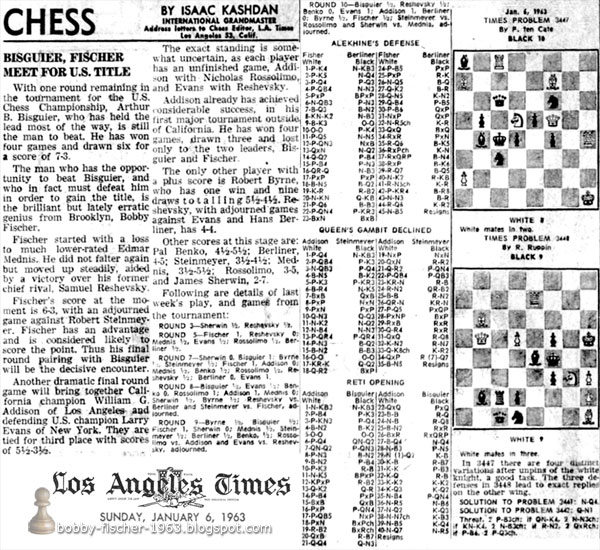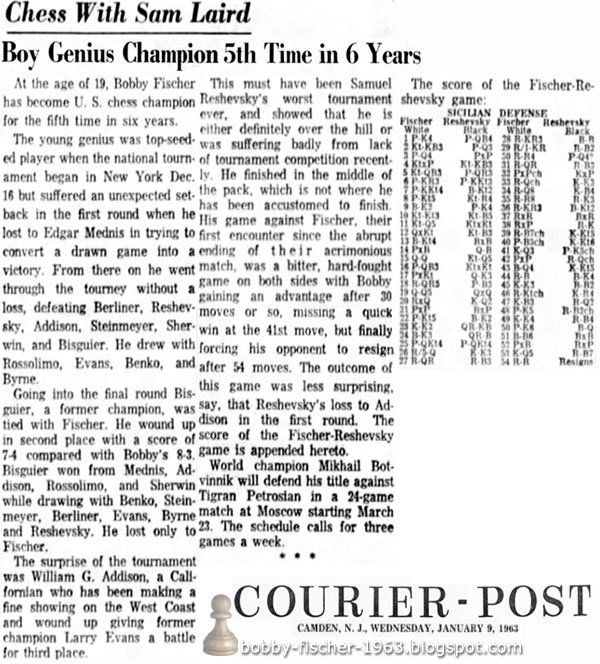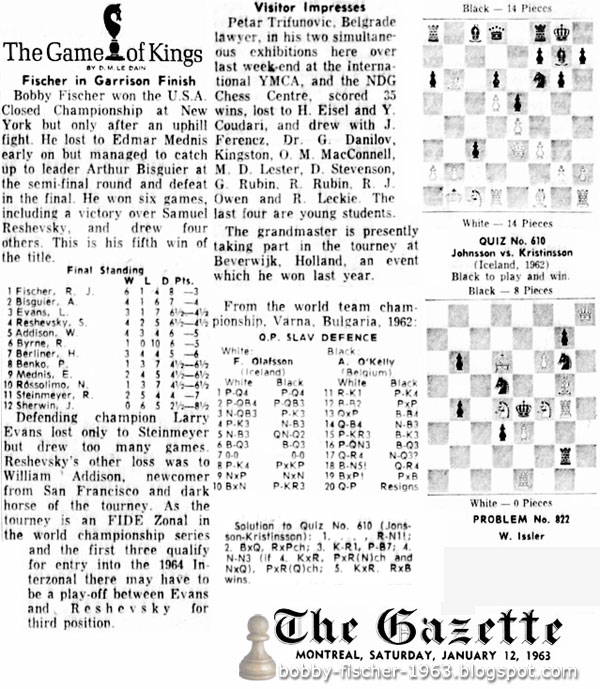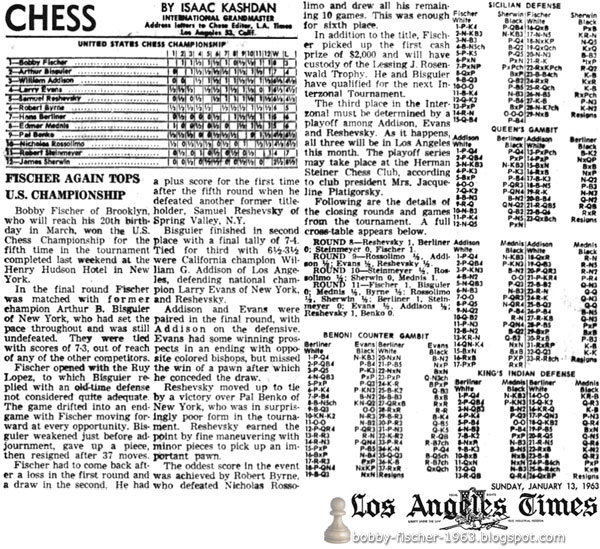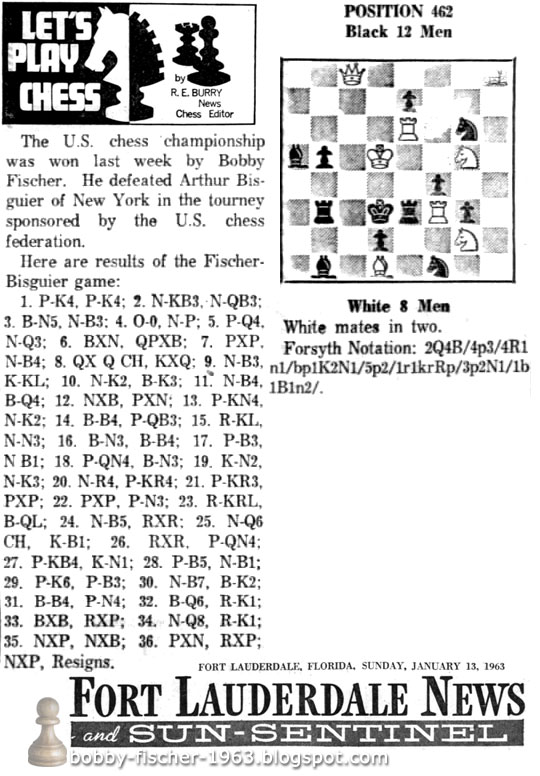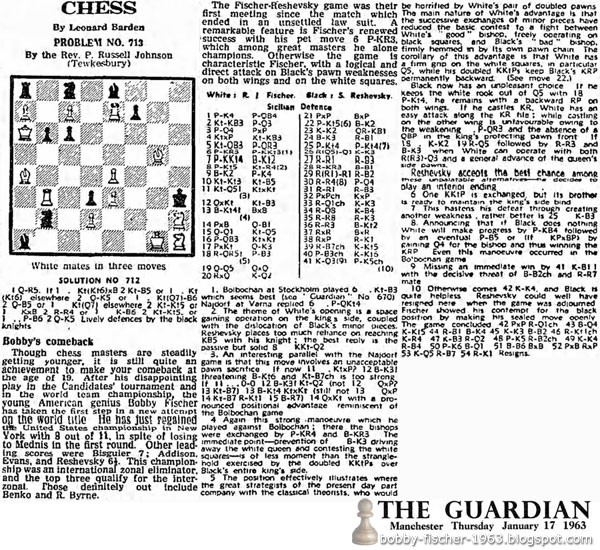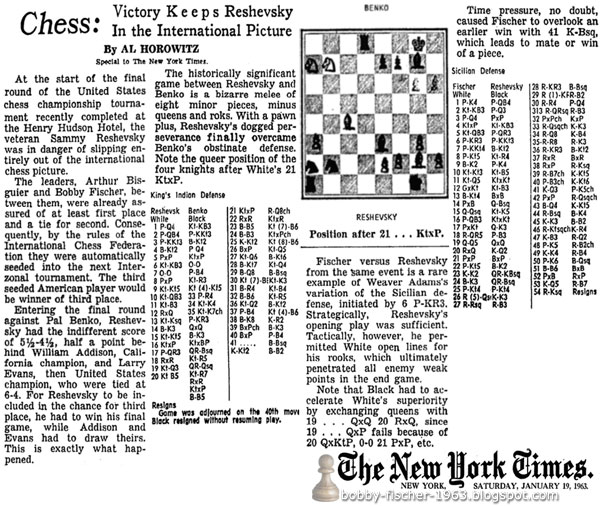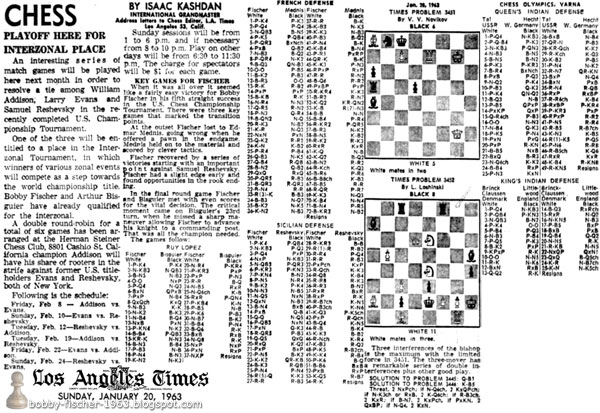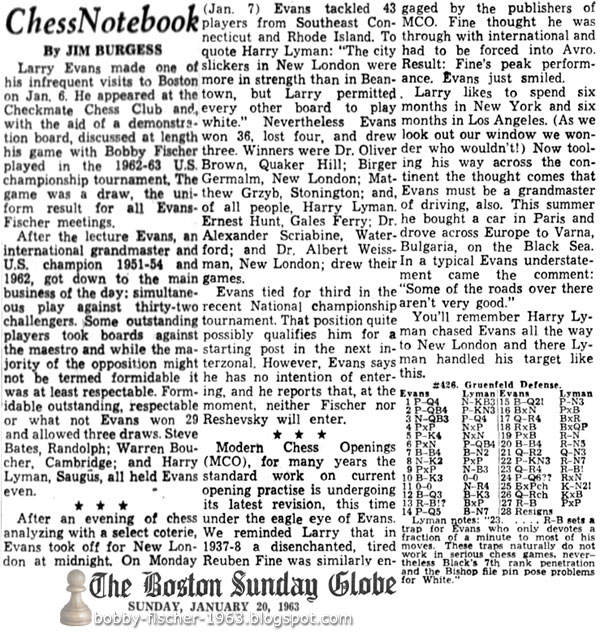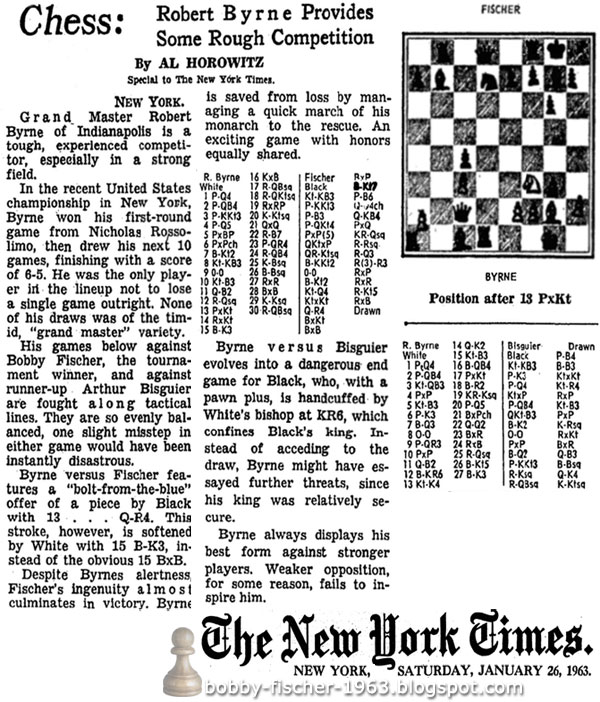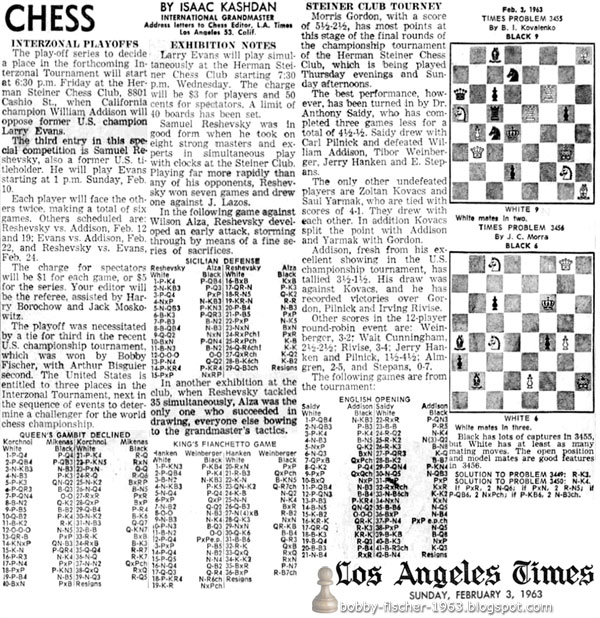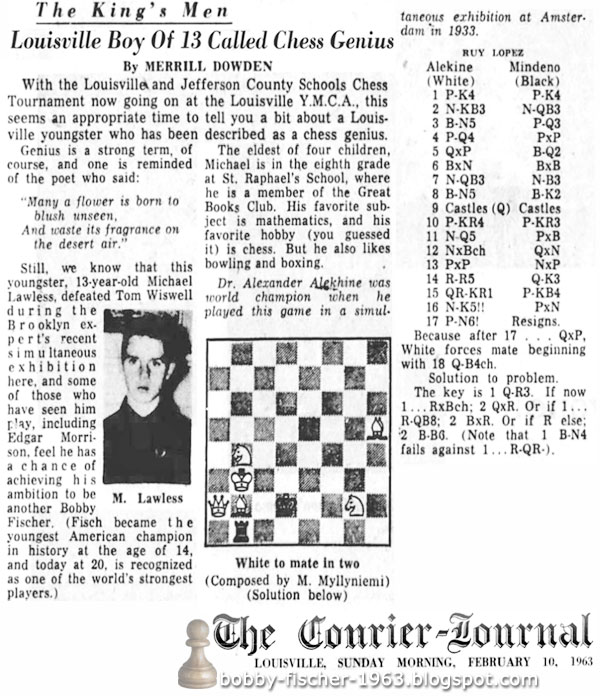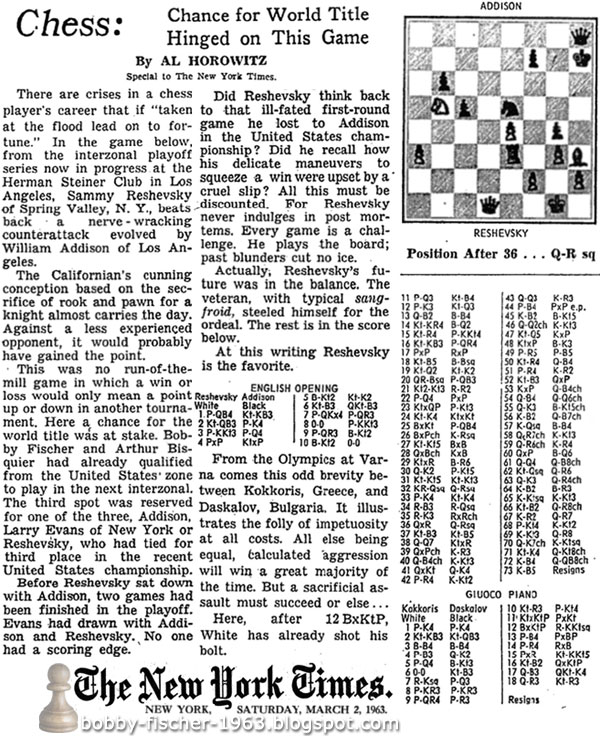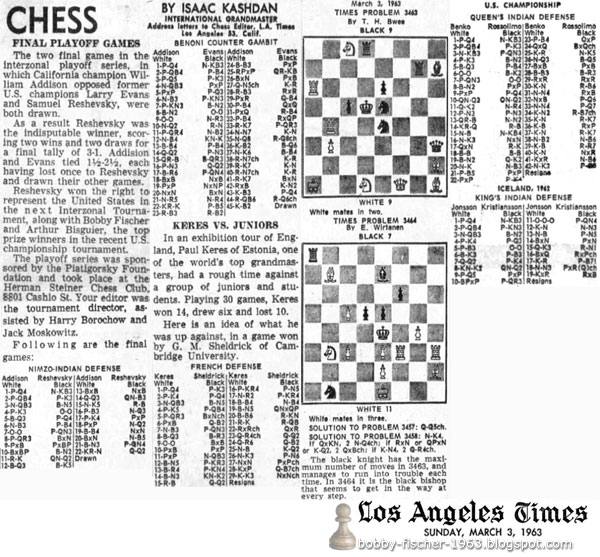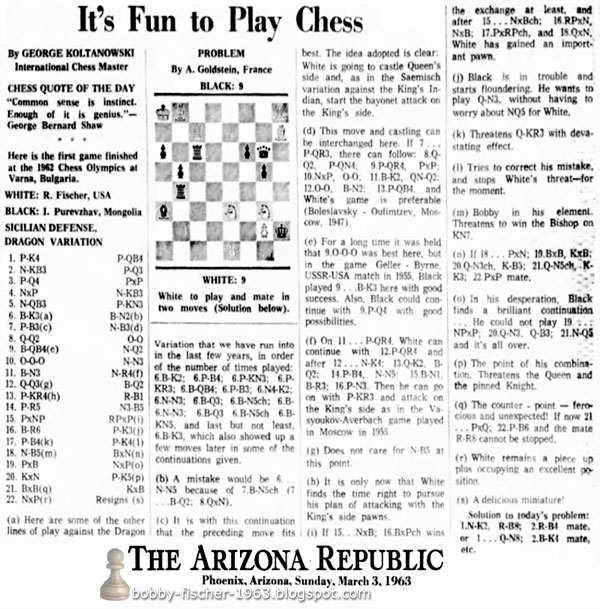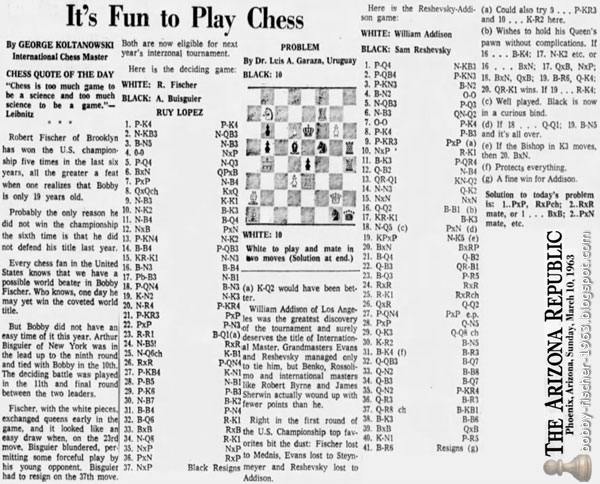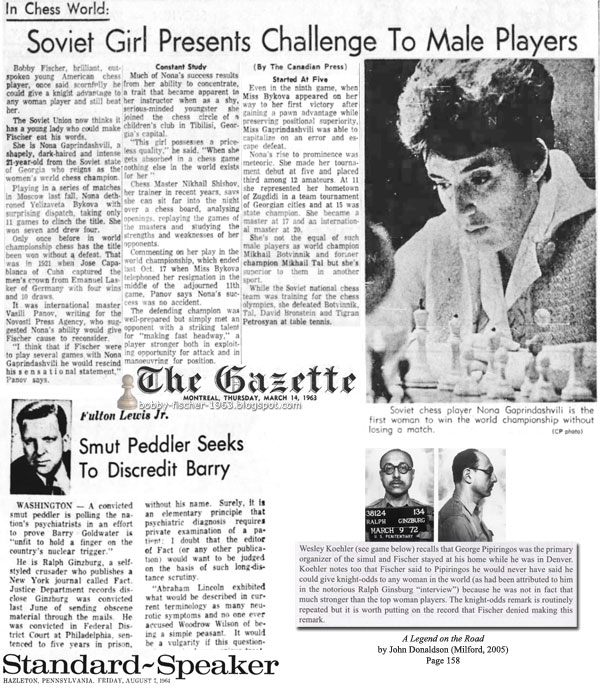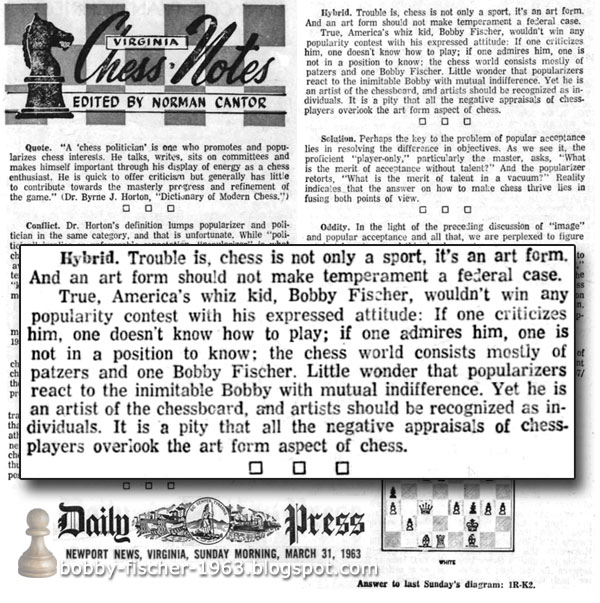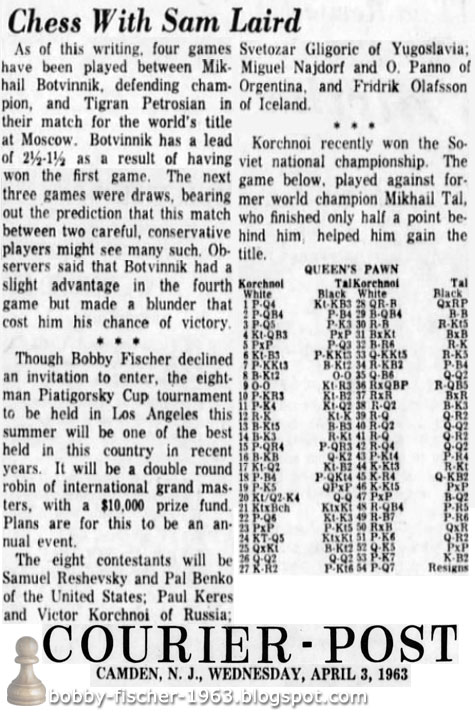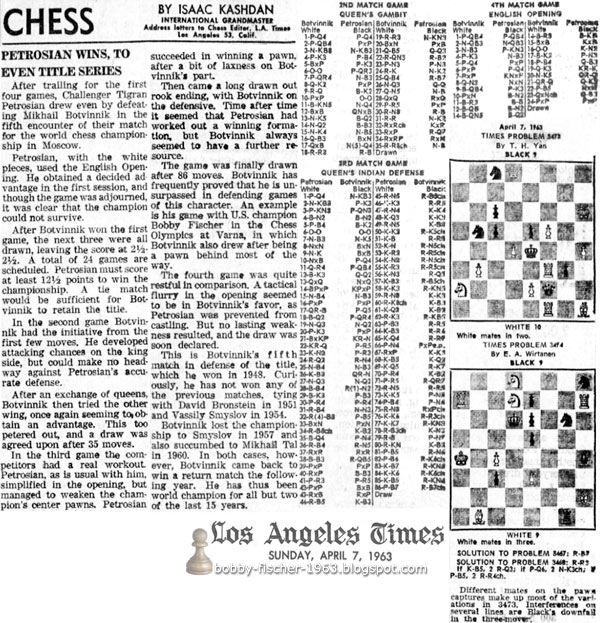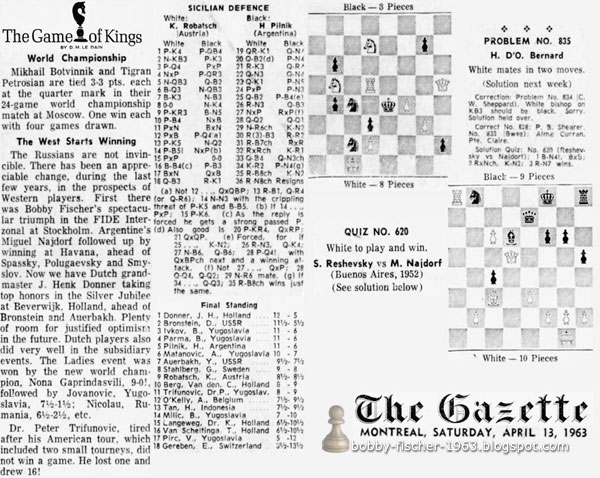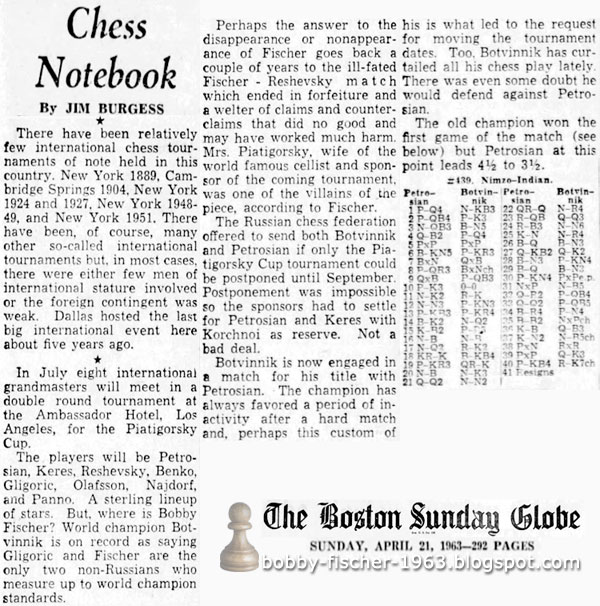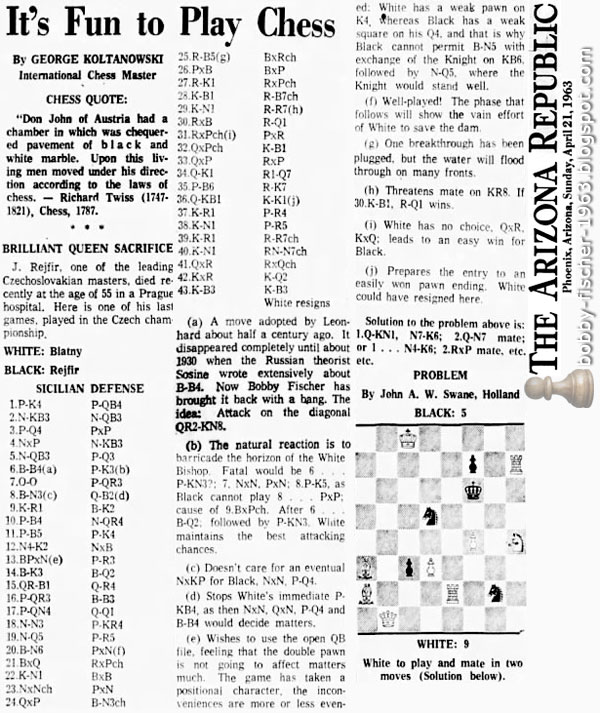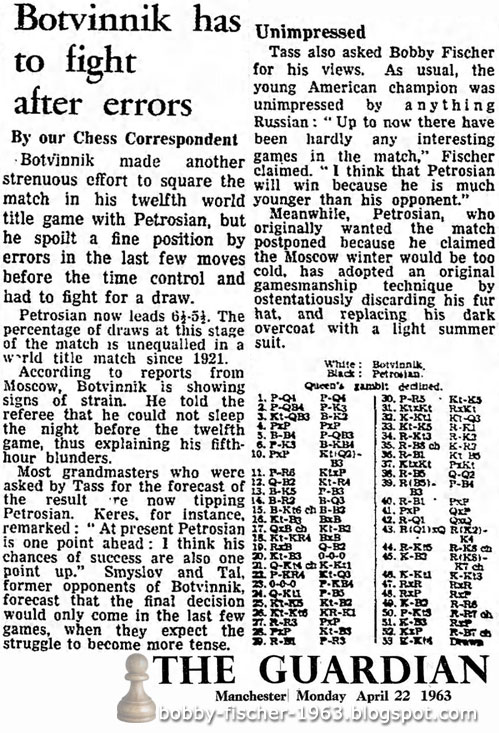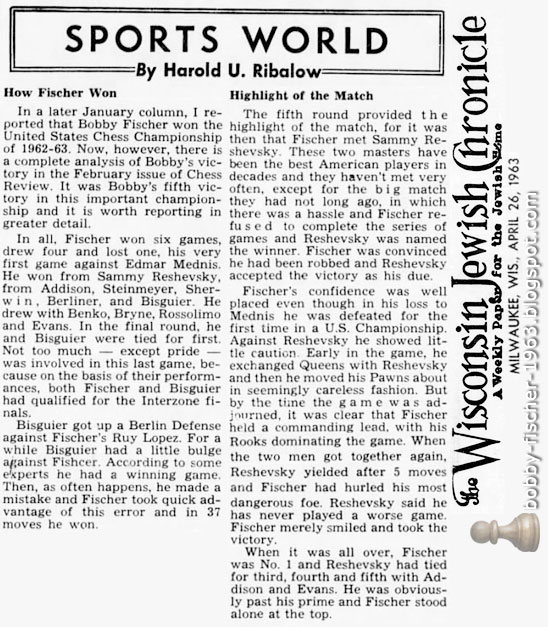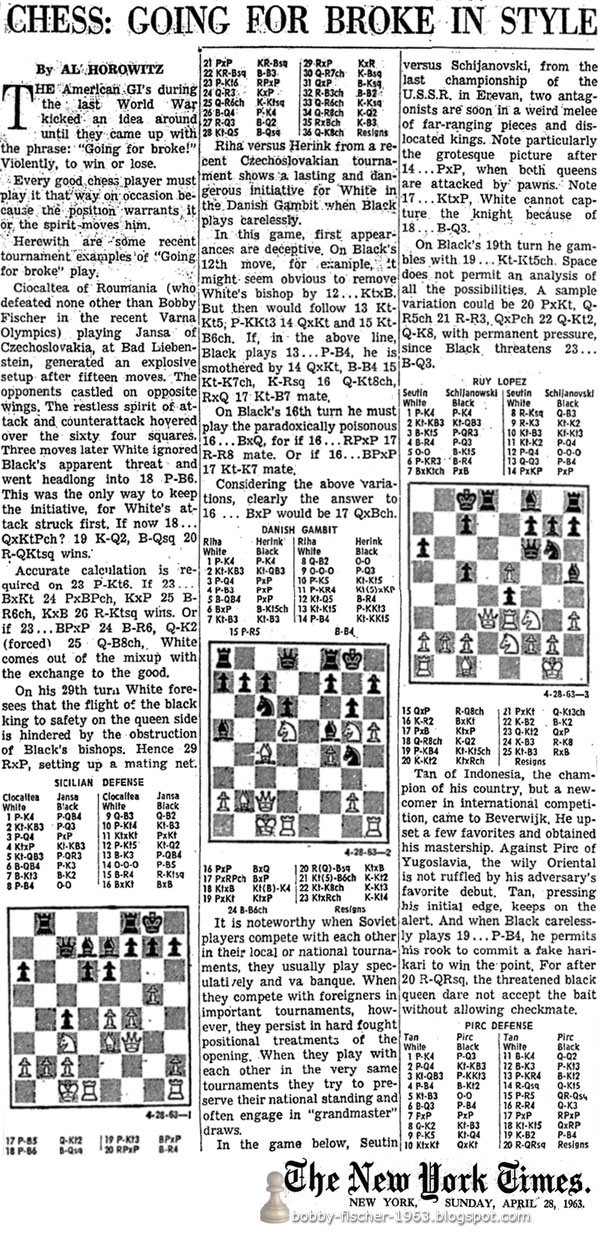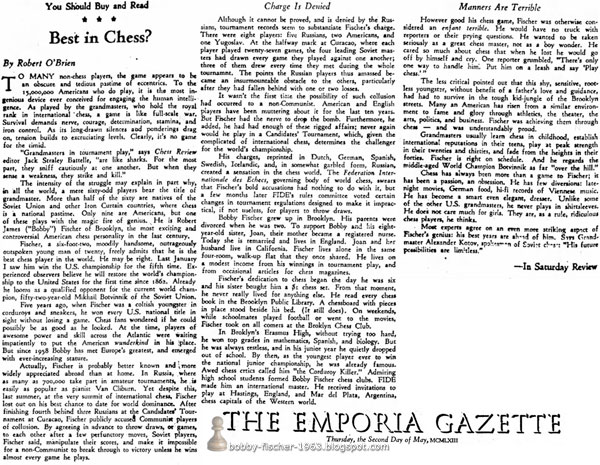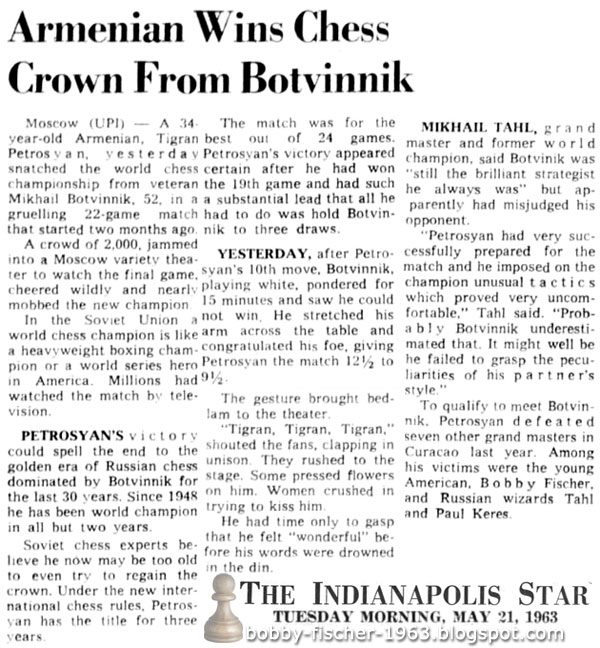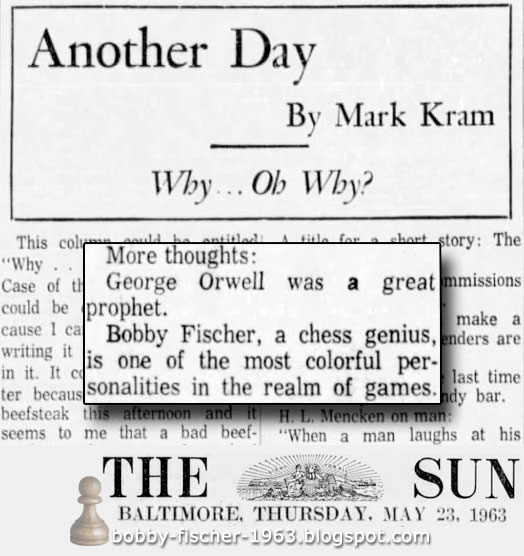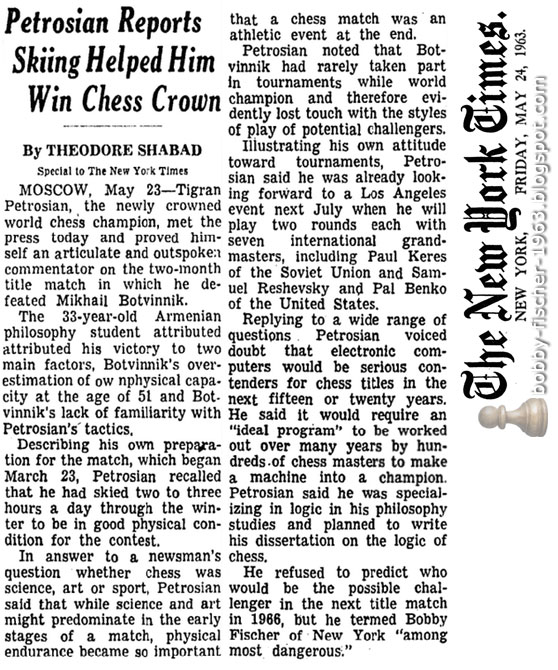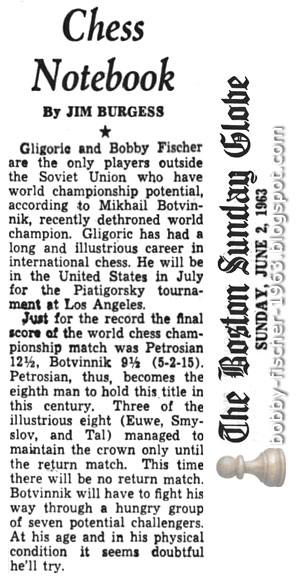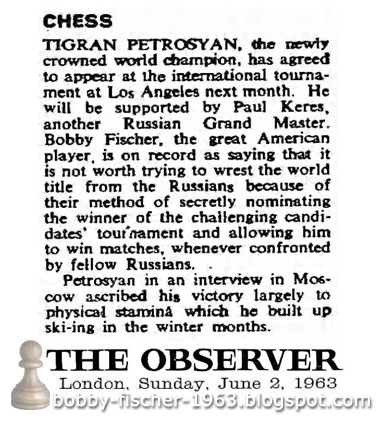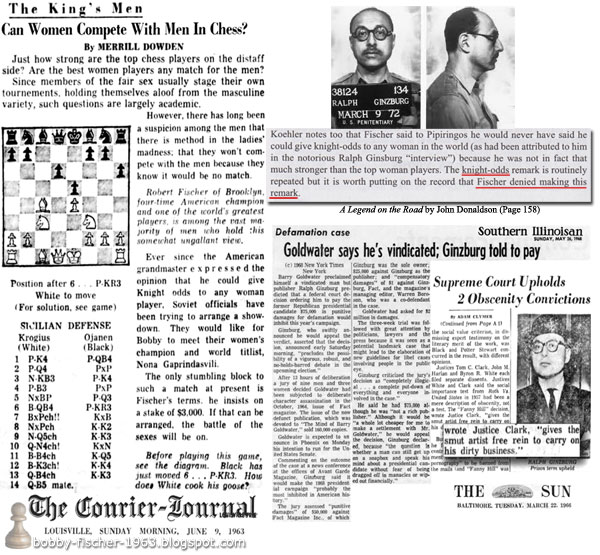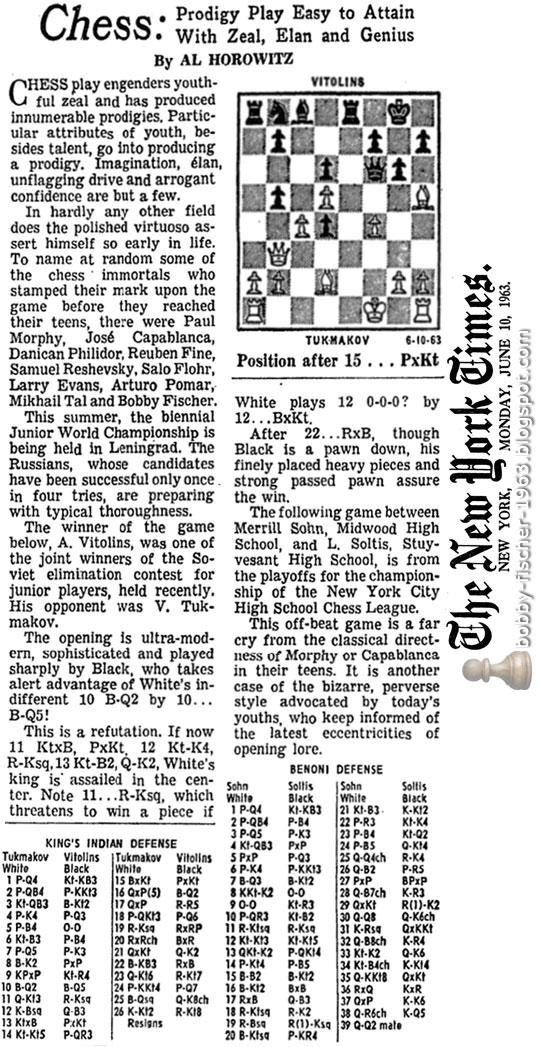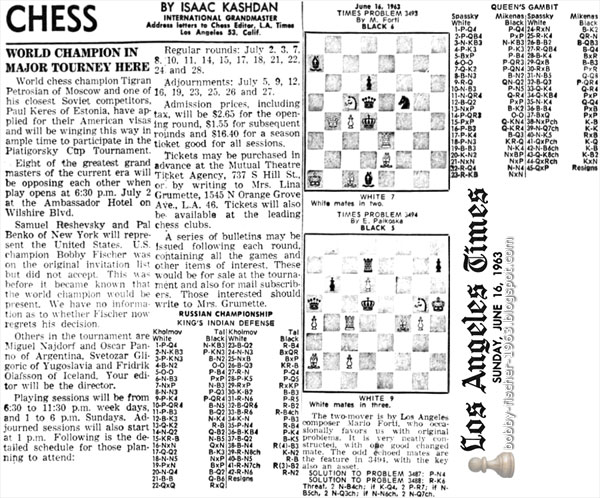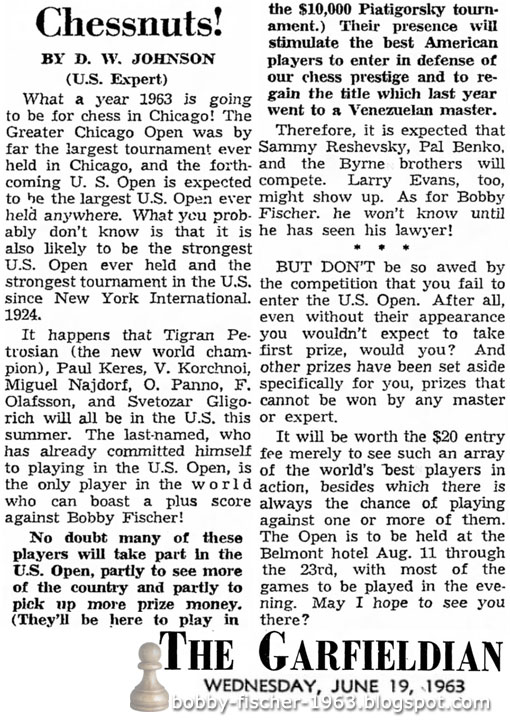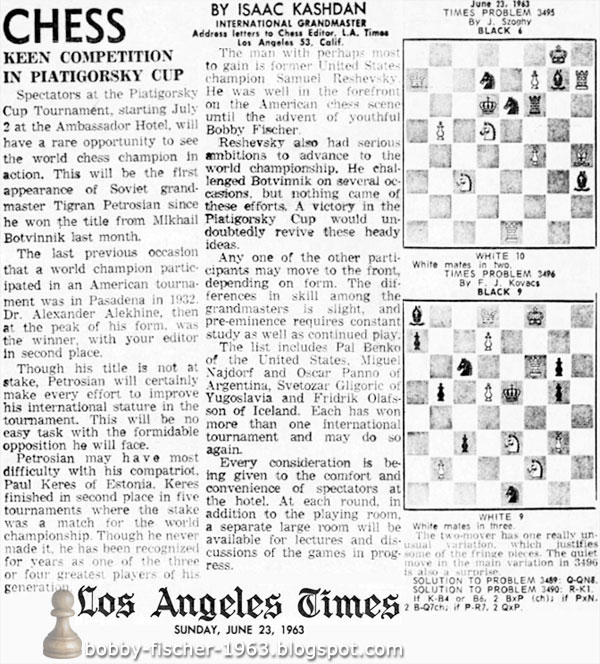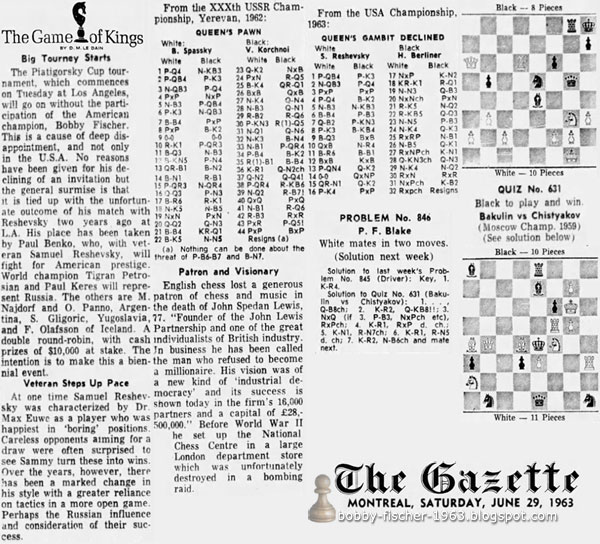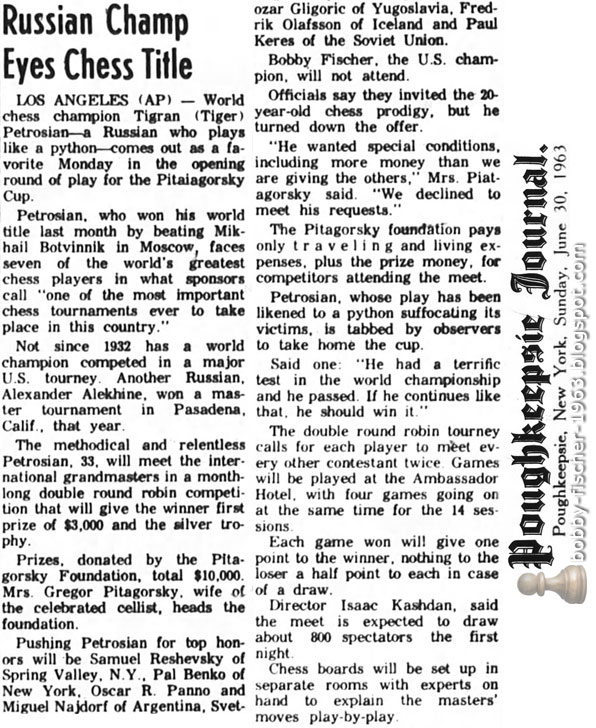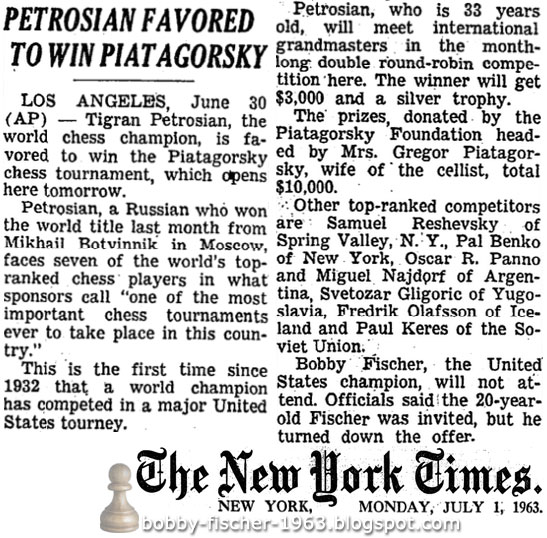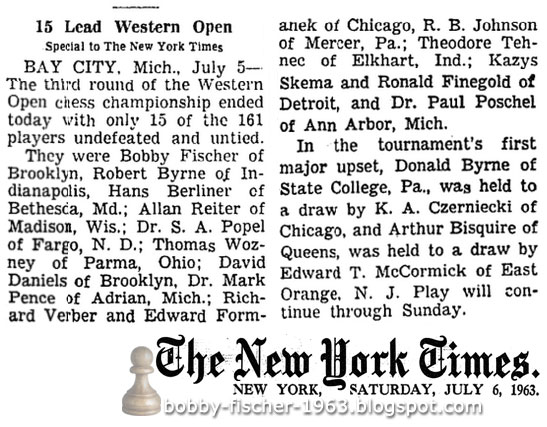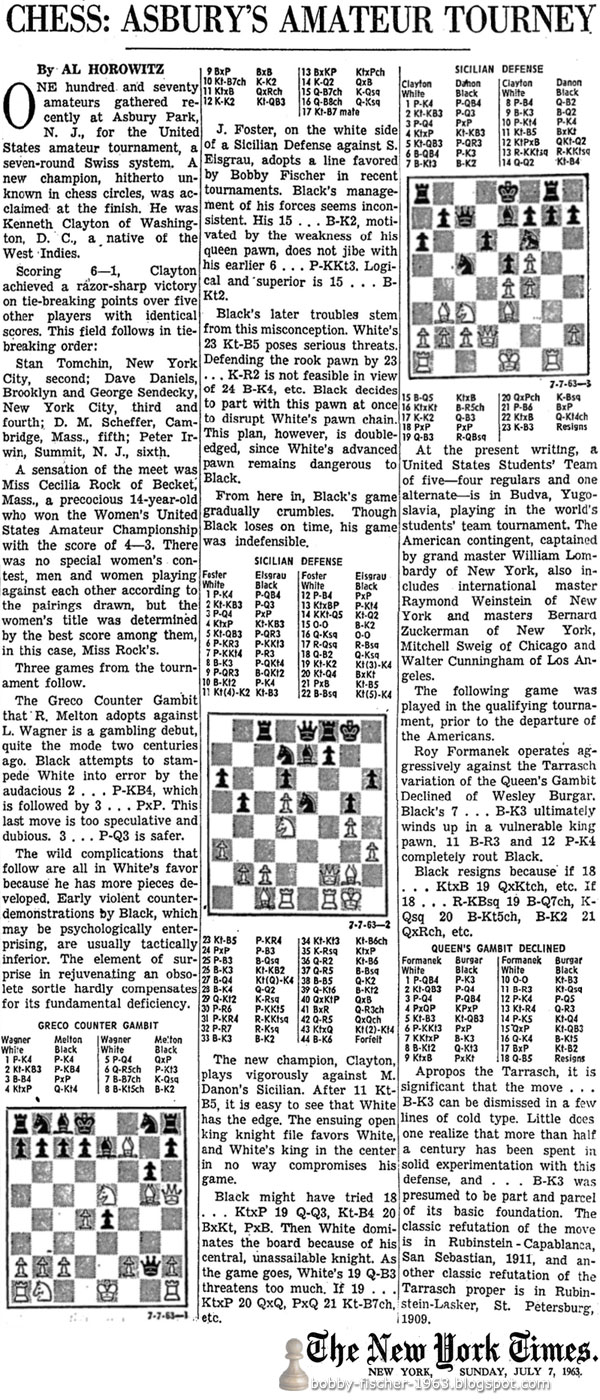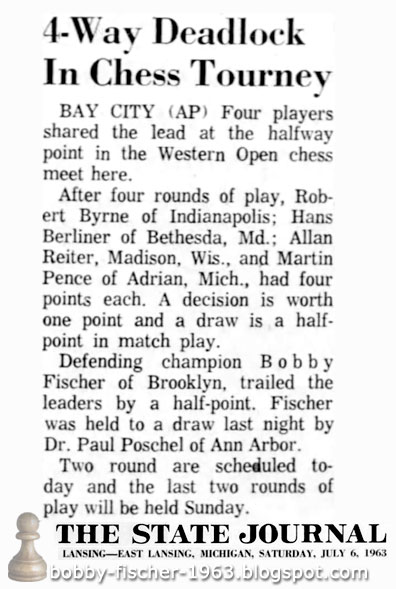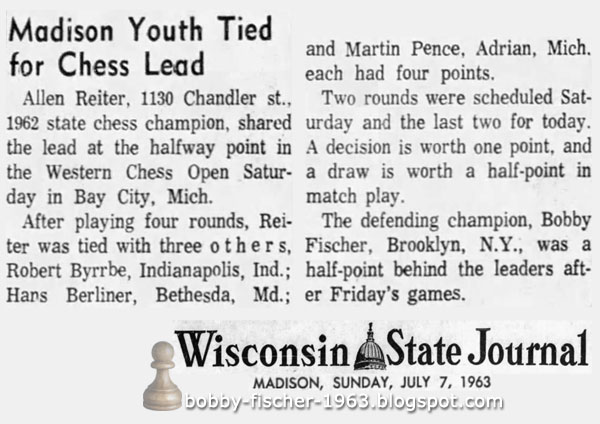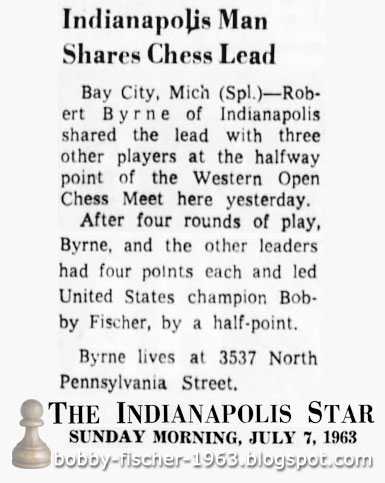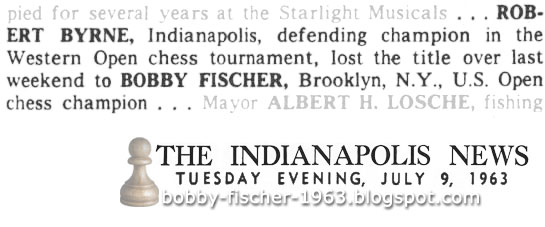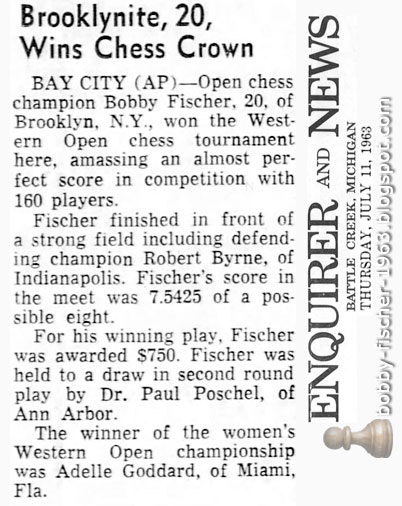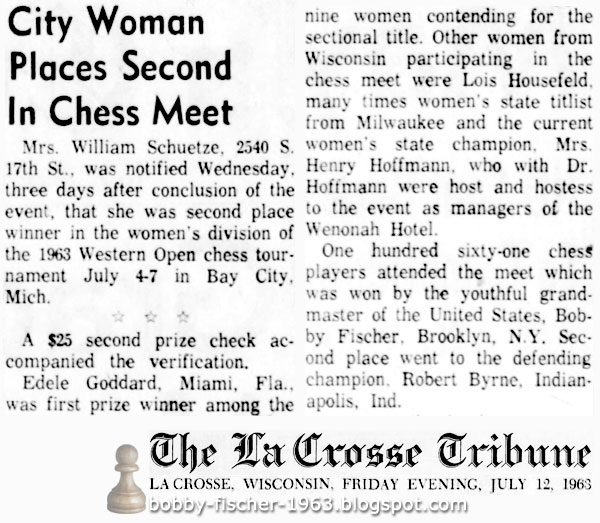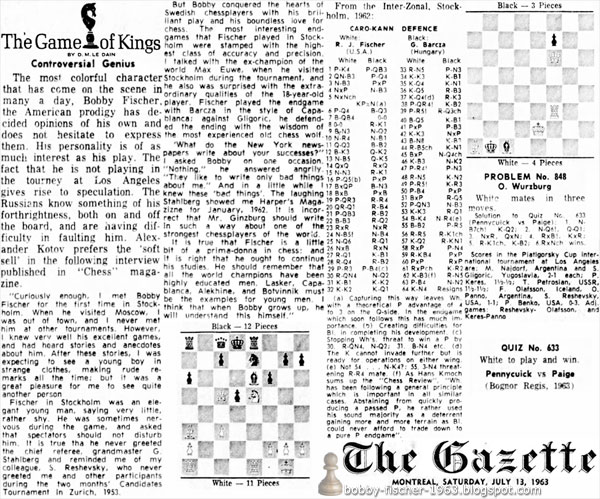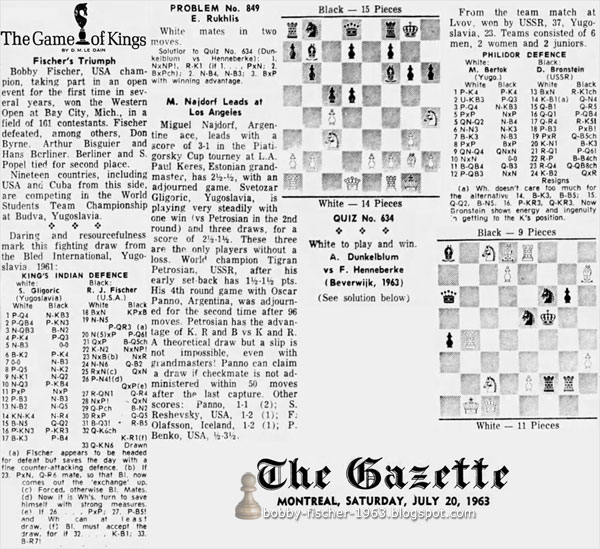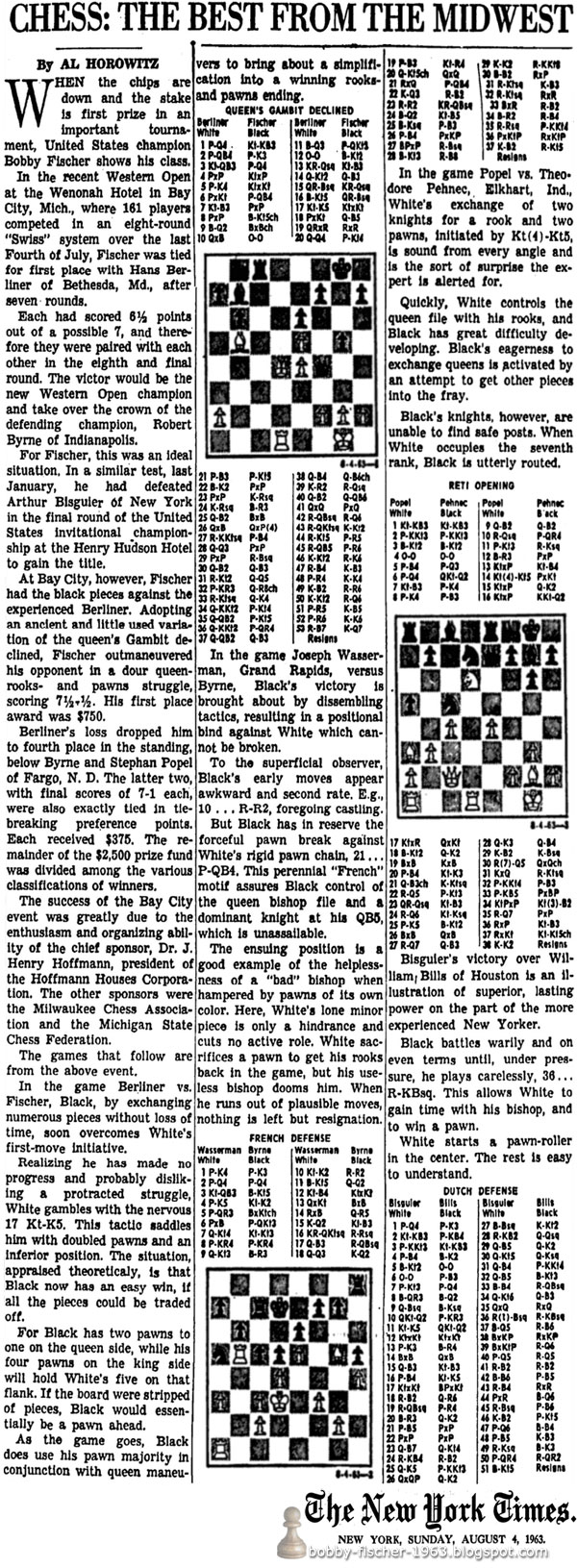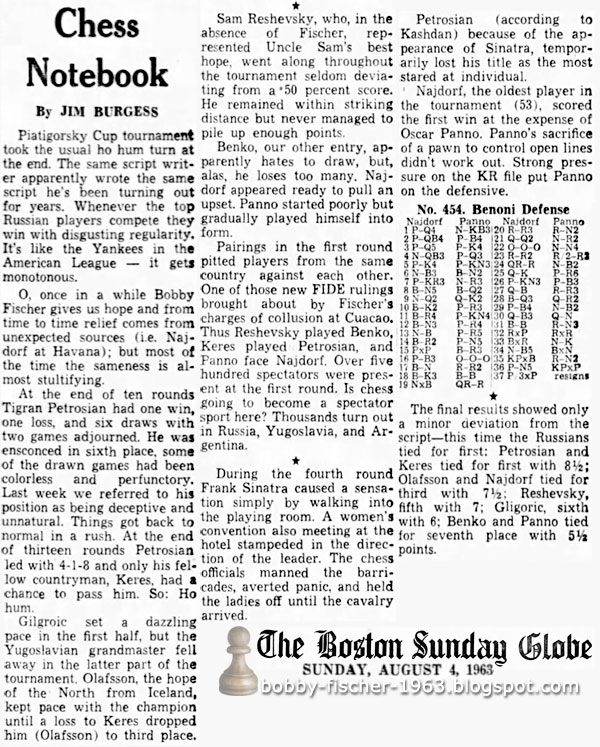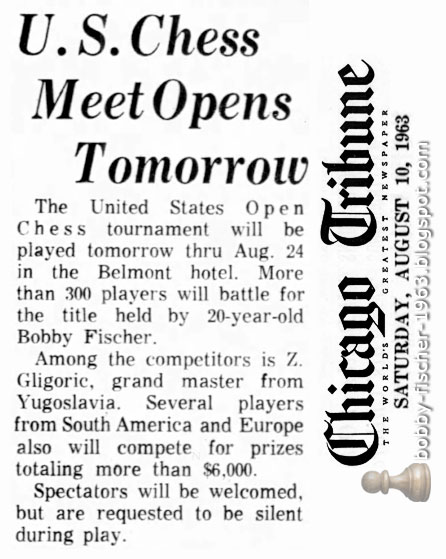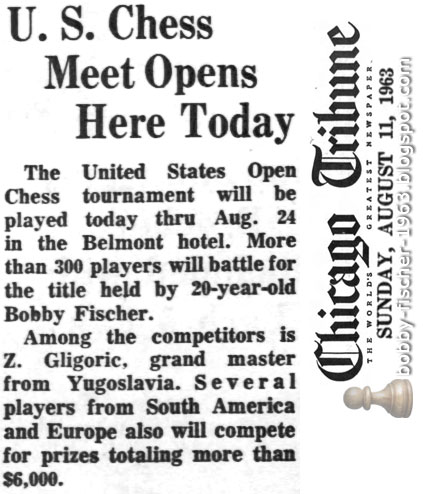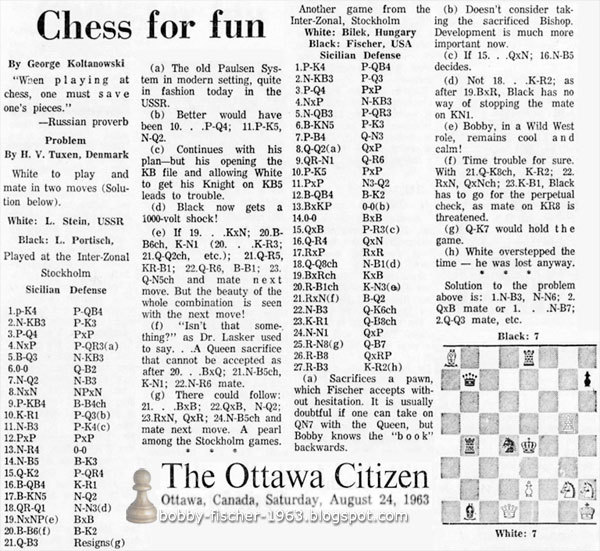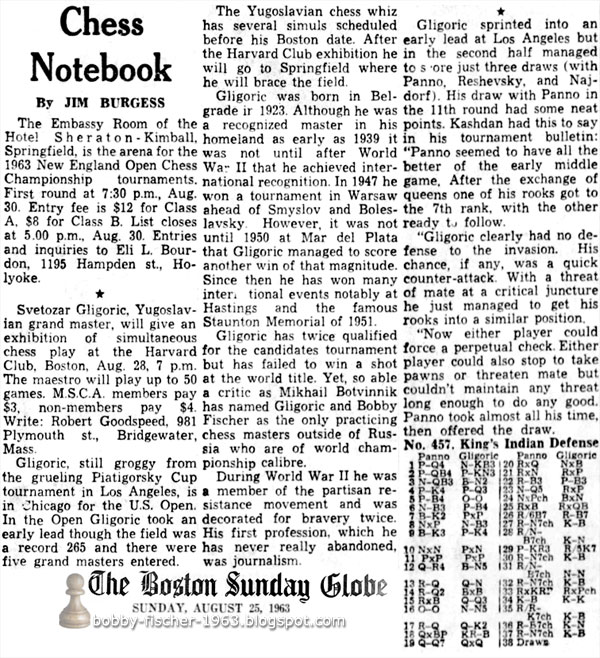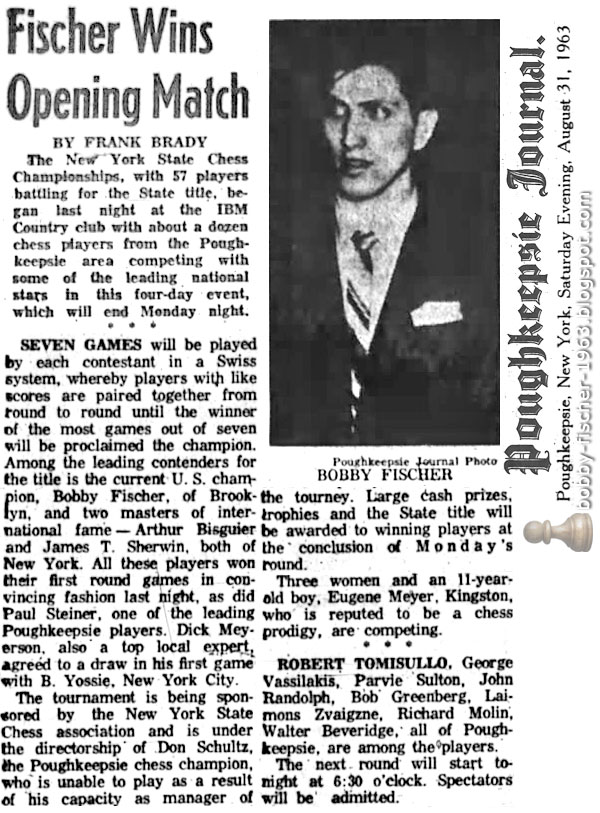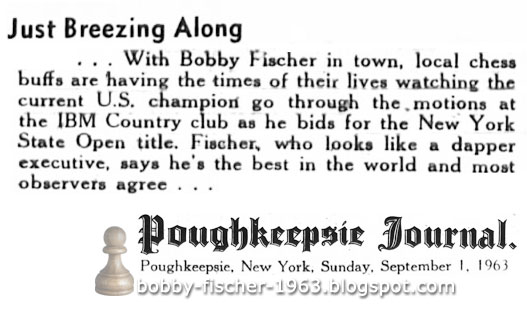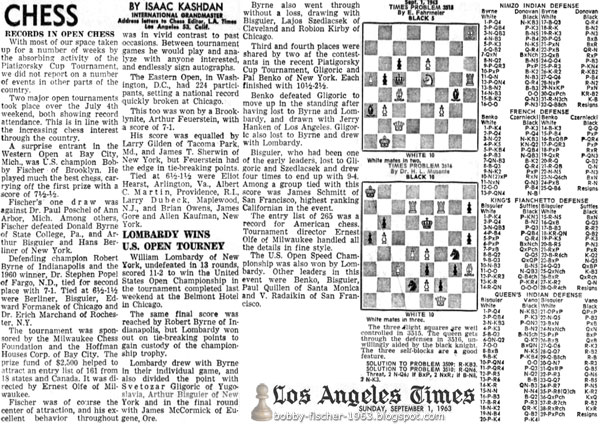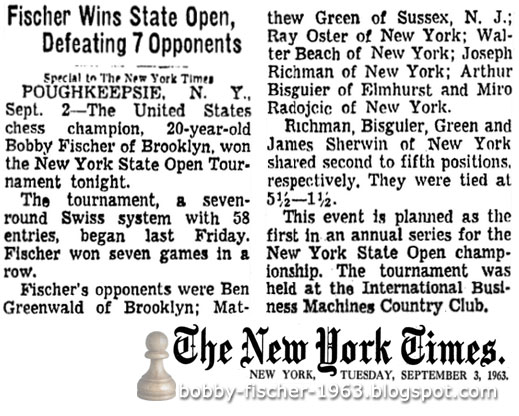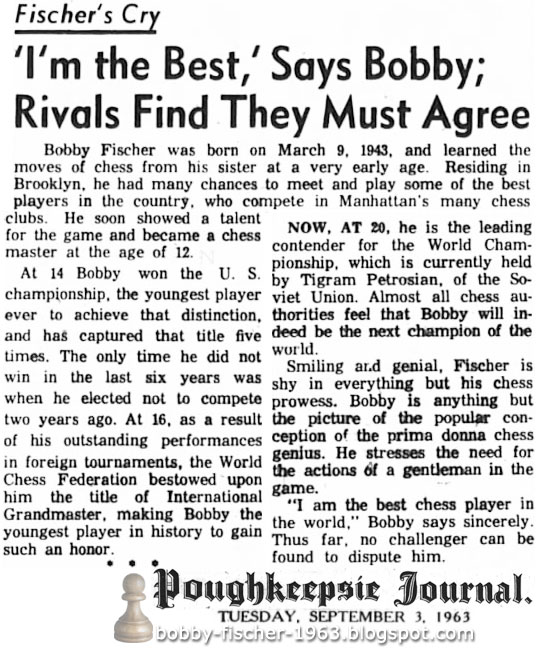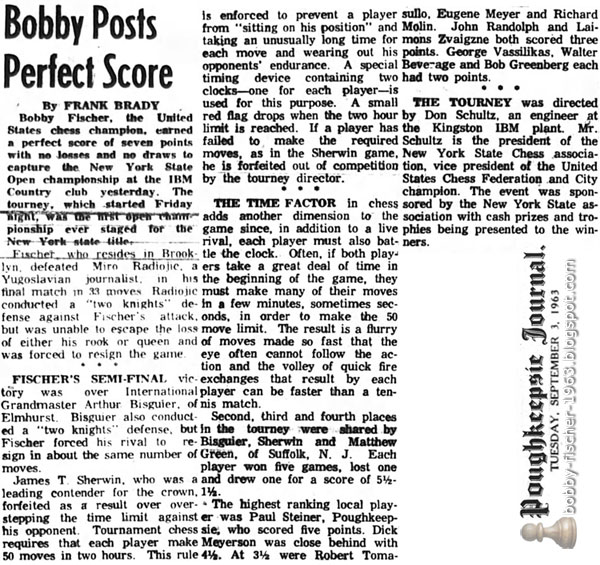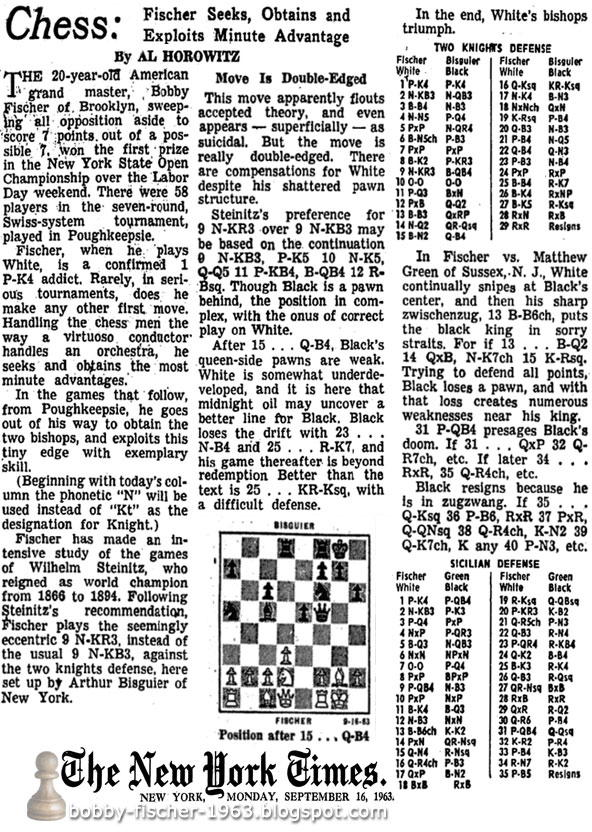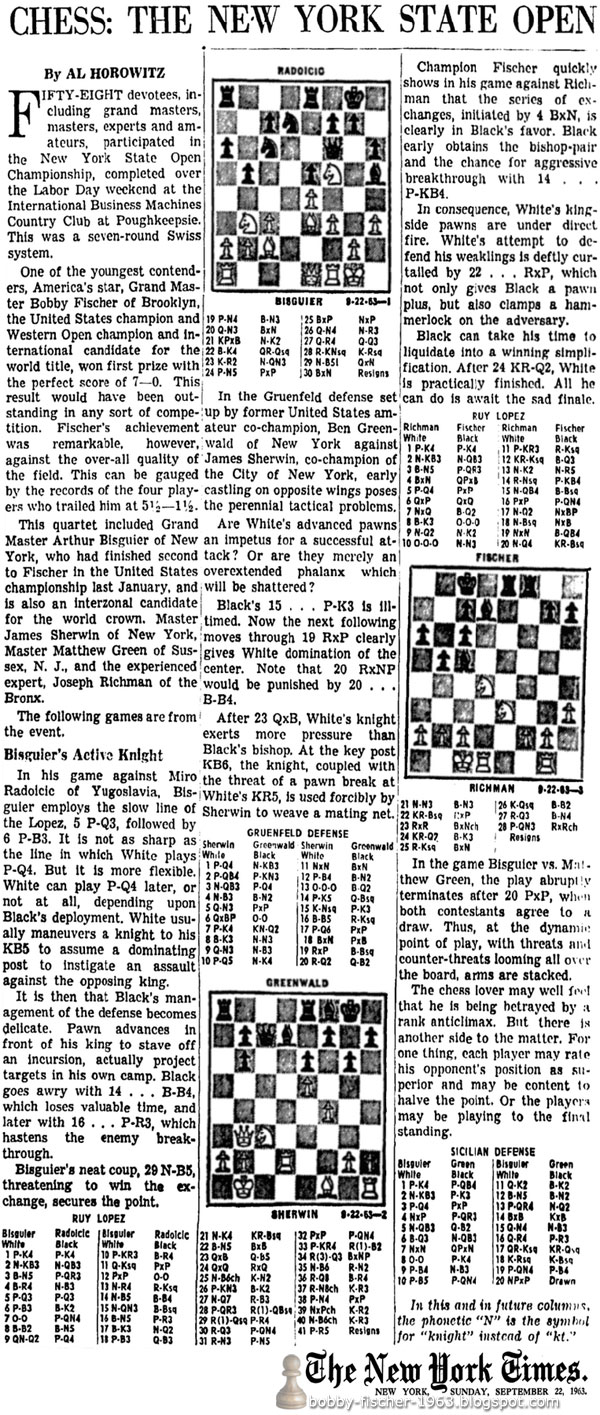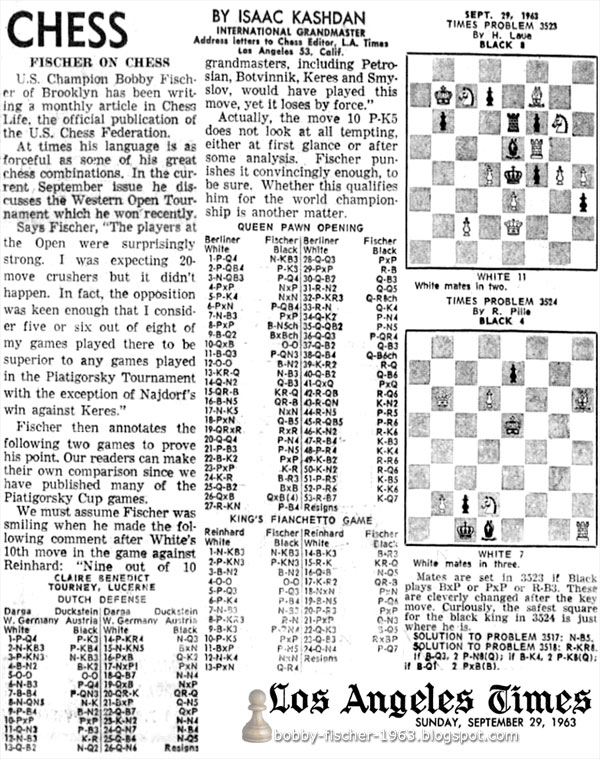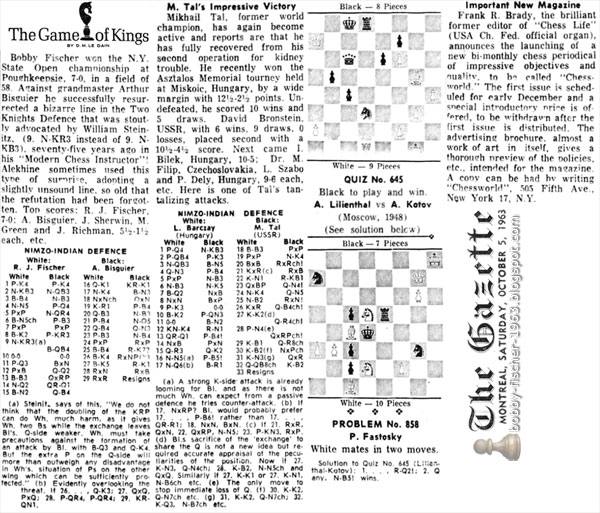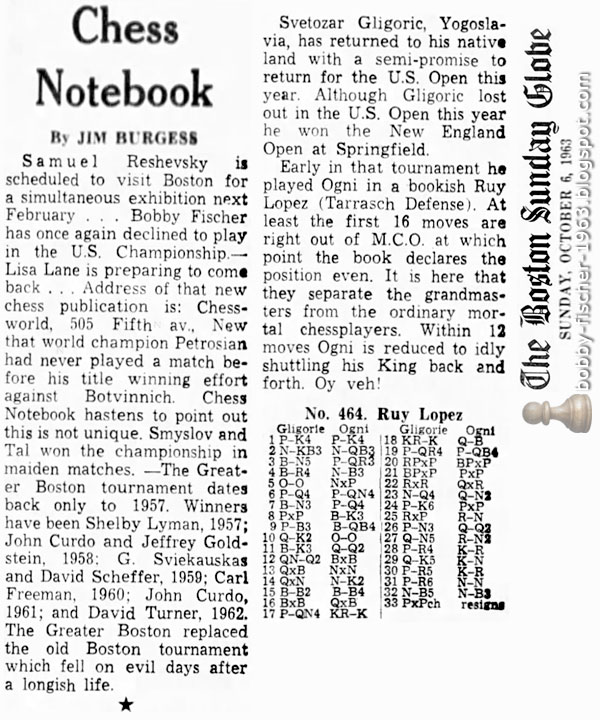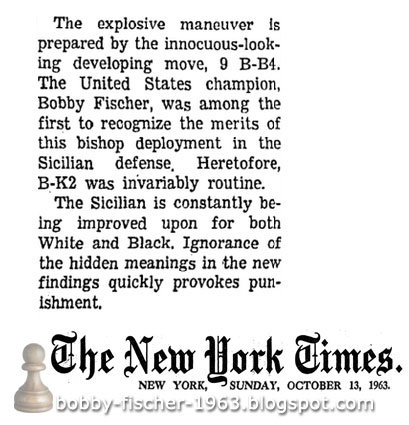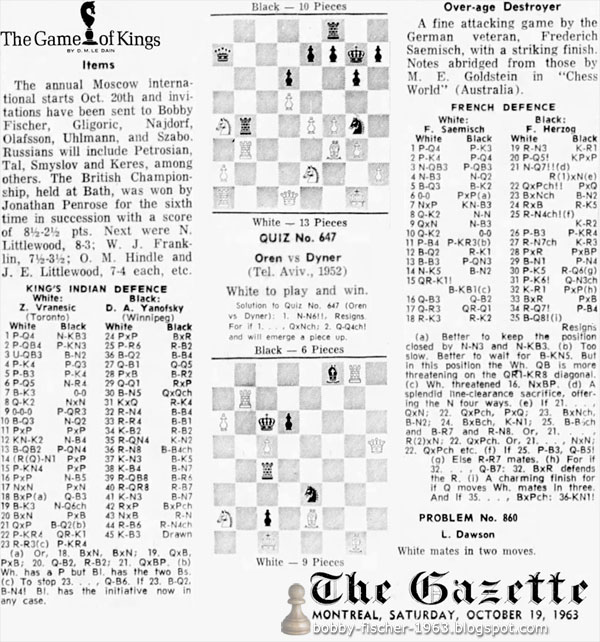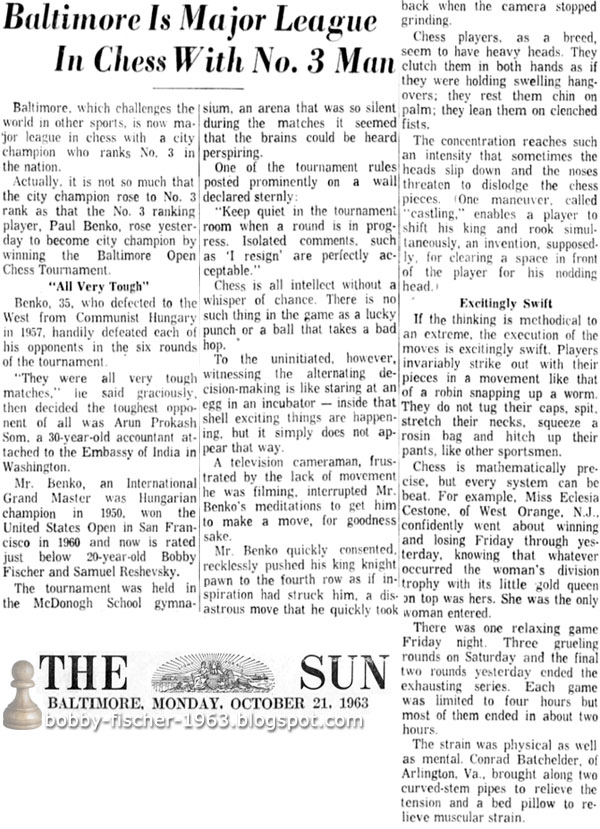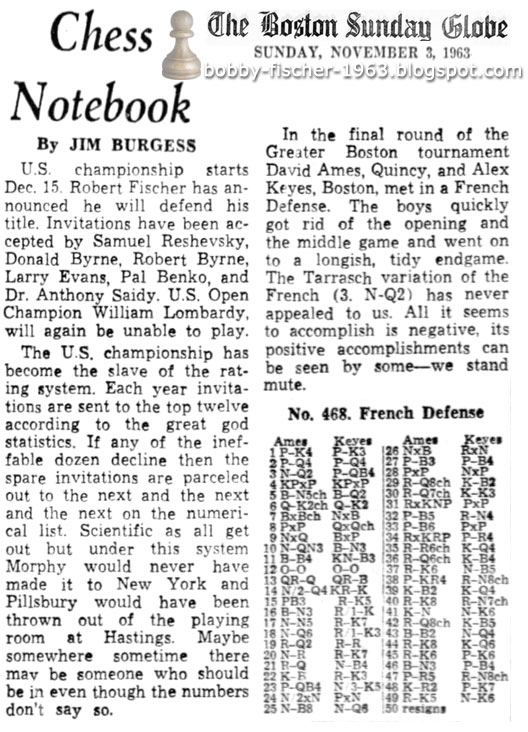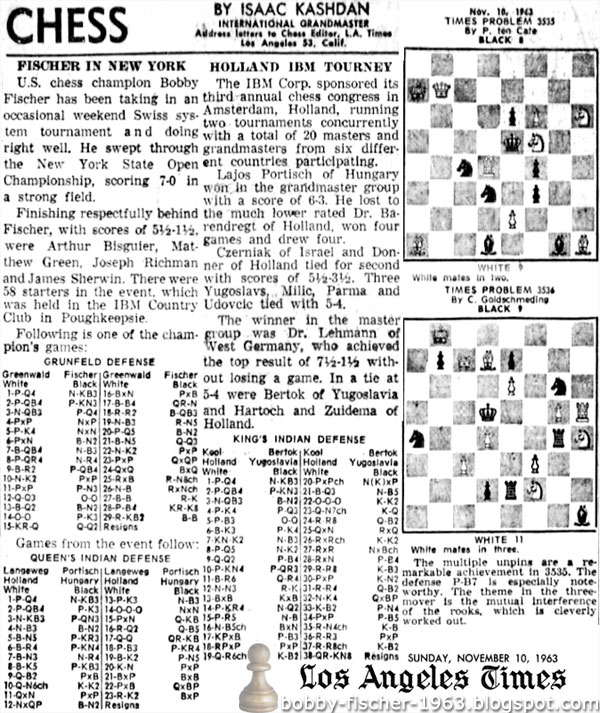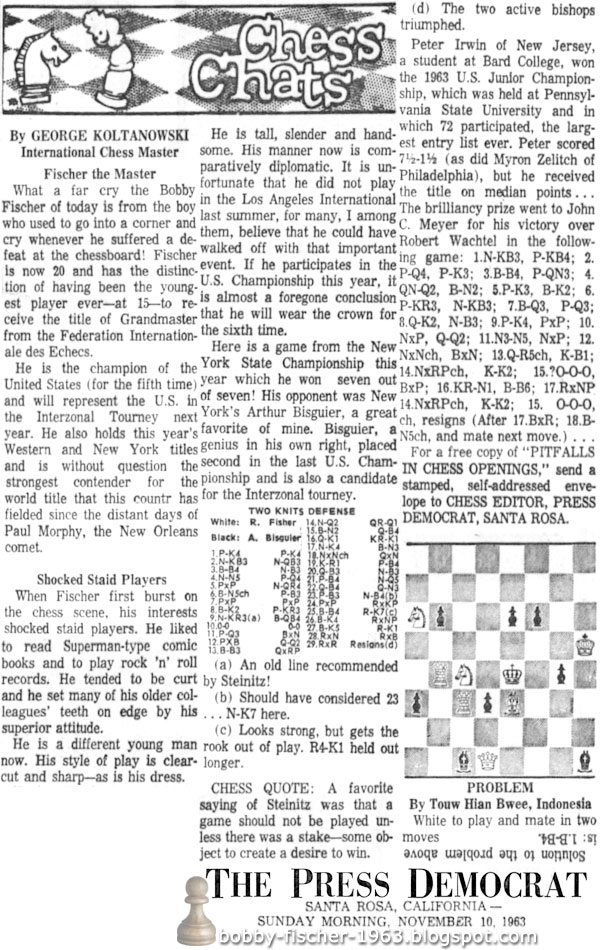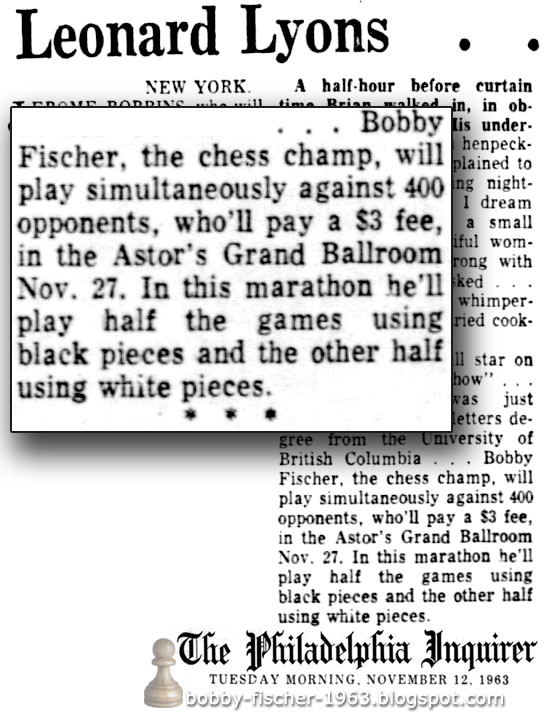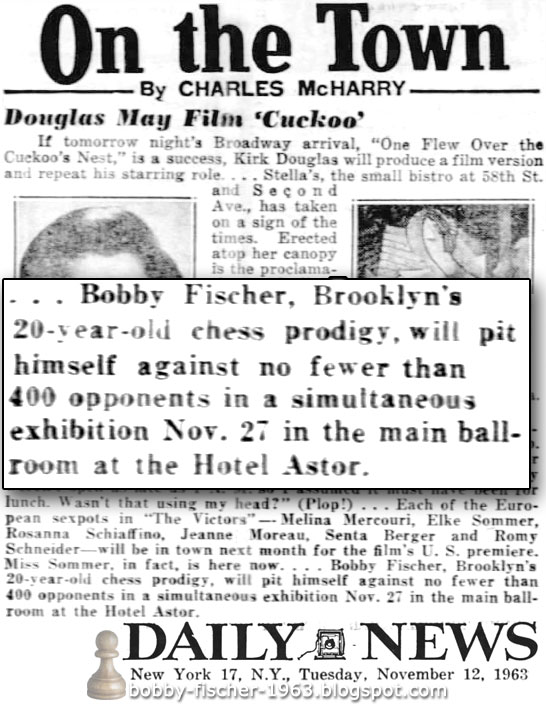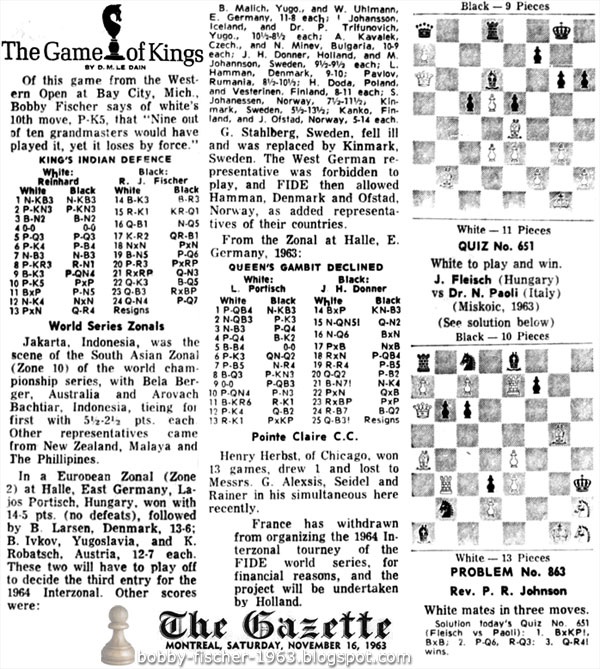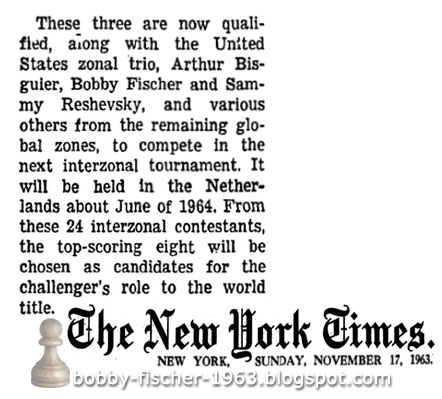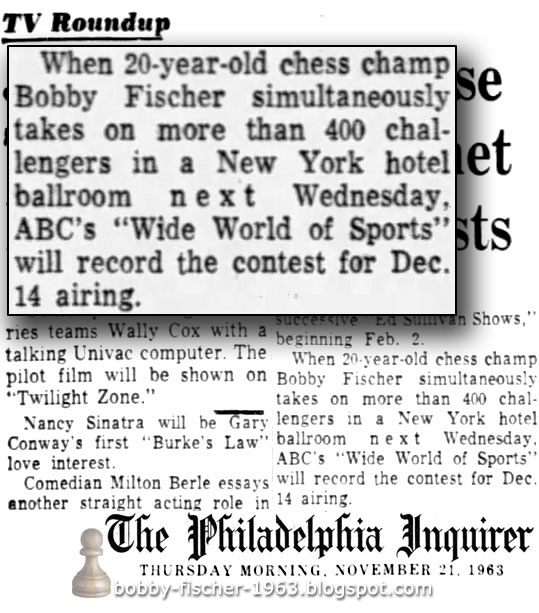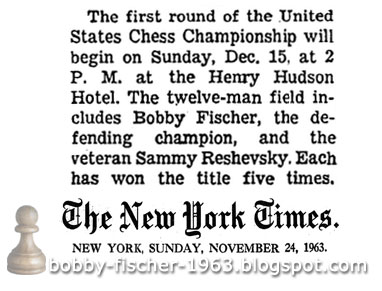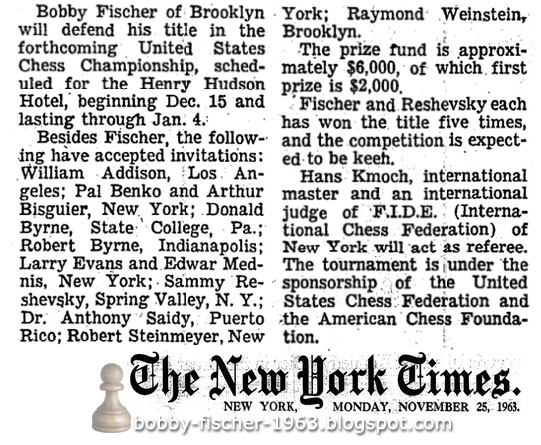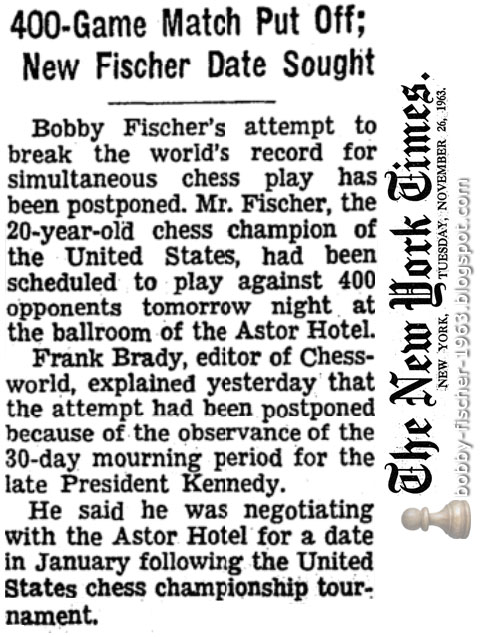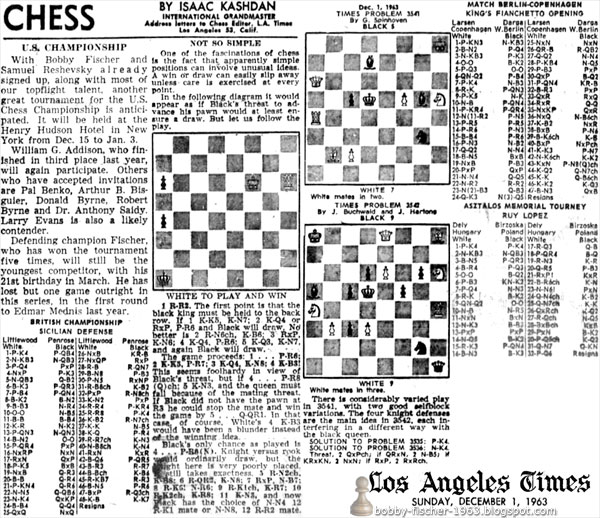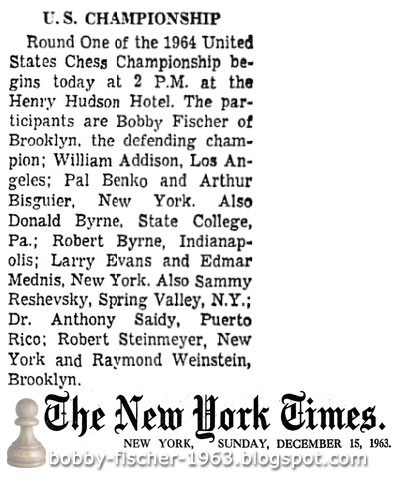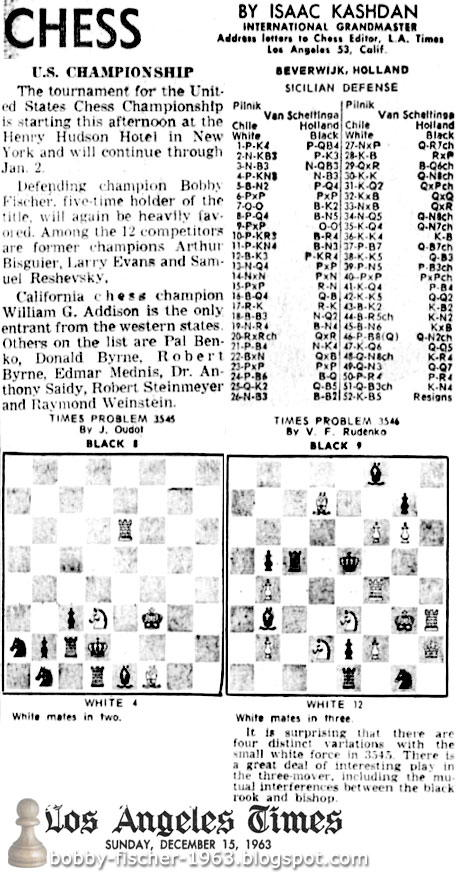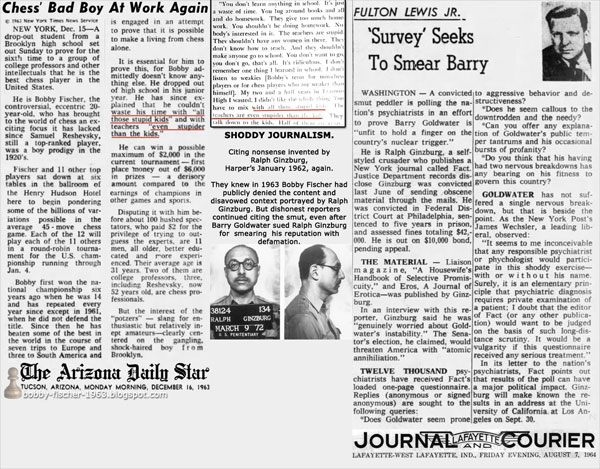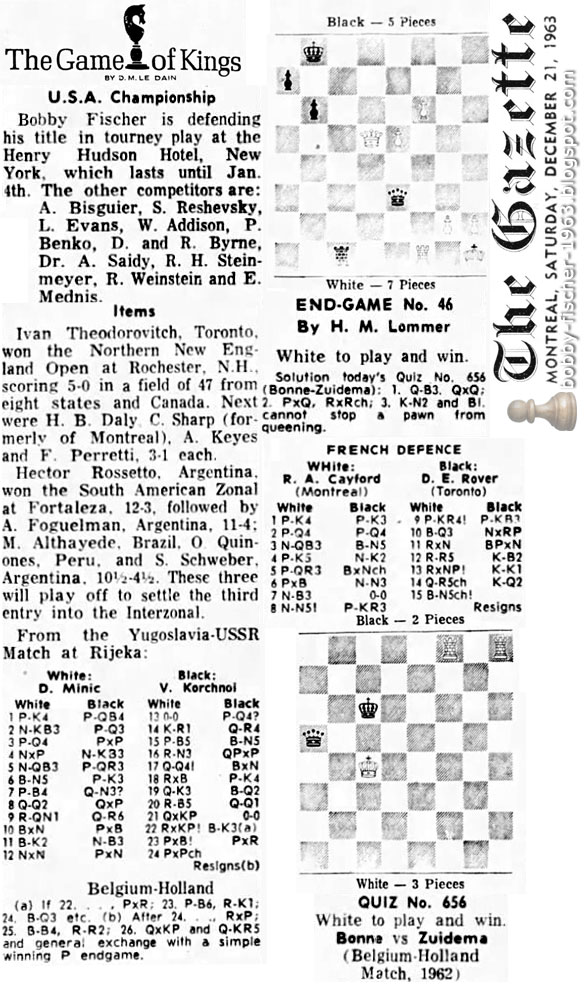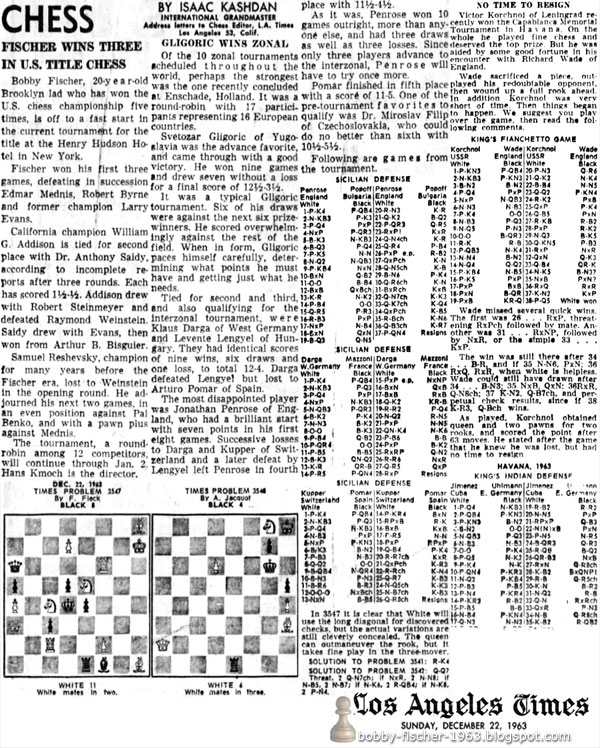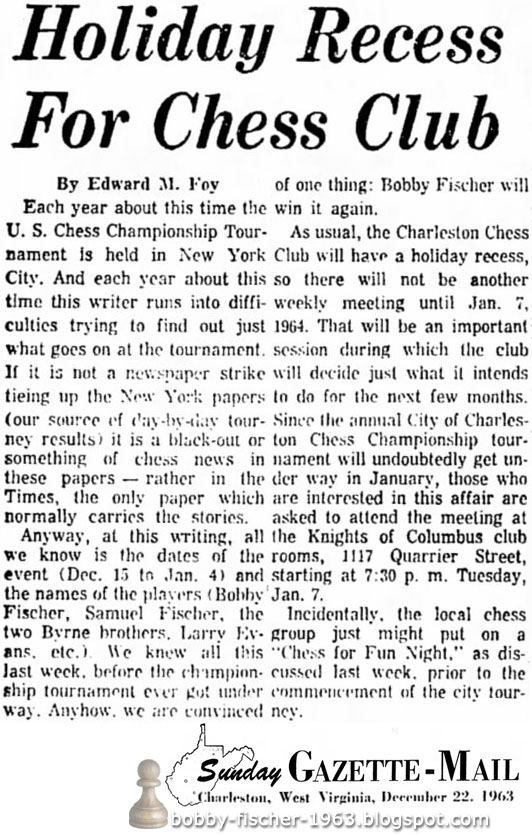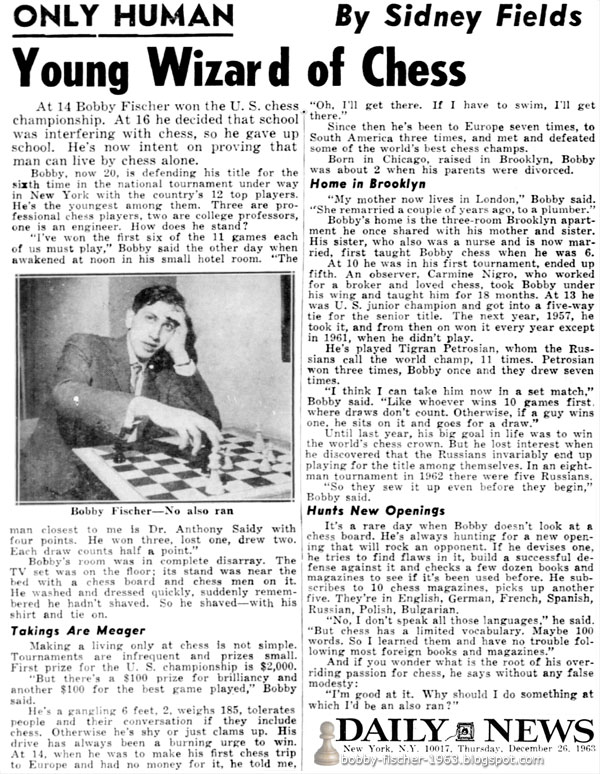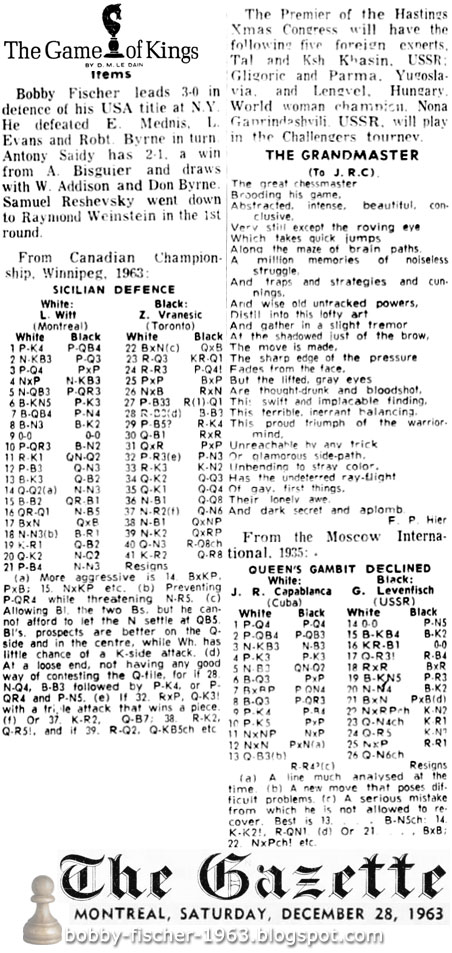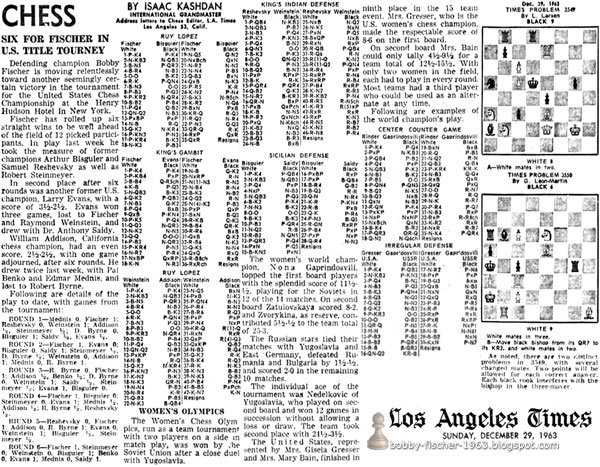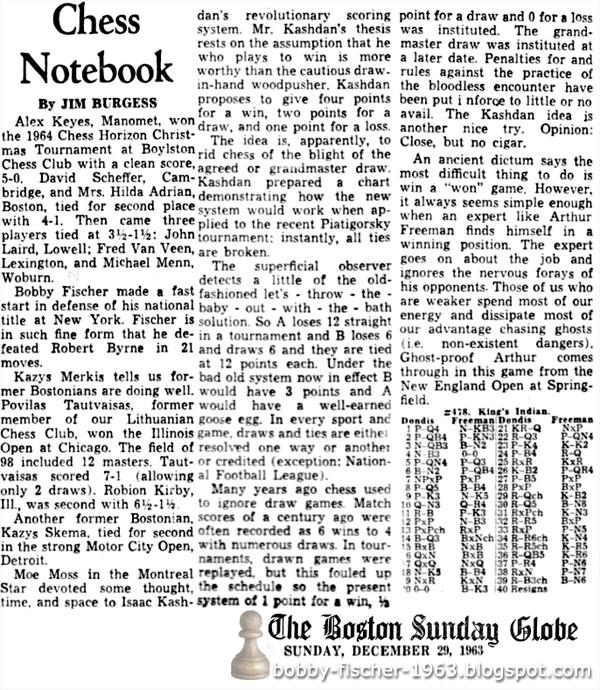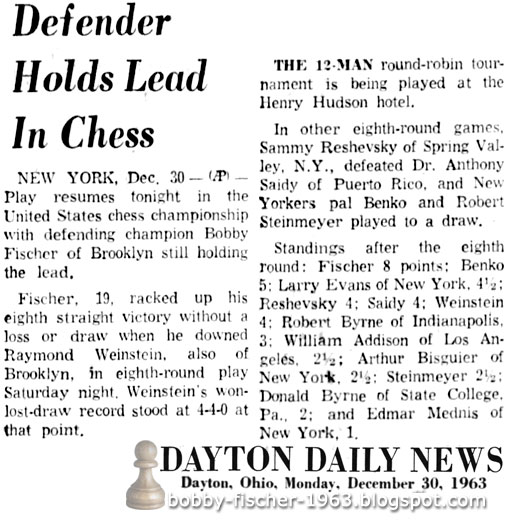The Lincoln Star Lincoln, Nebraska Thursday, January 03, 1963 - Page 24
Bisguier, Fischer In Chess Finals
New York (UPI)—Arthur Bisguier of New York moved into a tie for first place Wednesday with only one day remaining in the American Chess Championship tourney.
Bisguier is now even with top-rated Robert J. Fischer of New York with a score of 7 wins and 3 losses.
Bisguier played to a draw today with Samuel Reshevsky of Spring Valley, N.Y.
Today Fischer and Bisguier are paired off in a match that will see the naming of the U.S. Chess Championship unless there is a draw. The tournament began Dec. 16 at the Henry Hudson Hotel.
New York Times, New York, New York, Friday, January 04, 1963 - Page 14
Fifth U.S. Chess Title Won by Bobby Fischer
New York.
Bobby Fischer of New York won the United States chess championship for the fifth time Thursday night by beating Arthur Bisguier before a crowd of 400 at the Henry Hudson Hotel.
The pairing of Mr. Fischer, who is 19 years old, and Mr. Bisguier was made in the draw before the 12-man round-robing tournament began. And by dramatic coincidence, each entered the deciding game with identical scores, 7-3.
On the basis of form, Mr. Fischer's only advantage was the fact that he held the white pieces. Mr. Bisguier seemed to have overcome even that when, on his 23d move, he erred, permitting Mr. Fischer to reply with a stunning interpolation which led to victory.
Larry Evans, the former champion, has not completed his play in the tournament.
This article also appears in,
- The Akron Beacon Journal Akron, Ohio Friday, January 04, 1963 - Page 2 “Fischer Again Chess Champ”
- Battle Creek Enquirer Battle Creek, Michigan Friday, January 04, 1963 - Page 14 “Fifth U.S. Chess Crown to Fischer”
- Traverse City Record-Eagle Traverse City, Michigan Friday, January 04, 1963 - Page 12 “Chess Champ”
- Press and Sun-Bulletin Binghamton, New York Friday, January 04, 1963 - Page 14 “Fischer Chess Champion Again”
Oakland Tribune Oakland, California Friday, January 04, 1963 - Page 19
Fischer Wins Fifth U.S. Chess Championship
New York—(UPI)—Bobby Fischer today reigns as U.S. chess champion for the fifth time in his career.
The young New Yorker nailed down his fifth title yesterday when he defeated Arthur Bisguier in the final round of the national tournament to wind up with a tourney score of eight wins and three losses.
Bisguier, also from New York, was tied with Fischer going into yesterday's all-decisive game. He finished second in the tourney with a 7-4 score.
Both men now are eligible for next year's interzonal tournament to select the U.S. representative in the world chess tourney.
Fischer was the top-seeded player when the tournament began Dec. 16. However, he trailed during the early stages, but managed to come through with a strong finish.
The tournament, played at the Henry Hudson Hotel, was sponsored by the U.S. Chess Federation and the American Chess Foundation.
Chicago Tribune Chicago, Illinois Friday, January 04, 1963 - Page 26
Fischer Wins Fifth U.S. Chess Crown
New York, Jan. 3 (UPI)—Robert Fischer of New York tonight won his fifth United States chess championship. Fischer, in the final day of the tournament, beat Arthur Bisguier of New York to complete the tourney with a score of eight victories and three losses. Bisguier, who was tied with Fischer after yesterday's round, took second place with a 7-4 score.
Nashua Telegraph Nashua, New Hampshire Friday, January 04, 1963 - Page 7
New Yorker Wins Chess Match
New York (AP)—The U.S. chess championship was won early today by Robert Fischer, a New York man who previously had won the title at the age of 14 and held it four consecutive years.
Fischer regained the title by defeating top contender Arthur Bisguier of New York in the tourney sponsored by the U.S. chess federation.
Both players had won 7 of 10 tourney games when they started their final match.
Detroit Free Press Detroit, Michigan Saturday, January 05, 1963 - Page 7
FOR THE FIFTH time in his career, Bobby Fischer is the United States chess champion. The young New Yorker won in the final round of the national tournament held in New York's Henry Hudson Hotel. He defeated Arthur Bisguier, also of New York.
New York Times, New York, New York, Saturday, January 05, 1963 - Page 14
Chess: Bizarre Defense Keeps The Kibitzers Awake
In the fourth round of the United States Chess Championship at the Henry Hudson Hotel, a spine-tingling draw between the champion, Larry Evans, and Bobby Fischer kept the kibitzers awake hours after the game was finished analyzing the fantastic aspects of this bizarre Gruenfeld defense.
At Black's 19th turn, a dozen weird tactical possibilities were there. The most dangerous for White would have been 19 … Q-B3 (instead of 19 … QxQ).
After the game, Manhattan Club expert Bernard Zuckerman, whose reputation for an exhaustive knowledge of the openings is well known, pointed this out to Fischer and asked him if he had not considered it.
Fischer said he had, but that it was insufficient after 20 Kt-K2, Q-B6, 21 Kt-Kt3, B-R3 22 B-B5. At this writing no clear-cut winning continuation for Black has come to hand and it seems that White should maintain the piece.
As the game was actually played, Fischer erred with 22 … B-Kt5, allowing White to win a pawn by 23 B-Q4. Because of the awkward position of the white king, however, the pawn plus was only sufficient to divide the point.
Hans Berliner versus Edmar Mednis from the same round was a tricky and convincing performance by Berliner. His 19 P-KB5 was a sharp thrust at Black's pawn skeleton, combining a trap. Black snapped at the bait with 19 … BxKt, no doubt overlooking White's reply 20 R-Q5. So, instead of winning a piece, Black had exchanged his defending bishop for an inactive knight. Then White's offer of a pawn, which could not be refused, 24 P-B6ch, quickly settled the issue.
The Los Angeles Times Los Angeles, California Sunday, January 06, 1963 - Page 91
Bisguier, Fischer Meet For U.S. Title
With one round remaining in the tournament for the U.S. Chess Championship, Arthur B. Bisguier, who has held the lead most of the way, is still the man to beat. He has won four games and drawn six for a score of 7-3.
The man who has the opportunity to beat Bisguier, and who in fact must defeat him in order to gain the title, is the brilliant but lately erratic genius from Brooklyn, Bobby Fischer.
Fischer started with a loss to much lower-rated Edmar Mednis. He did not falter again but moved up steadily, aided by a victory over his former chief rival, Samuel Reshevsky.
Fischer's score at the moment is 6-3, with an adjourned game against Robert Steinmeyer. Fischer has an advantage and is considered likely to score the point. Thus his final round pairing with Bisguier will be the decisive encounter.
Another dramatic final round game will bring together California champion William G. Addison of Los Angeles and defending U.S. champion Larry Evans of New York. They are tied for third place with scores of 5½-3½.
The exact standing is somewhat uncertain, as each player has an unfinished game, Addison with Nicholas Rossolimo, and Evans with Reshevsky.
Addison already has achieved considerable success, in his first major tournament outside of California. He has won four games, drawn three and lost only to the two leaders, Bisguier and Fischer.
The only other player with a plus score is Robert Byrne, who has one win and nine draws totaling 5½-4½. Reshevsky, with adjourned games against Evans and Hans Berliner, has 4-4.
Other scores at this stage are: Pal Benko, 4½-5½; Berliner, 4-5; Steinmeyer, 3½-4½; Mednis, 3½-5½; Rossolimo, 3-5, and James Sherwin, 2-7.
Following are details of last week's play, and games from the tournament.
The Guardian London, Greater London, England Monday, January 07, 1963 - Page 10
Hastings—a chess “queen” in decline
“Every year, the Russians send us the cream of their grandmasters. The interest of their presence would be greatly enhanced if Bobby Fischer or another United States grandmaster were among their opponents.”
Courier-Post Camden, New Jersey Wednesday, January 09, 1963 - Page 34
Boy Genius Champion 5th Time in 6 Years
At the age of 19, Bobby Fischer has become U.S. chess champion for the fifth time in six years.
The young genius was top-seeded player when the national tournament began in New York Dec. 16 but suffered an unexpected setback in the first round when he lost to Edgar Mednis in trying to convert a drawn game into a victory. From there on he went through the tourney without a loss, defeating Berliner, Reshevsky, Addison, Steinmeyer, Sherwin and Bisguier. He drew with Rossolimo, Evans, Benko and Byrne.
Going into the final round Bisguier, a former champion, was tied with Fischer. He wound up in second place with a score of 7-4 compared with Bobby's 8-3. Bisguier won from Mednis, Addison, Rossolimo, and Sherwin while drawing with Benko, Steinmeyer, Berliner, Evans, Byrne and Reshevsky. He lost only to Fischer.
The surprise of the tournament was William G. Addison, a Californian who has been making a fine showing on the West Coast and wound up giving former champion Larry Evans a battle for third place.
This must have been Samuel Reshevsky's worst tournament ever, and showed that he is either definitely over the hill or was suffering badly from lack of tournament competition recently. He finished in the middle of the pack, which is not where he has been accustomed to finish. His game against Fischer, their first encounter since the abrupt ending of their acrimonious match, was a bitter, hard-fought game on both sides with Bobby gaining an advantage after 30 moves or so, missing a quick win at the 41st move, but finally forcing his opponent to resign after 54 moves. The outcome of this game was less surprising, say, that Reshevsky's loss to Addison in the first round. The score of the Fischer-Reshevsky game is appended hereto.
World champion Mikhail Botvinnik will defend his title against Tigran Petrosian in a 24 game match at Moscow starting March 23. The schedule calls for three games a week.
New York Times, New York, New York, Saturday, January 12, 1963 - Page 14
Chess: Final U.S. Title Game Classic of Chess Suicide
New York.
The last-round game that Bobby Fischer won from Arthur Bisguier in the United States Championship at the Henry Hudson Hotel clinched the title for the young international star. It was also a classic example of chess suicide on Bisguier's part.
To appreciate the state of mind of the two leaders as they faced each other for the decision, a resume of the trend of the preceding rounds highlights the picture. Fischer, after losing a 73-move game in the first round, forged steadily ahead and entered the final round with a 7-3 score.
Bisguier, too, entering the last round, had achieved the same score. His round-by-round journey had been almost the reversal of Fischer's. Off to a flying start, Bisguier was two points ahead of the field after the first six rounds. Then some indifferent draws against weaker opponents whittled away his lead. Entering the semi-final round, Bisguier was still half-a-point ahead.
Quickly, Fischer won his tenth-round game. But Bisguier, facing the veteran Sammy Reshevsky, was in great danger of losing at adjournment time. After more than 20 hours of day and night analysis, he found ways to draw and salvage the precious half-point.
Against Bisguier, Fischer essayed the aggressive Ruy Lopez. Bisguier resorted to the little-used Berlin Defense. After surmounting all the opening difficulties, and with a better pawn skeleton, Bisguier, as he admitted afterward, overlooked a shattering interpolation by his opponent, 24 Kt-B5. This gave Fischer a poisonous hold on the position that he never relinquished until Bisguier resigned.
The Gazette Montreal, Quebec, Canada Saturday, January 12, 1963 - Page 27
Fischer in Garrison Finish
Bobby Fischer won the U.S.A. Closed Championship at New York but only after an uphill fight. He lost to Edmar Mednis early on but managed to catch up to leader Arthur Bisguier at the semi-final. He won six games, including a victory over Samuel Reshevsky, and drew four others. This is his fifth win of the title.
The Los Angeles Times, Los Angeles, California, Sunday, January 13, 1963 - Page 70
Fischer Again Tops U.S. Championship
Bobby Fischer of Brooklyn, who will reach his 20th birthday in March, won the U.S. Chess Championship for the fifth time in the tournament completed last weekend at the Henry Hudson Hotel in New York.
In the final round Fischer was matched with former champion Arthur B. Bisguier of New York, who had set the pace throughout and was still undefeated. They were tied with scores of 7-3, out of reach of any of the other competitors.
Fischer opened with the Ruy Lopez, to which Bisguier replied with an old-time defense not considered quite adequate. The game drifted into an end-game with Fischer moving forward at every opportunity. Bisguier weakened just before adjournment, gave up a piece, then resigned after 37 moves.
Fischer had to come back after a loss in the first round and a draw in the second. He had a plus score for the first time after the fifth round when he defeated another former titleholder, Samuel Reshevsky of Spring Valley, N.Y.
In addition to the title, Fischer picked up the first cash prize of $2,000 and will have custody of the Lessing J. Rosenwald Trophy. He and Bisguier have qualified for the next Interzonal Tournament.
The third place in the Interzonal must be determined by a playoff among Addison, Evans and Reshevsky. As it happens, all three will be in Los Angeles this month. The playoff series may take place at the Herman Steiner Chess Club, according to club president Mrs. Jacqueline Piatigorsky.
Following are the details of the closing round and games from the tournament. A full cross table appears below.
Fort Lauderdale News Fort Lauderdale, Florida Sunday, January 13, 1963 - Page 30
The U.S. chess championship was won last week by Bobby Fischer. He defeated Arthur Bisguier of New York in the tourney sponsored by the U.S. chess federation.
Here are the results of the Fischer-Bisguier game:
Daily Press Newport News, Virginia Sunday, January 13, 1963 - Page 9
Belated report. Bobby Fischer, 19, regained the U.S. Championship in the recent New York invitational tournament. The whiz kid did not defend the title last year, when Larry Evans won the crown.
The Guardian London, Greater London, England Thursday, January 17, 1963 - Page 10
Bobby's Comeback
Though chess masters are steadily getting younger, it is still quite an achievement to make your comeback at the age of 19. After his disappointing play in the Candidates' tournament and in the world team championship, the young American genius Bobby Fischer has taken the first step in a new attempt on the world title. He has just regained the United States championship in New York with 8 out of 11, in spite of losing to Mednis in the first round. Other leading scores were Bisguier 7; Addison, Evans and Reshevsky 6½. This championship was an international zonal eliminator, and the top three qualify for the interzonal. Those definitely out include Benko and R. Byrne.
The Fischer-Reshevsky game was their first meeting since the match which ended in an unsettled law suit. A remarkable feature is Fischer's renewed success with his pet move 6 P-KR3, which among great masters he alone champions. Otherwise the game is characteristic Fischer, with a logical and direct attack on Black's pawn weaknesses on both wings and on the white squares.
New York Times, New York, New York, Saturday, January 19, 1963 - Page 14
Chess: Victory Keeps Reshevsky In The International Picture
At the start of the final round of the United States chess championship tournament recently completed at the Henry Hudson Hotel, the veteran Samuel Reshevsky was in danger of slipping entirely out of the international chess picture.
The leaders, Arthur Bisguier and Bobby Fischer, between them, were already assured of at least first place and a tie for second. Consequently, by the rules of the International Chess Federation they were automatically seeded into the next Interzonal tournament. The third seeded American player would be winner of third place.
Entering the final round against Pal Benko, Reshevsky had the indifferent score of 5½-4½, half a point behind William Addison, California champion, and Larry Evans, then United States champion, who were tied at 6-4. For Reshevsky to be included in the chance for third place, he had to win his final game, while Addison and Evans had to draw theirs. This is exactly what happened.
The historically significant game between Reshevsky and Benko is a bizarre melee of eight minor pieces, minus queens and rooks. With a pawn plus, Reshevsky's dogged perseverance finally overcame Benko's obstinate defense. Note the queer position of the four knight after White's 21 KtxP.
Fischer versus Reshevsky from the same event is a rare example of Weaver Adam's variation of the Sicilian defense, initiated by 6 P-KR3. Strategically, Reshevsky's opening play was sufficient. Tactically, however, he permitted White open lines for his rooks, which ultimately penetrated all enemy weak points in the end game.
Note that Black had to accelerate White's superiority by exchanging queens with 19…QxQ 20 RxQ, since 19 …QxP fails because of 20 QxKtP, 0-0 21 PxP, etc.
Time pressure, no doubt, caused Fischer to overlook an earlier win with 41 K-Bsq, which leads to mate or win of a piece.
The Los Angeles Times Los Angeles, California Sunday, January 20, 1963 - Page 85
Playoff Here For Interzonal Place
An interesting series of match games will be played here next month in order to resolve a tie among William Addison, Larry Evans and Samuel Reshevsky in the recently completed U.S. Championship Tournament.
One of the three will be entitled to a place in the Interzonal Tournament, in which winners of various zonal events will compete as a step towards the world championship title. Bobby Fischer and Arthur Bisguier have already qualified for the interzonal.
A double round-robin for a total of six games has been arranged at the Herman Steiner Chess Club, 8801 Cashio St. California champion Addison will have his share of rooters in the strife against former U.S. titleholders Evans and Reshevsky, both of New York.
KEY GAMES FOR FISCHER
When it was all over it seemed like a fairly easy victory for Bobby Fischer in his fifth straight success in the U.S. Chess Championship Tournament. There were three key games that marked the transition points.
At the outset Fischer lost to Edmar Mednis, going wrong when he offered a pawn in the endgame. Mednis held on to the material and scored by clever tactics.
Fischer recovered by a series of victories starting with an important point against Samuel Reshevsky. Fischer had a slight edge early and found opportunities in the rook ending.
In the final round game Fischer and Bisguier met with even scores for the vital decision. The critical moment came on Bisguier's 23rd turn, when he missed a sharp maneuver allowing Fischer to advance his knight to a commanding post. That was all the champion needed.
The Boston Globe Boston, Massachusetts Sunday, January 20, 1963 - Page 50
“Larry Evans made one of his infrequent visits to Boston on Jan. 6. He appeared at the Checkmate Chess Club and with the aid of a demonstration board, discussed at length his game with Bobby Fischer played in the 1962-63 U.S. championship tournament. The game was a draw, the uniform result for all Evans-Fischer meetings.”
New York Times, New York, New York, Saturday, January 26, 1963 - Page 8
Chess: Robert Byrne Provides Some Rough Competition
Grand Master Robert Byrne of Indianapolis is a tough, experienced competitor, especially in a strong field.
In the recent United States championship in New York, Byrne won his first-round game from Nicholas Rossolimo, then drew his next 10 games, finishing with a score of 6-5. He was the only player in the lineup not to lose a single game outright. None of his draws was of the timid, “grand master” variety.
His games below against Bobby Fischer, the tournament winner, and against runner-up Arthur Bisguier are fought along tactical lines. They are so evenly balanced, one slight misstep in either game would have been instantly disastrous.
Byrne versus Fischer features a “bolt-from-the-blue” offer of a piece by Black with 13 … Q-R4. This stroke, however, is softened by White with 15 BxB.
Despite Byrnes alertness Fischer ingenuity almost culminates in victory. Byrne is saved from loss by managing a quick march of his monarch to the rescue. An exciting game with honors equally shared.
The Los Angeles Times Los Angeles, California Sunday, February 03, 1963 - Page 72
Interzonal Playoffs
The play-off series to decide a place in the forthcoming Interzonal Tournament will start at 6:30 p.m. Friday at the Herman Steiner Chess Club, 8801 Cashio St., when California champion William Addison will oppose former U.S. champion Larry Evans.
The third entry in this special competition is Samuel Reshevsky, also a former U.S. titleholder. He will play Evans starting at 1 p.m. Sunday, Feb. 10.
Each player will face the others, twice, making a total of six games. Others scheduled are: Reshevsky vs. Addison, Feb. 12 and 19; Evans vs. Addison, Feb. 22, and Reshevsky vs. Evans, Feb. 24.
The charge for spectators will be $1 for each game, or $5 for the series. Your editor will be the referee, assisted by Harry Borochow and Jack Moskowitz.
The playoff was necessitated by a tie for third in the recent U.S. championship tournament, which was won by Bobby Fischer, with Arthur Bisguier second. The United States is entitled to three places in the Interzonal Tournament, next in the sequence of events to determine a challenger for the world chess championship.
The Courier-Journal Louisville, Kentucky Sunday, February 10, 1963 - Page 40
Louisville Boy Of 13 Called Chess Genius
“…some of those who have seen him play, including Edgar Morrison, feel he has a chance of achieving his ambition to be another Bobby Fischer. (Fisch became the youngest American champion in history at the age of 14, and today at 20, is recognized as one of the world's strongest players.)”
New York Times, New York, New York, Saturday, March 02, 1963 - Page 14
Chess: Chance for World Title Hinged on This Game
“This was no run-of-the-mill-game in which a win or loss would only mean a point up or down in another tournament. Here a chance for the world title was at stake. Bobby Fischer and Arthur Bisguier had already qualified from the United States zone to play in the next interzonal. The third spot was reserved for one of the three, Addison, Larry Evans of New York or Reshevsky, who had tied for third place in the recent United States championship.”
The Los Angeles Times Los Angeles, California Sunday, March 03, 1963 - Page 71
Final Playoff Games
The two final games in the interzonal playoff series, in which California champion William Addison opposed former U.S. champions Larry Evans and Samuel Reshevsky, were both drawn.
As a result Reshevsky was the indisputable winner, scoring two wins and two draws for a final tally of 3-1. Addison and Evans tied 1½-2½, each having lost once to Reshevsky and drawn their other games.
Reshevsky won the right to represent the United States in the next Interzonal Tournament, along with Bobby Fischer and Arthur Bisguier, the top prize winners in the recent U.S. championship tournament.
The playoff series was sponsored by the Piatgorsky Foundation and took place at the Herman Steiner Chess Club, 8801 Cashio St. Your editor was the tournament director, assisted by Harry Borochow and Jack Moskwitz.
Following are the final games:
This article also appears in,
- The Ottawa Citizen Ottawa, Ontario, Canada Saturday, March 09, 1963 - Page 67 “Chess For Fun”
- El Paso Times El Paso, Texas Sunday, September 08, 1963 - Page 63 “Chats on Chess”
- The Corpus Christi Caller-Times Corpus Christi, Texas Sunday, September 15, 1963 - Page 53 “Chats on Chess”
- El Paso Times El Paso, Texas Sunday, March 15, 1964 - Page 75 “Chats on Chess”
Arizona Republic Phoenix, Arizona Sunday, March 03, 1963 - Page 83
It's Fun to Play Chess
Here is the first game finished at the 1962 Chess Olympics at Varna, Bulgaria. Fischer vs. I. Purevzhav, Mongolia.
This article also appears in,
- The Press Democrat Santa Rosa, California Sunday, March 10, 1963 - Page 27 “Chess Chats”
- The Ottawa Citizen Ottawa, Ontario, Canada Saturday, March 16, 1963 - Page 67 “Chess for Fun”
- El Paso Times El Paso, Texas Sunday, April 07, 1963 - Page 71 “Chats on Chess”
- The Corpus Christi Caller-Times Corpus Christi, Texas Sunday, April 07, 1963 - Page 11 “Chats on Chess”
Arizona Republic Phoenix, Arizona Sunday, March 10, 1963 - Page 31
Robert Fischer of Brooklyn has won the U.S. championship five times in the last six years, all the greater a feat when one realizes that Bobby is only 19 years old.
Probably the only reason he did not win the championship the sixth time is that he did not defend his title last year.
Every chess fan in the United States knows that we have a possible world beater in Bobby Fischer. Who knows, one day he may yet win the coveted world title.
But Bobby did not have an easy time of it this year. Arthur Bisguier of New York was in the lead up to the ninth round and tied with Bobby in the 10th. The deciding battle was played in the 11th and final round between the two leaders.
Fischer, with the white pieces, exchanged queens early in the game, and it looked like an easy draw when, on the 23rd move, Bisguier blundered, permitting some forceful play by his young opponent. Bisguier had to resign on the 37th move.
Both are now eligible for next year's interzonal tournament.
Here is the deciding game:
—
Right in the first round of the U.S. Championship top favorites bit the dust: Fischer lost to Mednis, Evans lost to Steynmeyer and Reshevsky lost to Addison…
This article also appears in,
- The Ottawa Journal Ottawa, Ontario, Canada Saturday, March 16, 1963 - Page 24 “Russian Girl Challenges America's Bobby Fischer”
The Gazette Montreal, Quebec, Canada Thursday, March 14, 1963 - Page 20
Soviet Girl Presents Challenge To Male Players
Bobby Fischer, brilliant, outspoken young American chess player, once said scornfully he could give a knight advantage to any woman player and still beat her.…
[Bobby Fischer denied this slanderous, defamatory remark, as well as other statements attributed to him taken out of context by Ralph Ginzburg.]
The Soviet Union now thinks it has a young lady who could make Fischer eat his words.
[And this lady thinks its high time for Ginzburg to eat his.]
Excerpt on the “Knight-odds” remark from:
Page 158 of A Legend on the Road by John Donaldson (Milford, 2005)
http://www.chesshistory.com/winter/winter129.html#CN_9218
The Gazette Montreal, Quebec, Canada Saturday, March 23, 1963 - Page 28
World Championship
World champion Mikhail Botvinnik and challenger Tigran Petrosian start their grueling 24-game match today at Moscow. The schedule calls for three games per week. In case of a tie the champion retains the title. Their styles are similar, with caution the key-note, and protracted struggles can be anticipated.
The FIDE world team championship at Varna, Bulgaria, last fall is the only serious competition that the champion has engaged in during the year. He should have lost to Bobby Fischer and was soundly outplayed by Uhlmann in the following. Now 51 he will need all his resources to overcome the 33-year old challenger.
Daily Press Newport News, Virginia Sunday, March 31, 1963 - Page 74
Hybrid. Trouble is, chess is not only a sport, it's an art form. And an art form should not make temperament a federal case.
True, America's whiz kid, Bobby Fischer, wouldn't win any popularity contest with his expressed attitude: If one criticizes him, one doesn't know how to play; if one admires him, one is not in a position to know: the chess world consists mostly of patzers and one Bobby Fischer. Little wonder that popularizers react to the inimitable Bobby with mutual indifference. Yet he is an artist of the chessboard, and artists should be recognized as individuals. It is a pity that all the negative appraisals of chess players overlook the art form aspect of chess.
Courier-Post Camden, New Jersey Wednesday, April 03, 1963 - Page 27
Though Bobby Fischer declined an invitation to enter, the eight-man Piatigorsky Cup tournament to be held in Los Angeles this summer will be one of the best held in this country in recent years. It will be a double round robin of international grand masters, with a $10,000 prize fund. Plans are for this to be an annual event.
The eight contestants will be Samuel Reshevsky and Pal Benko of the United States; Paul Keres and Victor Korchnoi of Russia; Svetozar Gligoric of Yugoslavia; Miguel Najdorf and O. Panno of Argentina, and Fridrik Olafsson of Iceland.
The Los Angeles Times Los Angeles, California Sunday, April 07, 1963 - Page 95
Petrosian Wins, To Even Title Series
After trailing for the first four games, Challenger Tigran Petrosian drew even by defeating Michail Botvinnik in the fifth encounter of their match for the world chess championship in Moscow.
Petrosian, with the white pieces, used the English Opening. He obtained a decided advantage in the first session, and though the game was adjourned, it was clear that the champion could not survive.
After Botvinnik won the first game, the next three were all drawn, leaving the score at 2½-2½. A total of 24 games are scheduled. Petrosian must score at least 12½ points to win the championship. A tie match would be sufficient for Botvinnik to retain the title.
In the second game Botvinnik had the initiative from the first few moves. He developed attacking chances on the king side, but could make no headway against Petrosian's accurate defense.
After an exchange of queens, Botvinnik then tried the other wing, once again seeming to obtain an advantage. This too petered out, and a draw was agreed upon after 35 moves.
In the third game the competitors had a real workout. Petrosian, as is usual with him, simplified in the opening, but managed to weaken the champion's center pawns. Petrosian succeeded in winning a pawn, after a bit of laxness on Botvinnik's part.
Then came a long drawn out rook ending, with Botvinnik on the defensive. Time after time it seemed that Petrosian had worked out a winning formation, but Botvinnik always seemed to have a further resource.
The game was finally drawn after 86 moves. Botvinnik has frequently proved that he is unsurpassed in defending games of this character. An example is his game with U.S. champion Bobby Fischer in the Chess Olympics at Varna, in which Botvinnik also drew after being a pawn behind most of the way.
The fourth game was quite restful in comparison. A tactical flurry in the opening seemed to be in Botvinnik's favor, as Petrosian was prevented from castling. But no lasting weakness resulted, and the draw was soon declared.
This is Botvinnik's fifth match in defense of the title, which he won in 1948. Curiously, he has not won any of the previous matches, tying with David Bronstein in 1951 and Vassily Smyslov in 1954.
Botvinnik lost the championship to Smyslov in 1957 and also succumbed to Mikhail Tal in 1960. In both cases, however, Botvinnik came back to win a return match the following year. He has thus been world champion for all but two of the last 15 years.
The Gazette Montreal, Quebec, Canada Saturday, April 13, 1963 - Page 26
The West Starts Winning
The Russians are not invincible. There has been an appreciable change, during the last few years, in the prospects of Western players. First there was Bobby Fischer's spectacular triumph in the FIDE Interzonal at Stockholm. Argentine's Miguel Najdorf followed up by winning at Havana, ahead of Spassky, Polugaevsky and Smyslov. Now we have Dutch grandmaster J. Henk Donner taking top honors in the Silver Jubilee at Beverwijk, Holland, ahead of Bronstein and Auerbakh. Plenty of room for justified optimism in the future. Dutch players also did very well in the subsidiary events. The Ladies event was won by the new world champion, Nona Gaprindasvili, 9-0!, followed by Jovanovic, Yugoslavia, 7½-1½; Nicolau, Rumania, 6½-2½, etc.
Dr. Peter Trifunovic, tired after his American tour, which included two small tourneys, did not win a game. He lost one and drew 16!
The Boston Globe Boston, Massachusetts Sunday, April 21, 1963 - Page 35
There have been relatively few international chess tournaments of note held in this country. New York 1889, Cambridge Springs 1904, New York 1924 and 1927, New York 1948-49, and New York 1951. There have been, of course, many other so-called international tournaments but, in most cases, there were either few men of international stature involved or the foreign contingent was weak. Dallas hosted the last big international event here about five years ago.
In July eight international grandmasters will meet in a double round tournament at the Ambassador Hotel, Los Angeles, for the Piatigorsky Cup.
The players will be Petrosian, Keres, Reshevsky, Benko, Gligoric, Olafsson, Najdorf, and Panno. A sterling lineup of stars. But, where is Bobby Fischer? World champion Botvinnik is on record as saying Gligoric and Fischer are the only two non-Russians who measure up to world champion standards.
Perhaps the answer to the disappearance of Fischer goes back a couple of years to the ill-fated Fischer-Reshevsky match which ended in forfeiture and a welter of claims and counter-claims that did no good and may have worked much harm. Mrs. Piatigorsky, wife of the world famous cellist and sponsor of the coming tournament, was one of the villains of the piece, according to Fischer.
The Russian chess federation offered to send both Botvinnik and Petrosian if only the Piatigorsky Cup tournament could be postponed until September. Postponement was impossible so the sponsors had to settle for Petrosian and Keres with Korchnoi as reserve. Not a bad deal.
Botvinnik is now engaged in a match for his title with Petrosian. The champion has always favored a period of inactivity after a hard match and, perhaps this custom of his is what led to the request for moving the tournament dates. Too, Botvinnik has curtailed all his chess play lately. There was even some doubt he would defend against Petrosian.
The old champion won the first game of the match (see below) but Petrosian at this point leads 4½ to 3½.
This article also appears in,
- The Corpus Christi Caller-Times Corpus Christi, Texas Sunday, October 06, 1963 - Page 17 “Brilliant Queen Sacrifice”
- The Press Democrat Santa Rosa, California Sunday, October 27, 1963 - Page 37 “Chess Chats”
- El Paso Times El Paso, Texas Sunday, November 17, 1963 - Page 133 “Chats On Chess”
- El Paso Times El Paso, Texas Sunday, November 17, 1963 - Page 87 “Chats On Chess”
Arizona Republic Phoenix, Arizona Sunday, April 21, 1963 - Page 33
Brilliant Queen Sacrifice
J. Rejfir, one of the leading Czechoslovakian masters, died recently at the age of 55 in a Prague hospital. Here is one of his last games, played in the Czech championship.
(a) A move adopted by Leonhard about half a century ago. It disappeared completely until about 1930 when the Russian theorist Sosine wrote extensively about B-B4. Now Bobby Fischer has brought it back with a bang. The idea: attack on the diagonal QR2-KN8.
(b)The natural reaction is to barricade the horizon of the White Bishop. Fatal would be 6…P-KN3?: 7.NxN, PxN; 8. P-K5, as Black cannot play 8 … PxP: cause of 9. BxPch. After 6 … B-Q2, followed by P-KN3. White maintains the best attacking chances.
(c) Doesn't care for an eventual NxKP for Black, NxN, P-Q4.
(d) Stops White's immediate P-KB4, as then NxN, QxN, P-Q4 and B-B4 would decide matters.
(e) Wishes to use the open QB file, feeling that the double pawn is not going to affect matters much. The game has taken a positional character, the inconveniences are more or less evened: White has a weak pawn on K4, whereas Black has a weak square on his Q4, and that is why Black cannot permit B-N5 with exchange of the Knight on KB5, followed by N-Q5, where the Knight would stand well.
(f) Well-played! The phase that follows will show the vain effort of White to save the dam.
(g) One breakthrough has been plugged, but the water will flood through on many fronts.
(h) Threatens mate on KR8. If 30. K-B1, R-Q1 wins.
(i) White has no choice. QxR, KxQ; leads to an easy win for Black.
(j) Prepares the entry to an easily won pawn ending. White could have resigned here.
The Guardian London, Greater London, England Monday, April 22, 1963 - Page 3
Botvinnik has to fight after errors
Botvinnik made another strenuous effort to square the match in his twelfth world title game with Petrosian, but he spoiled a fine position by errors in the last few moves before the time control and had to fight for a draw.
Petrosian now leads 6½-5½. The percentage of draws at this stage of the match is unequaled in a world title match since 1921.
According to reports from Moscow, Botvinnik is showing signs of strain. He told the referee that he could not sleep the night before the twelfth game, thus explaining his fifth-hour blunders.
Most grandmasters who were asked by Tass for the forecast of the result are now tipping Petrosian. Keres, for instance, remarked: “At present Petrosian is one point ahead: I think his chances of success are also one point up.” Smyslov and Tal, former opponents of Botvinnik, forecast that the final decision would only come in the last few games, when they expect the struggle to become more tense.
Unimpressed
Tass also asked Bobby Fischer for his views. As usual, the young American champion was unimpressed by anything Russian: “Up to now there have been hardly any interesting games in the match,” Fischer claimed. “I think that Petrosian will win because he is much younger than his opponent.”.
Meanwhile, Petrosian, who originally wanted the match postponed because he claimed the Moscow winter would be too cold, has adopted an original gamesmanship technique by ostentatiously discarding his fur hat, and replacing his dark overcoat with a light summer suit.
The Wisconsin Jewish Chronicle Milwaukee, Wisconsin Friday, April 26, 1963 - Page 2
How Fischer Won
In a later January column, I reported that Bobby Fischer won the United States Chess Championship of 1962-63. Now, however, there is a complete analysis of Bobby's victory in the February issue of Chess Review. It was Bobby's fifth victory in this important championship and it is worth reporting in greater detail.
In all, Fischer won six games, drew four and lost one, his very first game against Edmar Mednis. He won from Sammy Reshevsky, from Addison, Steinmeyer, Sherwin, Berliner, and Bisguier. He drew with Benko, Byrne, Rossolimo and Evans. In the final round, he and Bisguier were tied for first. Not too much — except pride — was involved in this last game, because on the basis of their performances, both Fischer and Bisguier had qualified for the Interzone finals.
Bisguier got up a Berlin Defense against Fischer's Ruy Lopez. For a while Bisguier had a little bulge against Fischer. According to some experts he had a winning game. Then, as often happens, he made a mistake and Fischer took quick advantage of this error and in 37 moves he won.
The fifth round provided the highlight of the match, for it was then that Fischer met Sammy Reshevsky. These two masters have been the best American players in decades and they haven't met very often, except for the big match they had not long ago, in which there was a hassle and Fischer refused to complete the series of games and Reshevsky was named the winner. Fischer was convinced he had been robbed and Reshevsky accepted the victory as his due.
Fischer's confidence was well placed even though in his loss to Mednis he was defeated for the first time in a U.S. Championship. Against Reshevsky he showed little caution. Early in the game, he exchanged Queens with Reshevsky and then he moved his Pawns about in seemingly careless fashion. But by the time the game was adjourned, it was clear that Fischer held a commanding lead, with his Rooks dominating the game. When the two men got together again, Reshevsky yielded after 5 moves and Fischer had hurled his most dangerous foe. Reshevsky said he has never played a worse game. Fischer merely smiled and took the victory.
When it was all over, Fischer was No. 1 and Reshevsky had tied for third, fourth and fifth with Addison and Evans. He was obviously past his prime and Fischer stood alone at the top.
New York Times, New York, New York, Sunday, April 28, 1963 - Page 134
Chess: Going For Broke In Style
The American GI's during the last World War kicked an idea around until they came up with the phrase: “Going for broke!” Violently, to win or lose.
Every good chess player must play it that way on occasion because the position warrants it or the spirit moves him.
Herewith are some recent tournament examples of “Going for broke” play.
Ciocaltea of Roumania (who defeated none other than Bobby Fischer in the recent Varna Olympics) playing Jansa of Czechoslovakia, at Bad Liebenstein, generated an explosive setup after fifteen moves. The opponents castled on opposite wings. The restless spirit of attack and counterattack hovered over the sixty four squares. Three moves later White ignored Black's apparent threat and went headlong into 18 P-B6. This was the only way to keep the initiative, for White's attack struck first. If now 18 … QxKtPch? 19 K-Q2, B-Qsq 20 R-QKtsq wins…
The Emporia Gazette Emporia, Kansas Thursday, May 02, 1963 - Page 3
Best in Chess?
To many non-chess players, the game appears to be an obscure and tedious pastime of eccentrics. To the 15,000,000 Americans who do play, it is the most ingenious device ever conceived for engaging the human intelligence. As played by the grandmasters, who hold the royal rank in international chess, a game is like full-scale war. Survival demands nerve, courage, determination, stamina, and iron control. As its long-drawn silences and pondering drag on, tension builds to excruciating levels. Clearly, it's no game for the timid.
“Grandmasters in tournament play,” says Chess Review editor Jack Straley Battelle, “are like sharks. For the most part, they sniff cautiously at one another. But when they sense a weakness, they strike and kill.”
The intensity of the struggle may explain in part why, in all the world, a mere sixty-odd players bear the title of grandmaster. More than half of the sixty are natives of the Soviet Union and other Iron Curtain countries, where chess is a national pastime. Only nine are Americans, but one of these plays with the magic fire of genius. He is Robert James (“Bobby”) Fischer of Brooklyn, the most exciting and controversial American chess personality in the last century.
Fischer, a six-foot-two, moodily handsome, outrageously outspoken young man of twenty, freely admits that he is the best chess player in the world. He may be right. Last January I saw him win the U.S. championship for the fifth time. Experienced observers believe he will restore the world's championship to the United States for the first time since 1862. Already he looms as a qualified opponent for the current world champion, fifty-two-year-old Mikhail Botvinnik of the Soviet Union.
Five years ago, when Fischer was a coltish youngster in corduroys and sneakers, he won every U.S. national title in sight without losing a game. Chess fans wondered if he could possibly be as good as he looked. At the time, players of awesome power and skill across the Atlantic were waiting impatiently to put the American wunderkind in his place. But since 1958 Bobby has met Europe's greatest, and emerged with ever-increasing stature.
Actually, Fischer is probably better known and more widely appreciated abroad than at home. In Russia, where as many as 700,000 take part in amateur tournaments, he is easily as popular as pianist Van Cliburn. Yet despite this, last summer, at the very summit of international chess, Fischer lost out on his best chance to date for world dominance. After finishing fourth behind three Russians at the Candidates' Tournament at Curacao, Fischer publicly accused Communist players of collusion. By agreeing in advance to throw draws, or games, to each other after a few perfunctory moves, Soviet players, Fischer said, manipulate their scores, and make it impossible for a non-Communist to break through to victory unless he wins almost every game he plays.
Charge Is Denied
Although it cannot be proved, and is denied by the Russians, tournament records seem to substantiate Fischer's charge. There were eight players: five Russians, two Americans, and one Yugoslav. At the halfway mark at Curacao, where each player played twenty-seven games, the four leading Soviet masters had drawn every game they played against one another; three of them drew every time they met during the whole tournament. The points the Russian players thus amassed became an insurmountable obstacle to the others, particularly after they had fallen behind with one or two losses.
It wasn't the first time the possibility of such collusion had occurred to a non-Communist. American and English players have been muttering about it for the last ten years. But Fischer had the nerve to drop the bomb. Furthermore, he added, he had had enough of these rigged affairs; never again would he play in a Candidates' Tournament, which, given the complicated of international chess, determines the challenger for the world's championship.
His charges, reprinted in Dutch, German, Spanish, Swedish, Icelandic, and, in somewhat garbled form, Russian, created a sensation in the chess world. The Federation Internationale des Echecs, governing body of world chess, swears that Fischer's bold accusations had nothing to do with it, but a few months later FIDE's rules committee voted certain changes in tournament regulations designed to make it impractical, if not useless, for players to throw draws.
Bobby Fischer grew up in Brooklyn. His parents were divorced when he was two. To support Bobby and his eight-year-old sister, Joan, their mother became a registered nurse. Today she is remarried and lives in England. Joan and her husband live in California. Fischer lives alone in the same four-room, walk-up flat that they once shared. He lives on a modest income from his winnings in tournament play, and from occasional articles for chess magazines.
Fischer's dedication to chess began the day he was six and his sister bought him a $1 chess set. From that moment, he never really lived for anything else. He read every chess book in the Brooklyn Public Library. A chessboard with pieces in place stood beside his bed. (It still does). On weekends, while schoolmates played football or went to the moves, Fischer took on all comers at the Brooklyn Chess Club.
In Brooklyn's Erasmus High, without trying too hard, he won top grades in mathematics, Spanish, and biology. But he was always restless, and in his junior year he quietly dropped out of school. By then, as the youngest player ever to win the national junior championship, he was already famous. Awed chess critics called him “the Corduroy Killer.” Admiring high school students formed Bobby Fischer chess clubs. FIDE made him an international master. He received invitations to play at Hastings, England, and Mar del Plata, Argentina, chess capitals of the Western world.
However good his chess game, Fischer was otherwise considered an enfant terrible. He would have no truck with reporters or their prying questions. He wanted to be taken seriously as a great chess master, not as a boy wonder. He cared so much about chess that when he lost he would go off by himself and cry. One reporter grumbled, “There's only one way to handle him. Put him on a leash and say ‘Play chess.’”
The less critical pointed out that this shy, sensitive, rootless youngster, without benefit of a father's love and guidance, had had to survive in the tough kid-jungle of the Brooklyn streets. Many an American has risen from a similar environment to fame and glory through athletics, the theater, the arts, politics, and business. Fischer was achieving them through chess — and was understandably proud.
Grandmasters usually learn chess in childhood, establish international reputations in their teens, play at peak strength in their twenties and thirties, and fade from the heights in their forties. Fischer is right on schedule. And he regards the middle-aged World Champion Botvinnik as far “over the hill.”
Chess has always been more than a game to Fischer; it has been a passion, an obsession. He has few diversions: late-night moves, German food, hi-fi records of Viennese music. He has become a smart even elegant, dresser. Unlike some of the other U.S. grandmasters, he never plays in shirtsleeves. He does not care much for girls. They are, as a rule, ridiculous chess players, he thinks.
Most experts agree on an even more striking aspect of Fischer's genius: his best years are ahead of him. Says Grandmaster Alexander Kotov, spokesman of Soviet chess: “His future possibilities are limitless.”
— In Saturday Review
This article also appears in,
- Tampa Bay Times St. Petersburg, Florida Tuesday, May 21, 1963 - Page 11 “Winner and New Champion: Armenia's Tigran Petrosian”
- Star Tribune Minneapolis, Minnesota Tuesday, May 21, 1963 - Page 6 “Armenian Wins Chess Crown in Moscow Match”
The Indianapolis Star Indianapolis, Indiana Tuesday, May 21, 1963 - Page 36
Armenian Wins Chess Crown From Botvinnik
“To qualify to meet Botvinnik, Petrosyan defeated seven other grand masters in Curacao last year. Among his victims were the young American, Bobby Fischer, and Russian wizards Tahl and Paul Keres.”
The Baltimore Sun Baltimore, Maryland Thursday, May 23, 1963 - Page 38
Another Day
“Bobby Fischer, a chess genius, is one of the most colorful personalities in the realm of games.”
New York Times, New York, New York, Friday, May 24, 1963 - Page 23
Petrosian Reports Skiing Helped Him Win Chess Crown
“…Petrosian said he was specializing in logic in his philosophy studies and planned to write his dissertation on the logic of chess.
He refused to predict who would be the possible challenger in the next title match in 1966, but he termed Bobby Fischer of New York ‘among most dangerous.’”
The Boston Globe Boston, Massachusetts Sunday, June 02, 1963 - Page 72
Gligoric and Bobby Fischer are the only players outside the Soviet Union who have world championship potential, according to Mikhail Botvinnik, recently dethroned world champion. Gligoric has had a long and illustrious career in international chess. He will be in the United States in July for the Piatigorsky tournament at Los Angeles.
Just for the record the final score of the world chess championship match was Petrosian 12½, Botvinnik 9½ (5-2-15). Petrosian, thus, becomes the eighth man to hold this title in this century. Three of the illustrious eight (Euwe, Smyslov, and Tal) managed to maintain the crown only until the return match. This time there will be no return match. Botvinnik will have to fight his way through a hungry group of seven potential challengers. At his age and in his physical condition it seems doubtful he'll try.
The Observer London, Greater London, England Sunday, June 02, 1963 - Page 15
Chess
Tigran Petrosyan, the newly crowned world champion, has agreed to appear at the international tournament at Los Angeles next month. He will be supported by Paul Keres, another Russian Grand Master. Bobby Fischer, the great American player, is on record as saying that it is not worth trying to wrest the world title from the Russians because of their method of secretly nominating the winner of the challenging candidates' tournament and allowing him to win matches, whenever confronted by fellow Russians.
Petrosyan in an interview in Moscow ascribed his victory largely to physical stamina which he built up ski-ing in the winter months.
The Courier-Journal Louisville, Kentucky Sunday, June 09, 1963 - Page 56
Can Women Compete With Men in Chess?
Just how strong are the top chess players on the distaff side? Are the best women players any match for the men?
Since members of the fair sex usually stage their own tournaments, holding themselves aloof from the masculine variety, such questions are largely academic.
—
Soviet officials have been trying to arrange a showdown. They would like for Bobby to meet their women's champion and world titlist, Nona Gaprindasvili.
The only stumbling block to such a match at present is Fischer's terms, he insists on a stake of $3,000. If that can be arranged, the battle of the sexes will be on.
Ralph Ginzburg - Smut Peddler
https://bfchos.blogspot.com/2018/08/ralph-ginzburg-smut-peddler.html
Fischer Denies Knight-Odds Remark
A Legend on the Road by John Donaldson (Page 158)
http://www.chesshistory.com/winter/winter129.html#CN_9218
The Baltimore Sun, Baltimore, Maryland, Tuesday, March 22, 1966 - Page 5
Supreme Court Upholds 2 Obscenity Convictions
https://www.newspapers.com/clip/22990331/supreme_court_upholds_2_obscenity/
Southern Illinoisan, Carbondale, Illinois, Sunday, May 26, 1968 - Page 5
Defamation case: Goldwater says he's vindication; Ginzburg told to pay
https://www.newspapers.com/clip/22990137/defamation_case_goldwater_says_hes/
New York Times, New York, New York, Monday, June 10, 1963 - Page 28
Chess: Prodigy Play Easy to Attain With Zeal, Elan and Genius
Chess play engenders youthful zeal and has produced innumerable prodigies. Particular attributes of youth, besides talent, go into producing a prodigy. Imagination, élan, unflagging drive and arrogant confidence are but a few.
In hardly any other field does the polished virtuoso assert himself so early in life. To name at random some of the chess immortals who stamped their mark upon the game before they reached their teens, there were Paul Morphy, José Capablanca, Danican Philidor, Reuben Fine, Samuel Reshevsky, Salo Flohr, Larry Evans, Arturo Pomar, Mikhail Tal and Bobby Fischer…
The Los Angeles Times Los Angeles, California Sunday, June 16, 1963 - Page 72
World Champion In Major Tourney Here
World chess champion Tigran Petrosian of Moscow and one of his closest Soviet competitors, Paul Keres of Estonia, have applied for their American visas and will be winging this way in ample time to participate in the Piatigorsky Cup Tournament.
Eight of the greatest grand masters of the current era will be opposing each other when play opens at 6:30 p.m. July 2 at the Ambassador Hotel on Wilshire Blvd.
Samuel Reshevsky and Pal Benko of new York will represent the United States. U.S. champion Bobby Fischer was on the original invitation list but did not accept. This was before it became known that the world champion would be present. We have no information as to whether Fischer now regrets his decision.
Others in the tournament are Miguel Najdorf and Oscar Panno of Argentina, Svetozar Gligoric of Yugoslavia and Fridrik Olafsson of Iceland. Your editor will be the director.
Playing sessions will be from 6:30 to 11:30 p.m. week days, and 1 to 6 p.m. Sundays. Adjourned sessions will also start at 1 p.m. Following is the detailed schedule for those planning to attend.
This article also appears in,
Suburbanite Economist Chicago, Illinois Wednesday, June 19, 1963 - Page 23
Chessnuts!
What a year 1963 is going to be for chess in Chicago! The Greater Chicago Open was by far the largest tournament ever held in Chicago, and the forth-coming U.S. Open is expected to be the largest U.S. Open ever held anywhere. What you probably don't know is that it is also likely to be the strongest U.S. Open ever held and the strongest tournament in the U.S. since New York International. 1924.
It happens that Tigran Petrosian (the new world champion), Paul Keres, V. Korchnoi, Miguel Najdorf, O. Panno, F. Olafsson, and Svetozar Gligorich will all be in the U.S. this summer. The last-named, who has already committed himself to playing in the U.S. Open, is the only player in the world who can boast a plus score against Bobby Fischer!
No doubt many of these players will take part in the U.S. Open, partly to see more of the country and partly to pick up more prize money. (They'll be here to play in the $10,000 Piatigorsky tournament.) Their presence will stimulate the best American players to enter in defense of our chess prestige and to regain the title which last year went to a Venezuelan master.
Therefore, it is expected that Sammy Reshevsky, Pal Benko, and the Byrne brothers will compete. Larry Evans, too, might show up. As for Bobby Fischer, he won't know until he has seen his lawyer!
BUT DON'T be so awed by the competition that you fail to enter the U.S. Open. After all, even without their appearance you wouldn't expect to take first prize, would you? And other prizes have been set aside specifically for you, prizes that cannot be won by any master or expert.
It will be worth the $20 entry fee merely to see such an array of the world's best players in action, besides which there is always the chance of playing against one or more of them. The Open is to be held at the Belmont hotel Aug. 11 through the 23rd, with most of the games to be played in the evening. May I hope to see you there?
The Los Angeles Times Los Angeles, California Sunday, June 23, 1963 - Page 91
Keen Competition In Piatigorsky Cup
Spectators at the Piatigorsky Cup Tournament, starting July 2 at the Ambassador Hotel, will have a rare opportunity to see the world chess champion in action. This will be the first appearance of Soviet grandmaster Tigran Petrosian since he won the title from Mikhail Botvinnik last month.
The last previous occasion that a world champion participated in an American tournament was in Pasadena in 1932. Dr. Alexander Alekhine, then at the peak of his form, was the winner, with your editor in second place.
Though his title is not at stake, Petrosian will certainly make every effort to improve his international stature in the tournament. This will be no easy task with the formidable opposition he will face.
Petrosian may have most difficulty with his compatriot, Paul Keres of Estonia. Keres finished in second place in five tournaments where the stake was a match for the world championship. Though he never made it, he has been recognized for years as one of the three or four greatest players of his generation.
The man with perhaps most to gain is former United States champion Samuel Reshevsky. He was well in the forefront on the American chess scene until the advent of youthful Bobby Fischer…
The Gazette Montreal, Quebec, Canada Saturday, June 29, 1963 - Page 23
Big Tourney Starts
The Piatgorsky Cup tournament, which commences on Tuesday at Los Angeles, will on on without the participation of the American champion, Bobby Fischer. This is a cause of deep disappointment, and not only in the the U.S.A. No reasons have been given for his declining of an invitation but the general surmise is that it is tied up with the unfortunate outcome of his match with Reshevsky two years ago at L.A. His place has been taken by Paul Benko, who, with veteran Samuel Reshevsky, will fight for American prestige. World champion Tigran Petrosian and Paul Keres will represent Russia. The others are M. Najdorf and O. Panno, Argentina, S. Gligoric, Yugoslavia, and F. Olafsson of Iceland. A double round-robin, with cash prizes of $10,000 at stake The intention is to make this a biennial event.
The Los Angeles Times Los Angeles, California Sunday, June 30, 1963 - Page 81
World Chess Champion in L.A. Tourney
Top Players Will Vie for Richest Purse Tuesday
Tigran Petrosian, new world chess champion from Russia, and seven other top players will meet here Tuesday for the richest international chess tournament in the world.
Petrosian, 33, bushy-haired former janitor from Tilfis, Georgia, will be pitted against players from the United States, Argentina, Iceland, Yugoslavia and his own country for the $3,000 first prize.
Total prizes of the new international tournament—the Piatagorsky Cup—are $10,000 in cash. Most tournaments offer from $3,000 to $5,000.
U.S. Players
Representing the United States will be Samuel Reshevsky and Pal Benko, both of New York. Others will be Miguel Najdorf and Oscar Panno of Argentina, Svetozar Gligoric of Yugoslavia, Frederik Olafsson of Iceland and Paul Keres of Russia.
The eight contestants are judged among today's greatest grand masters.
Play will start at 6:30 p.m. in the Ambassador and will be held almost daily either in regular or adjournment sessions through July 28.
Large Boards
Large chess boards will be set up in the tournament room so the audience can follow the action. An adjoining room will have experts analyzing the play as it progresses.
The tournament is set up as a double round robin in which each player will face the other seven in two games.
Although Petrosian's title is not at stake, play is expected to be lively because this is the first time he has appeared in a tournament since he captured the title May 19 from Mikhail Botvinnik.
Conservative Champion
Petrosian up to now has proved himself a methodical, conservative player who counter-punches to win by exploiting his opponents' mistakes.
It is expected he will be a bit more daring and play a livelier and more imaginative game to try for an impressive win in the tournament, since his title is safe.
The United States' best hope is Reshevsky, 51, who plays an inventive game. He recently beat by forfeit young Bobby Fischer, generally considered America's finest player. Fischer declined to enter the tourney before it was known Petrosian would play.
Kashdan Director
Isaac Kashdan, international grandmaster and chess columnist for The Times, will be director of the event.
“There is intense interest all over the world in this tournament,” he said. “I expect everyone will be playing very hard because this already is a status tournament.”
It was established by Mrs. Jacqueline Piatagorsky, an avid chess fan, and her famous husband, cellist Gregor. They put up $40,000 for the prizes and expenses through a foundation they control.
Petrosian will be the first world champion to visit this country since 1932, when Russian grandmaster Alexander Alekhine played in Pasadena.
Master at 16
Petrosian swept sidewalks with his father as a youth, playing chess at night. By the time he was 16 he was a chess master. He became an international grandmaster at 23.
Petrosian graduated from a correspondence course of the Teachers' College of Erivan and this year became a postgraduate in philosophy at the college.
He says he is a disciple of the chess style of the man he defeated for the world title, Botvinnik.
This article also appears in,
- News-Press Fort Myers, Florida Monday, July 01, 1963 - Page 19 “Piatigorsky Cup Chess Tournament Will Begin Today”
- The Times Hammond, Indiana Monday, July 01, 1963 - Page 40 “Russian 'Python' Petrosian Favored in Chess Tourney”
- The Times Munster, Indiana Monday, July 01, 1963 - Page 42 “Russian 'Python' Petrosian Favored in Chess Tourney”
Poughkeepsie Journal Poughkeepsie, New York Sunday, June 30, 1963 - Page 7C
Russian Champ Eyes Chess Title
Los Angeles (AP)—World chess champion Tigran (Tiger) Petrosian—a Russian who plays like a python—comes out as a favorite Monday in the opening round of play for the Pitaiagorsky Cup.
Petrosian, who won his world title last month by beaten Mikhail Botvinnik in Moscow faces seven of the world's greatest chess players in what sponsors call “one of the most important chess tournaments ever to take place in this country.”
Not since 1932 has a world champion competed in a major U.S. tourney. Another Russian, Alexander Alekhine, won a master tournament in Pasadena, Calif., that year.
The methodical and relentless Petrosian, 33, will meet the international grandmasters in a month-long double round robin competition that will give the winner first prize of $3,000 and the silver trophy.
Prizes, donated by the Pitagorsky Foundation, total $10,000. Mrs. Gregor Pitagorsky, wife of the celebrated cellist, heads the foundation.
Pushing Petrosian for top honors will be Samuel Reshevsky of Spring Valley, N.Y., Pal Benko of New York, Oscar R. Panno and Miguel Najdorf of Argentina, Svetozar Gligoric of Yugoslavia, Fredrik Olafsson of Iceland and Paul Keres of the Soviet Union.
Bobby Fischer, the U.S. champion, will not attend.
Officials say they invited the 20-year-old chess prodigy, but he turned down the offer.
“He wanted special conditions, including more money than we are giving the others,” Mrs. Piatagorsky said. “We declined to meet his requests.”
The Pitagorsky foundation pays only traveling and living expenses, plus the prize money, for competitors attending the meet.
Petrosian, whose play has been likened to a python suffocating its victims, is tabbed by observers to take home the cup.
Said one: “He had a terrific test in the world championship and he passed. If he continues like that, he should win it.”
The double round robin tourney calls for each player to meet every other contestant twice. Games will be played at the Ambassador Hotel, with four games going on at the same time for the 14 sessions.
Each game won will give one point to the winner, nothing to the loser a half point to each in case of a draw.
Director Isaac Kashdan, said the meet is expected to draw about 800 spectators the first night.
Chess boards will be set up in separate rooms with experts on hand to explain the masters' moves play-by-play.
Daily Press Newport News, Virginia Sunday, June 30, 1963 - Page 73
In perspective. It would be hypocrisy and disservice to maintain that any member of the erstwhile wonder team was a potential Bobby Fischer. The span between playing well and playing topflight is a wide one indeed, especially in chess. We are well satisfied to leave the chess ability of the Ferguson contingent, recent and future, in a pattern of normal development.
New York Times, New York, New York, Monday, July 01, 1963 - Page 44
Petrosian Favored To Win Piatagorsky
“Bobby Fischer, the United States champion, will not attend. Officials said the 20-year-old Fischer was invited, but he turned down the offer.”
New York Times, New York, New York, Saturday, July 06, 1963 - Page 12
15 Lead Western Open
Bay City, Mich., July 5—The third round of the Western Open chess championship ended today with only 15 of the 161 players undefeated and untied.
They were Bobby Fischer of Brooklyn, Robert Byrne of Indianapolis, Hans Berliner of Bethesda, Md.; Allan Reiter of Madison, Wis.; Dr. S.A. Popel of Fargo, N.D.; Thomas Wozney of Parma, Ohio; David Daniels of Brooklyn, Dr. Mark Pence of Adrian, Mich.; Richard Verber and Edward Formanek of Chicago, R.B. Johnson of Mercer, Pa; Theodore Tehnec of Elkhart, Ind.; Kazys Skema and Ronald Finegold of Detroit, and Dr. Paul Poschel of Ann Arbor, Mich.
In the tournament's first major upset, Donald Byrne of State College, Pa., was held to a draw by K.A. Czerniecki of Chicago, and Arthur Bisguier of Queens, was held to a draw by Edward T. McCormick of East Orange, N.J. Play will continue through Sunday.
New York Times, New York, New York, Saturday, July 06, 1963 - Page 195
Chess: Asbury's Amateur Tourney
“J. Foster, on the white side of a Sicilian Defense against S. Eisgrau, adopts a line favored by Bobby Fischer in recent tournaments. Black's management of his forces seems inconsistent.”
Lansing State Journal Lansing, Michigan Saturday, July 06, 1963 - Page 10
4-Way Deadlock In Chess Tourney
Bay City (AP) Four players shared the lead at the halfway point in the Western Open chess meet here.
After four rounds of play, Robert Byrne of Indianapolis; Hans Berliner of Bethesda, Md.; Allan Reiter, Madison, Wis., and Martin Pence of Adrian, Mich., had four points each. A decision is worth one point and a draw is a half-point in match play.
Defending champion Bobby Fischer of Brooklyn, trailed the leaders by a half-point. Fischer was held to a draw last night by Dr. Paul Poschel of Ann Arbor.
Two round are scheduled today and the last two rounds of play will be held Sunday.
Wisconsin State Journal Madison, Wisconsin Sunday, July 07, 1963 - Page 10
Madison Youth Tied For Chess Lead
Allen Reiter, 1130 Chandler St., 1962 state chess champion, shared the lead at the halfway point in the Western Chess Open Saturday in Bay City, Mich.
After playing four rounds, Reiter was tied with three others, Robert Byrne, Indianapolis, Ind.; Hans Berliner, Bethesda, Md.; and Martin Pence, Adrian, Mich. each had four points.
Two rounds were scheduled Saturday and the last two for today. A decision is worth one point, and a draw is worth a half-point in match play.
The defending champion, Bobby Fischer, Brooklyn, N.Y. was a half-point behind the leaders after Friday's games.
The Indianapolis Star Indianapolis, Indiana Sunday, July 07, 1963 - Page 51
Indianapolis Man Shares Chess Lead
Bay City, Mich (Spl.)—Robert Byrne of Indianapolis shared the lead with three other players at the halfway point of the Western Open Chess Meet here yesterday.
After four rounds of play, Byrne, and the other leaders had four points each and led United States champion Bobby Fischer, by a half-point.
Byrne lives at 3537 North Pennsylvania Street.
The Indianapolis News Indianapolis, Indiana Tuesday, July 09, 1963 - Page 17
Robert Byrne, Indianapolis, defending champion in the Western Open chess tournament, lost the title over last weekend to Bobby Fischer, Brooklyn, N.Y., U.S. Open chess champion…
Battle Creek Enquirer Battle Creek, Michigan Thursday, July 11, 1963 - Page 5
Brooklynite, 20, Wins Chess Crown
Bay City (AP)—Open chess champion Bobby Fischer, 20, of Brooklyn, N.Y., won the Western Open chess tournament here, amassing an almost perfect score in competition with 160 players.
Fischer finished in front of a strong field including defending champion Robert Byrne, of Indianapolis. Fischer's score in the meet was 7.5425 of a possible eight.
For his winning play, Fischer was awarded $750. Fischer was held to a draw in second round play by Dr. Paul Poschel, of Ann Arbor.
The winner of the women's Western Open championship was Adelle Goddard, of Miami Fla.
The La Crosse Tribune La Crosse, Wisconsin Friday, July 12, 1963 - Page 2
City Woman Places Second In Chess Meet
One hundred sixty-one chess players attended the meet which was won by the youthful grandmaster of the United States, Bobby Fischer, Brooklyn, N.Y. Second place went to the defending champion, Robert Byrne, Indianapolis, Ind.
The Gazette Montreal, Quebec, Canada Saturday, July 13, 1963 - Page 39
Controversial Genius
The most colorful character that has come on the scene in many a day, Bobby Fischer, the American prodigy has decided opinions of his own and does not hesitate to express them. His personality is of as much interest as his play. The fact that he is not playing in the tourney at Los Angeles gives rise to speculation. The Russians know something of his forthrightness, both on and off the board, and are having difficulty in faulting him. Alexander Kotov prefers the ‘soft sell’ in the following interview published in “Chess” magazine.
“Curiously enough, I met Bobby Fischer for the first time in Stockholm. When he visited Moscow, I was out of town, and I never met him at other tournaments. However, I knew very well his excellent games, and had heard stories and anecdotes about him. After these stories, I was expecting to see a young boy in strange clothes, making rude remarks all the time; but it was a great pleasure for me to see quite another person.
Fischer in Stockholm was an elegant young man, saying very little, rather shy. He was sometimes nervous during the game, and asked that spectators should not disturb him. It is true that he never greeted the chief referee, grandmaster G. Stahlberg and reminded me of my colleague, S. Reshevsky, who never greeted me and other participants during the two months' Candidates Tournament in Zurich, 1953.
But Bobby conquered the hearts of Swedish chess players with his brilliant play and his boundless love for chess. The most interesting endgames that Fischer played in Stockholm were stamped with the highest class of accuracy and precision. I talked with the ex-champion of the world Max Euwe, when he visited Stockholm during the tournament, and he also was surprised with the extraordinary qualities of the 18-year-old player. Fischer played the endgame with Barcza in the style of Capablanca; against Gligoric, he defended the ending with the wisdom of the most experienced old chess wolf.
‘What do the New York newspapers write about your successes?”
I asked Bobby on one occasion. “Nothing,” he answered angrily. ”They like to write only bad things about me.” And in a little while I knew these ‘bad things’. The laughing Stahlberg showed me Harper's Magazine for January 1962. It is incorrect that Mr. Ginzburg should write in such a way about one of the strongest chess players of the world.
It is true that Fischer is a little bit of a prima-donna in chess; and it is right that he ought to continue his studies. He should remember that all the world champions have been highly educated men. Lasker, Capablanca, Alekhine, and Botvinnik must be the examples for young men. I think that when Bobby grows up, he will understand this himself.”
The Gazette Montreal, Quebec, Canada Saturday, July 20, 1963 - Page 15
Fischer's Triumph
Bobby Fischer, USA champion, taking part in an open event for the first time in several years, won the Western Open at Bay City, Mich., in a field of 161 contestants. Fischer defeated, among others, Don Byrne, Arthur Bisguier and Hans Berliner. Berliner and S. Popel tied for second place.
Nineteen countries, including USA and Cuba from this side, are competing in the World Students Team Championship at Budva, Yugoslavia.
Daring and resourcefulness mark this fighting draw from the Bled International, Yugoslavia, 1961:
New York Times, New York, New York, Sunday, August 04, 1963 - Page 100
Chess: The Best From The Midwest
When the chips are down and the stake is first prize in an important tournament, United States champion Bobby Fischer shows his class.
In the recent Western Open at the Wenonah Hotel in Bay City, Mich., where 161 players competed in an eight-round “Swiss” system over the last Fourth of July, Fischer was tied for first place with Hans Berliner of Bethesda, Md., after seven rounds.
Each had scored 6½ points out of a possible 7, and therefore they were paired with each other in the eighth and final round. The victor would be the new Western Open champion and take over the crown of the defending champion, Robert Byrne of Indianapolis.
For Fischer, this was an ideal situation. In a similar test, last January, he had defeated Arthur Bisguier of New York in the final round of the United States invitational championship at the Henry Hudson Hotel to gain the title.
At Bay City, however, Fischer had the black pieces against the experienced Berliner. Adopting an ancient and little used variation of the queen's Gambit declined, Fischer outmaneuvered his opponent in a four queen-rooks- and pawns struggle, scoring 7½-½. His first place award was $750.
Berliner's loss dropped him to fourth place in the standing, below Byrne and Stephen Popel of Fargo, N.D. The latter two, with final scores of 7-1 each, were also exactly tied in tie-breaking preference points. Each received $375. The remainder of the $2,500 prize fund was divided among the various classifications of winners.
The success of the Bay City event was greatly due to the enthusiasm and organizing ability of the chief sponsor, Dr. J. Henry Hoffmann, president of the Hoffmann Houses Corporation. The other sponsors were the Milwaukee Chess Association and the Michigan State Chess Federation.
The games that follow are from the above event.
In the game Berliner vs. Fischer, Black, by exchanging numerous pieces without loss of time, soon overcomes White's first-move initiative.
Realizing he has made no progress and probably disliking a protracted struggle, White gambles with the nervous 17 Kt-K5. This tactic saddles him with doubled pawns and an inferior position. The situation, appraised theoretically, is that Black now has an easy win, if all the pieces could be traded off.
For Black has two pawns to one on the queen side, while his four pawns on the king side will hold White's five on that flank. If the board were stripped of pieces, Black would essentially be a pawn ahead.
As the game goes, Black does use his pawn majority in conjunction with queen maneuvers to bring about a simplification into a winning rooks-and pawns ending.
The Boston Globe Boston, Massachusetts Sunday, August 04, 1963 - Page 120
“O, once in a while Bobby Fischer gives us hope and from time to time relief comes from unexpected sources (i.e., Najdorf at Havana); but most of the time the sameness is almost stultifying.
Chicago Tribune Chicago, Illinois Saturday, August 10, 1963 - Page 54
U.S. Chess Meet Opens Tomorrow
The United States Open Chess tournament will be played tomorrow thru Aug. 24 in the Belmont hotel. More than 300 players will battle for the title held by 20-year-old Bobby Fischer.
Among the competitors is Z. Gligoric, grand master from Yugoslavia. Several players from South America and Europe also will compete for prizes totaling more than $6,000.
Spectators will be welcomed, but are requested to be silent during play.
Chicago Tribune Chicago, Illinois Sunday, August 11, 1963 - Page 50
U.S. Chess Meet Opens Here Today
The United States Open Chess tournament will be played today thru Aug. 24 in the Belmont hotel. More than 300 players will battle for the title held by 20-year-old Bobby Fischer.
Among the competitors is Z. Gligoric, grand masters from Yugoslavia. Several players from South America and Europe also will compete for prizes totaling more than $6,000.
This article also appears in,
The Ottawa Citizen Ottawa, Ontario, Canada Saturday, August 24, 1963 - Page 63
Another game from the Inter-Zonal Stockholm, Bilek vs Fischer
(a) Sacrifices a pawn, which Fischer accepts without hesitation. It is usually doubtful if one can take on QN7 with the Queen, but Bobby knows the “book” backwards.
(b) Doesn't consider taking the sacrificed Bishop. Development is much more important now.
(c) If 15 … QxN; 16. N-B5 decides.
(d) Not 18 … K-R2; as after 19. BxR, Black has no way of stopping the mate on KN1.
(e) Bobby, in a Wild West role, remains cool and calm!
(f) Time trouble for sure. With 21. Q-K8ch, K-R2; 22. RxN, QxNch; 23. K-B1, Black has to go for the perpetual check, as mate on KR8 is threatened.
(g) Q-K7 would hold the game.
(h) White overstepped the time — he was lost anyway.
The Boston Globe Boston, Massachusetts Sunday, August 25, 1963 - Page 55
Svetozar Gligoric, Yugoslavia
“Gligoric has twice qualified for the candidates tournament but has failed to win a shot at the world title. Yet, so able a critic as Mikhail Botvinnik has named Gligoric and Bobby Fischer as the only practicing chess masters outside of Russia who are of world championship calibre.”
Poughkeepsie Journal Poughkeepsie, New York Saturday, August 31, 1963 - Page 6
Fischer Wins Opening Match
The New York State Chess Championships, with 57 players battling for the State title, began last night at the IBM Country club with about a dozen chess players from the Poughkeepsie area competing with some of the leading national stars in this four-day event, which will end Monday night.
—
SEVEN GAMES will be played by each contestant in a Swiss system, whereby players with like scores are paired together from round to round until the winner of the most games out of seven will be proclaimed the champion. Among the leading contenders for the title is the current U.S. champion, Bobby Fischer, of Brooklyn, and two masters of international fame — Arthur Bisguier and James T. Sherwin, both of New York. All these players won their first round games in convincing fashion last night, as did Paul Steiner, one of the leading Poughkeepsie players. Dick Meyerson, also a top local expert, agreed to a draw in his first game with B. Yossie, New York City.
The tournament is being sponsored by the New York State Chess association and is under the directorship of Don Schultz, the Poughkeepsie chess champion, who is unable to play as a result of his capacity as manager of the tourney. Large cash prizes, trophies and the State title will be awarded to winning players at the conclusion of Monday's round.
Three women and an 11-year-old boy, Eugene Meyer, Kingston, who is reputed to be a chess prodigy, are competing.
Poughkeepsie Journal Poughkeepsie, New York Sunday, September 01, 1963 - Page 3B
Top Chessmen Score in State Tourney
By Frank Brady
Brilliant Bobby Fischer, the U.S. chess champion, retained his lead after three rounds of play in the New York State Open Chess Championships at the IBM Country club Saturday.
Fischer defeated Hy Wallach, of Brooklyn, in the second round of the tourney Saturday morning in just 25 moves. In the third round of the event, Fischer faced Ben Greenwald, of New York City, and constructed the Grunfeld defense, forcing his opponent to resign in 29 moves after threatening to take a piece.
Fischer now has three wins and no losses in the seven game event, which will end Monday night.
—
INTERNATIONAL GRAND-MASTER Arthur Bisguier, Elmhurst, shared the lead with Fischer with a perfect 3-0 score. Bisguier defeated John Meyer, a talented 17-year-old from Woodstock, in the third round.
The leading player from Poughkeepsie was Paul Steiner, an IBM engineer. Steiner had a perfect score as we went to press.
Recently arrived in Poughkeepsie from Switzerland, Steiner was a well known player there, winning a major tourney less than a year ago. He tied for the Hudson Valley championship in Woodstock last spring. Steiner is 29 and promises to be one of the finest player ever to come out of Poughkeepsie.
The tourney, sponsored by the New York State Chess association,will resume at 10:30 today.
Poughkeepsie Journal Poughkeepsie, New York Sunday, September 01, 1963 - Page 2B
Just Breezing Along
…With Bobby Fischer in town, local chess buffs are having the times of their lives watching the current U.S. champion go through the motions at the IBM Country club as he bids for the New York State Open title. Fischer, who looks like a dapper executive, says he's the best in the world and most observers agree…
The Los Angeles Times Los Angeles, California Sunday, September 01, 1963 - Page 24
Records In Open Chess
With most of our space taken up for a number of weeks by the absorbing activity of the Piatigorsky Cup Tournament, we did not report on a number of events in other parts of the country.
Two major open tournaments took place over the July 4th weekend, both showing record attendance. This is in line with the increasing chess interest through the country.
A surprise entrant in the Western Open at Bay City, Mich., was U.S. champion Bobby Fischer of Brooklyn. He played much the best chess, carrying off the first prize with a score of 7½-½.
Fischer's one draw was against Dr. Paul Poschel of Ann Arbor, Mich. Among others, Fischer defeated Donald Byrne of State College, Pa., and Arthur Bisguier and Hans Berliner of New York.
Defending champion Robert Byrne of Indianapolis and the 1960 winner, Dr. Stephen Popel of Fargo, N.D., tied for second place with 7-1. Tied at 6½-1½ were Berliner, Bisguier, Edward Formanek of Chicago and Dr. Erich Marchand of Rochester, N.Y.
The tournament was sponsored by the Milwaukee Chess Foundation and the Hoffmann Houses Corp. of Bay City. The prize fund of $2,500 helped to attract an entry list of 161 from 18 states and Canada. It was directed by Ernest Olfe of Milwaukee.
Fischer was of course the center of attraction, and his excellent behavior throughout was in vivid contrast to past occasions. Between tournament games he would play and analyze with anyone interested, and endlessly sign autographs.
New York Times, New York, New York, Tuesday, September 03, 1963 - Page 30
Fischer Wins State Open Defeating 7 Opponents
Poughkeepsie, N.Y. Sept. 2—The United States chess champion, 20-year-old Bobby Fischer of Brooklyn, won the New York State Open Tournament tonight.
The tournament, a seven-round Swiss system with 58 entries, began last Friday. Fischer won seven games in a row.
Fischer's opponents were Ben Greenwald of Brooklyn; Matthew Green of Sussex, N.J.; Ray Oster of New York; Walter Beach of New York; Joseph Richman of New York; Arthur Bisguier of Elmhurst and Miro Radojcic of New York.
Richman, Bisguier, Green and James Sherwin of New York shared second to fifth positions, respectively. They were tied at 5½—1½.
This event is planned as the first in an annual series for the New York State Open championship. The tournament was held at the International Business Machines Country Club.
Poughkeepsie Journal Poughkeepsie, New York Tuesday, September 03, 1963 - Page 20
Fischer's Cry
‘I'm the Best,’ Says Bobby; Rivals Find They Must Agree
Bobby Fischer was born on March 9, 1943, and learned the moves of chess from his sister at a very early age. Residing in Brooklyn, he had many chances to meet and play some of the best players in the country, who compete in Manhattan's many chess clubs. He soon showed a talent for the game and became a chess master at the age of 12.
At 14 Bobby won the U.S. championship, the youngest player ever to achieve that distinction, and has captured that title five times. The only time he did not win in the last six years was when he elected not to compete two years ago. At 16, as a result of his outstanding performances in foreign tournaments, the World Chess Federation bestowed upon him the title of International Grandmaster, making Bobby the youngest player to gain such an honor.
NOW, AT 20, he is the leading contender for the World Championship, which is currently held by Tigran Petrosian, of the Soviet Union. Almost all chess authorities feel that Bobby will indeed be the next champion of the world.
Smiling and genial, Fischer is shy in everything but his chess prowess. Bobby is anything but the picture of the popular conception of the prima donna chess genius. He stresses the need for the actions of a gentleman in the game.
“I am the best chess play in the world,” Bobby says sincerely. Thus far, no challenger can be found to dispute him.
Poughkeepsie Journal Poughkeepsie, New York Tuesday, September 03, 1963
Bobby Posts Perfect Score
By Frank Brady
Bobby Fischer, the United States chess champion, earned a perfect score of seven points with no losses and no draws to capture the New York State Open championship at the IBM Country club yesterday. The tourney, which started Friday night was the first open championship ever staged for the New York state title.
Fischer, who resides in Brooklyn, defeated Miro Radiojic, a Yugoslavian journalist, in his final match in 33 moves. Radiojic conducted a “two knights” defense against Fischer's attack, but was unabled to escape the loss of either his rook or queen and was forced to resign the game.
FISCHER'S SEMI-FINAL victory was over International Grandmaster Arthur Bisguier, of Elmhurst. Bisguier also conducted a “two knights” defense, but Fischer forced his rival to resign in about the same number of moves.
James T. Sherwin, who was a leading contender for the crown, forfeited as a result over overstepping the time limit against his opponent. Tournament chess requires that each player make 50 moves in two hours. This rule is enforced to prevent a player from “sitting on his position” and taking an unusually long time for each move and wearing out his opponents' endurance. A special timing device containing two clocks—one for each player—is used for this purpose. A small red flag drops when the two hour limit is reached. If a player has failed to make the required moves, as in the Sherwin game, he is forfeited out of competition by the tourney director.
THE TIME FACTOR in chess adds another dimension to the game since, in addition to a live rival, each player must also battle the clock. Often, if both players take a great deal of time in the beginning of the game, they must make many of their moves in a few minutes, sometimes seconds, in order to make the 50 move limit. The result is a flurry of moves made so fast that the eye often cannot follow the action and the volley of quick fire exchanges that result by each player can be faster than a tennis match.
Second, third and fourth places in the tourney were shared by Bisguier, Sherwin and Matthew Green, of Suffolk, N.J. Each player won five games, lost one and drew one for a score of 5½-1½.
The highest rankign local player was Paul Steiner, Poughkeepsie, who scored five points. Dick Meyerson was close behind with 4½. At 3½ were Robert Tomasullo, Eugene Meyer and Richard Molan. John Randolph and Laimons Zvaigzne both scored three points. George Vassilikas, Walter Beverage and Bob Greenberg each had two points.
THE TOURNEY was directed by Don Schultz, an engineer at the Kingston IBM plant. Mr. Schultz is the president of the New York State Chess association, vice president of the United States Chess Federation and City champion. The event was sponsored by the New York State association with cash prizes and trophies being presented to the winners.
New York Times, New York, New York, Monday, September 16, 1963 - Page 32
Chess: Fischer Seeks, Obrains and Exploits Minute Advantage
The 20-year-old American grand master, Bobby Fischer of Brooklyn, sweeping all opposition aside to score 7 points out of a possible 7, won the first prize in the New York State Open Championship over the Labor Day weekend. There were 58 players in the seven-round, Swiss-system tournament, played in Poughkeepsie.
Fischer, when he plays White, is a confirmed 1 P-K4 addict. Rarely, in serious tournaments, does he make any other first move. Handling the chess men the way a virtuoso conductor handles an orchestra, he seeks and obtains the most minute advantages.
In the games that follow, from Poughkeepsie, he goes out of his way to obtain the two bishops, and exploits this tiny edge with exemplary skill.
(Beginning with today's column the phonetic “N” will be used instead of “Kt” as the designation for Knight.)
Fischer has made an intensive study of the games of Wilhelm Steinitz, who reigned as world champion from 1866 to 1894. Following Steinitz's recommendation, Fischer plays the seemingly eccentric 9 N-KR3, instead of the usual 9 N-KB3, against the two knights defense, here set up by Arthur Bisguier of New York.
Move Is Double-Edged
This move apparently flouts accepted theory, and even appears — superficially — as suicidal. But the move is really double-edged. There are compensations for White despite his shattered pawn structure.
Steinitz's preference for 9 N-KR3 over 9 N-KB3 may be based on the continuation 9 N-KB3, P-K5 10 N-K5, Q-Q5 11 P-KB4, B-QB4 12 R-Bsq. Though Black is a pawn behind, the position in complex, with the onus of correct play on White.
After 15 … Q-B4, Black's queen-side pawns are weak. White is somewhat underdeveloped, and it is here that midnight oil may uncover a better line for Black. Black loses the drift with 23… N-B4 and 25… R-K7, and his game thereafter is beyond redemption. Better than the text is 25 … KR-Ksq, with a difficult defense.
In the end, White's bishops triumph.
In Fischer vs. Matthew Green of Sussex, N.J. White continually snipes at Black's center, and then his sharp zwischenzug, 13 B-B6ch, puts the black king in sorry straits. For if 13 … B-Q2 14 QxB, N-K7ch 15 K-Rsq. Trying to defend all points, Black loses a pawn, and with that loss creates numerous weaknesses near his king.
31 P-QB4 presages Black's doom. If 31 … QxP 32 Q-R7ch, etc. If later 34 … RxR, 35 Q-R4ch, etc.
Black resigns because he is in zugzwang. If 35 … Q-Ksq 36 P-B6, RxR 37 PxR, Q-QNsq 38 Q-R4ch, K-N2 39 Q-K7ch, K any 40 P-N3, etc.
New York Times, New York, New York, Sunday, September 22, 1963 - Page 130
Chess: The New York State Open
By Al Horowitz
Fifty-eight devotees, including grand masters, masters, experts and amateurs, participated in the New York State Open Championship, completed over the Labor Day weekend at the International Business Machines Country Club at Poughkeepsie. This was a seven-round Swiss system.
One of the youngest contenders, America's star, Grand Master Bobby Fischer of Brooklyn, the United States champion and Western Open champion and international candidate for the world title, won first prize with the perfect score of 7—0. This result would have been outstanding in any sort of competition. Fischer's achievement was remarkable, however, against the over-all quality of the field. This can be gauged by the records of the four players who trailed him at 5½—1½.
This quartet included Grand Master Arthur Bisguier of New York, who had finished second to Fischer in the United States championship last January, and is also an interzonal candidate for the world crown. Master James Sherwin of New York, Master Matthew Green of Sussex, N.J., and the experienced expert, Joseph Richman of the Bronx.
The following games are from the event.
—
Champion Fischer quickly shows in his game against Richman that the series of exchanges, initiated by 4 BxN, is clearly in Black's favor. Black early obtains the bishop-pair and the chance for aggressive breakthrough with 14 … P-KB4.
In consequence, White's kingside pawns are under direct fire. White's attempt to defend his weaklings is deftly curtailed by 22 … RxP, which not only gives Black a pawn plus, but also clamps a hammerlock on the adversary.
Black can take his time to liquidate into a winning simplification. After 24 KR-Q2, White is practically finished. All he can do is await the sad finale.
The Los Angeles Times Los Angeles, California Sunday, September 29, 1963 - Page 94
Fischer On Chess
U.S. Champion Bobby Fischer of Brooklyyn has been writing a monthly article in Chess Life, the official publication of the U.S. Chess Federation.
At times his language is as forceful as some of his great chess combinations. In the current September issue he discusses the Western Open Tournament which he won recently.
Says Fischer, “The players at the Open were surprisingly strong. I was expecting 20-move crushers but it didn't happen. In fact, the opposition was keen enough that I consider five or six out of eight of my games played there to be superior to any games played in the Piatigorsky Tournament with the exception of Najdorf's win against Keres.”
Fischer then annotates the following two games to prove his point. Our readers can make their own comparison since we have published many of the Piatigorsky Cup games.
We must assume Fischer was smiling when he made the following comment after White's 10th move in the game against Reinhard: “Nine of of 10 grandmasters, including Petrosian, Botvinnik, Keres and Smyslov, would have played this move, yet it loses by force.”
Actually the move 10 P-K5 does not look at all tempting, either at first glance or after some analysis. Fischer punishes it convincingly enough, to be sure. Whether this qualifies him for the world championship is another matter.
The Gazette Montreal, Quebec, Canada Saturday, October 05, 1963 - Page 45
Bobby Fischer won the N.Y. State Open championship at Poughkeepsie, 7-0, in a field of 58. Against grandmaster Arthur Bisguier he successfully resurrected a bizarre line in the Two Knights Defence that was stoutly advocated by William Steinitz, (9. N-KR3 instead of 9. N-KB3), seventy-five years ago in his “Modern Chess Instructor”! Alekhine sometimes used this type of surprise, adopting a slightly unsound line, so old that the refutation had been forgotten. Top scores: R.J. Fischer, 7-0; A. Bisguier, J. Sherwin, M. Green and J. Richman, 5½-1½ each, etc.
The Boston Globe Boston, Massachusetts Sunday, October 06, 1963 - Page 170
“…Bobby Fischer has once again declined to play in the U.S. Championship…
New York Times, New York, New York, Sunday, October 13, 1963 - Page 143
Chess: Manhattan ‘Rapid Transit’ by Al Horowitz
“The explosive maneuver is prepared by the innocuous-looking developing move, 9 B-B4. The United States champion, Bobby Fischer, was among the first to recognize the merits of this bishop deployment in the Sicilian defense. Heretofore, B-K2 was invariably routine.
The Sicilian is constantly being improved upon for both White and Black. Ignorance of the hidden meanings in the new findings quickly provokes punishment.
The Gazette Montreal, Quebec, Canada Saturday, October 19, 1963 - Page 44
“The annual Moscow international starts Oct. 20th and invitations have been sent to Bobby Fischer, Gligoric, Najdorf, Olafsson, Uhlmann, and Szabo. Russians will include Petrosian, Tal, Smyslov and Keres, among others.”
The Baltimore Sun Baltimore, Maryland Monday, October 21, 1963 - Page 21
Baltimore Is Major League In Chess With No. 3 Man
“Mr. Benko, an International Grand Master, was Hungarian champion in 1950, won the United States Open in San Francisco in 1960 and now is rated just below 20-year-old Bobby Fischer and Samuel Reshevsky.”
The Boston Globe Boston, Massachusetts Sunday, November 03, 1963 - Page 66
U.S. championship starts Dec. 15. Robert Fischer has announced he will defend his title. Invitations have been accepted by Samuel Reshevsky, Donald Byrne, Robert Byrne, Larry Evans, Pal Benko, and Dr. Anthony Saidy. U.S. Open Champion William Lombardy will again be unable to play.
The Boston Globe Boston, Massachusetts Sunday, November 03, 1963 - Page 66
U.S. championship starts Dec. 15. Robert Fischer has announced he will defend his title. Invitations have been accepted by Samuel Reshevsky, Donald Byrne, Robert Byrne, Larry Evans, Pal Benko, and Dr. Anthony Saidy. U.S. Open Champion William Lombardy will again be unable to play.
The Los Angeles Times Los Angeles, California Sunday, November 10, 1963 - Page 117
Fischer In New York
U.S. chess champion Bobby Fischer has been taking in an occasional weekend Swiss system tournament and doing right well. He swept through the New York State Open Championship, scoring 7-0 in a strong field.
Finishing respectfully behind Fischer, with scores of 5½-1½, were Arthur Bisguier, Matthew Green, Joseph Richman and James Sherwin. There were 58 starters in the event, which was held in the IBM Country Club in Poughkeepsie.
Following is one of the champion's games:
This article also appears in,
- El Paso Times El Paso, Texas Sunday, December 01, 1963 - Page 93 “Chats On Chess”
- The Ottawa Citizen Ottawa, Ontario, Canada Saturday, December 07, 1963 - Page 77 “Chess for fun”
- Arizona Republic Phoenix, Arizona Sunday, December 08, 1963 - Page 49 “It's Fun to Play Chess”
The Press Democrat Santa Rosa, California Sunday, November 10, 1963 - Page 29
Fischer The Master
What a far cry the Bobby Fischer of today is from the boy who used to go into a corner and cry whenever he suffered a defeat at the chessboard! Fischer is now 20 and has the distinction of having been the youngest player ever—at 15— to receive the title of Grandmaster from the Federation Internationale des Echecs.
He is the champion of the United States (for the fifth time) and will represent the U.S. in the Interzonal Tourney next year. He also holds this year's Western and New York titles and is without question the strongest contender for the world title that this country has fielded since the distant days of Paul Morphy, the New Orleans comet.
Shocked Staid Players
When Fischer first burst on the chess scene, his interests shocked staid players. He liked to read Superman-type comic books and to play rock 'n' roll records. He tended to be curt and he set many of his older colleagues' teeth on edge by his superior attitude.
He is a different young man now. His style of play is clearcut and sharp—as is his dress.
He is tall, slender and handsome. His manner now is comparatively diplomatic. It is unfortunate that he did not play in the Los Angeles International last summer, for many, I among them, believe that he could have walked off with that important event. If he participates in the U.S. Championship this year, it is almost a foregone conclusion that he will wear the crown for the sixth time.
Here is a game from the New York State Championship this year which he won seven out of seven!
This article also appears in,
The Philadelphia Inquirer Philadelphia, Pennsylvania Tuesday, November 12, 1963 - Page 20
Bobby Fischer, the chess champ, will play simultaneously against 400 opponents, who'll pay a $3 fee, in the Astor's Grand Ballroom Nov. 27. In this marathon he'll play half the games using black pieces and the other half using white pieces.
Daily News New York, New York Tuesday, November 12, 1963 - Page 486
Bobby Fischer, Brooklyn's 20-year-old chess prodigy, will pit himself against no fewer than 400 opponents in a simultaneous exhibition Nov. 27 in the main ballroom at the Hotel Astor.
The Gazette Montreal, Quebec, Canada Saturday, November 16, 1963 - Page 23
Nine out of ten grandmasters
“Of this game from the Western Open at Bay City, Mich., Bobby Fischer says of white's 10th move, P-K5, that “Nine out of ten grandmasters would have played it, yet it loses by force.”
New York Times, New York, New York, Sunday, November 17, 1963 - Page 411
Excerpt from “Chess: Gligoric's Zone 1 Display” by Al Horowitz
“These three are now qualified, along with the United States zonal trio, Arthur Bisguier, Bobby Fischer and Sammy Reshevsky, and various others from the remaining global zones, to compete in the next interzonal tournament. It will be held in the Netherlands about June of 1964. From these 24 interzonal contestants, the top-scoring eight will be chosen as candidates for the challenger's role to the world title.
The Philadelphia Inquirer Philadelphia, Pennsylvania Thursday, November 21, 1963 - Page 23
TV Roundup
When 20-year-old chess champ Bobby Fischer simultaneously takes on more than 400 challengers in a New York hotel ballroom next Wednesday, ABC's “Wide World of Sports” will record the contest for Dec. 14 airing.
New York Times, New York, New York, Sunday, November 24, 1963 - Page 54
The first round of the United States Chess Championship will begin on Sunday, Dec. 15, at 2 P.M. at the Henry Hudson Hotel. The twelve-man field includes Bobby Fischer, the defending champion, and the veteran Sammy Reshevsky. Each has won the title five times.
New York Times, New York, New York, Monday, November 25, 1963 - Page 15
Bobby Fischer of Brooklyn will defend his title in the forthcoming United States Chess Championship, scheduled for the Henry Hudson Hotel, beginning Dec. 15 and lasting through Jan. 4.
Besides Fischer, the following have accepted invitations: William Addison, Los Angeles; Pal Benko and Arthur Bisguier, New York; Donald Byrne, State College, Pa.; Robert Byrne, Indianapolis; Larry Evans and Edmar Mednis, New York; Sammy Reshevsky, Spring Valley, N.Y.; Dr. Anthony Saidy, Puerto Rico; Robert Steinmeyer, New York; Raymond Weinstein, Brooklyn.
The prize fund is approximately $6,000, of which first prize is $2,000.
Fischer and Reshevsky each has won the title five times, and the competition is expected to be keen.
Hans Kmoch, international master and an international judge of F.I.D.E. (International Chess Federation) of New York will act as referee. The tournament is under the sponsorship of the United States Chess Federation and the American Chess Foundation.
New York Times, New York, New York, Tuesday, November 26, 1963 - Page 34
400-Game Match Put Off; New Fischer Date Sought
Bobby Fischer's attempt to break the world's record for simultaneous chess play has been postponed. Mr. Fischer, the 20-year-old chess champion of the United States, had been scheduled to play against 400 opponents tomorrow night at the ballroom of the Astor Hotel.
Frank Brady, editor of Chessworld, explained yesterday that the attempt had been postponed because of the observance of the 30-day mourning period for the late President Kennedy.
He said he was negotiating with the Astor Hotel for a date in January following the United States chess championship tournament.
The Los Angeles Times Los Angeles, California Sunday, December 01, 1963 - Page 119
U.S. Championship
With Bobby Fischer and Samuel Reshevsky already signed up, along with most of our topflight talent, another great tournament for the U.S. Chess Championship is anticipated. It will be held at the Henry Hudson Hotel in New York from Dec. 15 to Jan. 3.
William G. Addison, who finished in third place last year, will again participate. Others who have accepted invitations are Pal Benko, Arthur B. Bisguier, Donald Byrne, Robert Byrne and Dr. Anthony Saidy. Larry Evans is also a likely contender.
Defending champion Fischer, who has won the tournament five times, will still be the youngest competitor, with his 21st birthday in March. He has lost but one game outright in this series, in the first round to Edmar Mednis last year.
New York Times, New York, New York, Sunday, December 15, 1963 - Page 135
U.S. Championship
Round One of the 1964 United States Chess Championship begins today at 2 P.M. at the Henry Hudson Hotel. The participants are Bobby Fischer of Brooklyn, the defending champion; William Addison, Los Angeles; Pal Benko and Arthur Bisguier, New York. Also Donald Byrne, State College, Pa; Robert Byrne, Indianapolis; Larry Evans and Edmar Mednis, New York. Also Sammy Reshevsky, Spring Valley, N.Y.; Dr. Anthony Saidy, Puerto Rico; Robert Steinmeyer, New York and Raymond Weinstein, Brooklyn.
The Los Angeles Times Los Angeles, California Sunday, December 15, 1963 - Page 104
U.S. Championship
The tournament for the United States Chess Championship is starting this afternoon at the Henry Hudson Hotel in New York and will continue through Jan. 2.
Defending champion Bobby Fischer, five-time holder of the title, will again be heavily favored. Among the 12 competitors are former champions Arthur Bisguier, Larry Evans and Samuel Reshevsky.
California chess champion William G. Addison is the only entrant from the western states. Others on the list are Pal Benko, Donald Byrne, Robert Byrne, Edmar Mednis, Dr. Anthony Saidy, Robert Steinmeyer and Raymond Weinstein.
Arizona Daily Star Tucson, Arizona Monday, December 16, 1963 - Page 1
Chess' Bad Boy At Work Again
SHODDY JOURNALISM.
Citing nonsense invented by Ralph Ginzburg, Harper’s January 1962, again.
Media outlets already knew in 1963, as did the chess establishment Bobby Fischer had publicly denied the content and disavowed context portrayed by Ralph Ginzburg. But dishonest reporters and ill-repute chess journalists continued citing the smut, even after Barry Goldwater sued Ralph Ginzburg for smearing his reputation through defamation/slander. A concerted effort to destroy a man's professional reputation and career.
Journal and Courier, Lafayette, Indiana, Friday, August 07, 1964 - Page 6
‘Survey’ Seeks To Smear Barry
The Gazette Montreal, Quebec, Canada Saturday, December 21, 1963 - Page 14
U.S.A. Championship
Bobby Fischer is defending his title in tourney play at the Henry Hudson Hotel, New York, which lasts until Jan. 4th. The other competitors are: A. Bisguier, S. Reshevsky, L. Evans, W. Addison, P. Benko, D. and R. Byrne, Dr. A. Saidy, R.H. Steinmeyer, R. Weinstein and E. Mednis
The Los Angeles Times Los Angeles, California Sunday, December 22, 1963 - Page 25
Fischer Wins Three In U.S. Title Chess
Bobby Fischer, 20-year-old Brooklyn lad who has won the U.S. chess championship five times, is off to a fast start in the current tournament for the title at the Henry Hudson Hotel in New York.
Fischer won his first three games, defeating in succession Edmar Mednis, Robert Byrne and former champion Larry Evans.
California champion William G. Addison is tied for second place with Dr. Anthony Saidy, according to incomplete reports after three rounds. Each has scored 1½-½. Addison drew with Robert Steinmeyer and defeated Raymond Weinstein. Saidy drew with Evans, then won from Arthur B. Bisguier.
Samuel Reshevsky, champion for many years before the Fischer era, lost to Weinstein in the opening round. He adjourned his next two games, in an even position against Pal Benko, and with a pawn plus against Mednis.
The tournament, a round-robin among 12 competitors, will continue through Jan. 2. Hans Kmoch is the director.
Sunday Gazette-Mail Charleston, West Virginia Sunday, December 22, 1963 - Page 17
Holiday Recess For Chess Club
Each year about this time the U.S. Chess Championship Tournament is held in New York City. And each year about this time this writer runs into difficulties trying to find out just what goes on at the tournament. If it is not a newspaper strike tieing up the New York papers (our source of day-by-day tourney results) it is a black-out or something of chess news in these papers—rather in the Times, the only paper which normally carries the stories.
Anyway, at this writing, all we know is the dates of the event (Dec. 15 to Jan. 4) and the names of the players (Bobby Fischer, Samuel Reshevsky, the two Byrne brothers, Larry Evans, etc). We knew all this last week, before the championship tournament ever got under way. Anyhow, we are convinced of one thing: Bobby Fischer will win it again.
Daily News New York, New York Thursday, December 26, 1963 - Page 703
Only Human-Young Wizard of Chess
At 14 Bobby Fischer won the U.S. chess championship. At 16 he decided that school was interfering with chess, so he gave up school. He's now intent on proving that man can live by chess alone.
Bobby, now 20, is defending his title for the sixth time in the national tournament under way in New York with the country's 12 top players. He's the youngest among them. Three are professional chess players, two are college professors, one is an engineer. How does he stand?
“I've won the first six of the 11 games each of us must play,” Bobby said the other day when awakened at noon in his small hotel room. “The man closest to me is Dr. Anthony Saidy with four points. He won three, lost one, drew two. Each draw counts half a point.”
Bobby's room was in complete disarray. The TV set was on the floor; its stand was near the bed with a chess board and chess men on it. He washed and dressed quickly, suddenly remembered he hadn't shaved. So he shaved— with his shirt and tie on.
Takings Are Meager
Making a living only at chess is not simple. Tournaments are infrequent and prizes small. First prize for the U.S. championship is $2,000.
“But there's a $100 prize for brilliancy and another $100 for the best game played,” Bobby said.
He's a gangling 6 feet, 2, weighs 185, tolerates people and their conversation if they include chess. Otherwise he's shy or just clams up. His drive has always been a burning urge to win. At 14, when he was to make his first chess trip to Europe and had no money for it, he told me, “Oh, I'll get there. If I have to swim, I'll get there.”
Since then he's been to Europe seven times, to South America three times, and met and defeated some of the world's best chess champs.
Born in Chicago, raised in Brooklyn, Bobby was about 2 when his parents were divorced.
Home in Brooklyn
“My mother now lives in London,” Bobby said. “She remarried a couple of years ago, to a plumber.”
Bobby's home is the three-room Brooklyn apartment he once shared with his mother and sister. His sister, who also was a nurse and is now married, first taught Bobby chess when he was 6.
At 10 he was in his first tournament, ended up fifth. An observer, Carmine Nigro, who worked for a broker and loved chess, took Bobby under his win and taught him for 18 months. At 13 he was U.S. junior champion and got into a five-way tie for the senior title. The next year, 1957, he took it, and from then on won it every year except in 1961, when he didn't play.
He's played Tigran Petrosian, whom the Russians call the world champ, 11 times. Petrosian won three times, Bobby once and they drew seven times.
“I think I can take him now in a set match,” Bobby said. “Like whoever wins 10 games first, where draws don't count. Otherwise, if a guy wins one, he sits on it and goes for a draw.”
Until last year, his big goal in life was to win the world's chess crown. But he lost interest when he discovered that the Russians invariably end up playing for the title among themselves. In an eight-man tournament in 1962 there were five Russians.
“So they sew it up even before they begin,” Bobby said.
Hunts New Openings
It's a rare day when Bobby doesn't look at a chess board. He's always hunting for a new opening that will rock an opponent. If he devises one, he tries to find flaws in it, build a successful defense against it and checks a few dozen books and magazines to see if it's been used before. He subscribes to 10 chess magazines, picks up another five. They're in English, German, French, Spanish, Russian, Polish, Bulgarian.
“No, I don't speak all those languages,” he said. “But chess has a limited vocabulary. Maybe 100 words. So I learned them and have no trouble following most foreign books and magazines.”
And if you wonder what is the root of his overriding passion for chess, he says without any false modesty:
“I'm good at it. Why should I do something at which I'd be an also ran?”
The Gazette Montreal, Quebec, Canada Saturday, December 28, 1963 - Page 12
“Bobby Fischer leads 3-0 in defence of his USA title at N.Y. He defeated E. Mednis, L. Evans and Robt. Byrne in turn. Antony Saidy has 2-1, a win from A. Bisguier and draws with W. Addison and Don Byrne. Samuel Reshevsky went down to Raymond Weinstein in the 1st round.”
The Los Angeles Times Los Angeles, California Sunday, December 29, 1963 - Page 77
Six For Fischer In U.S. Title Tourney
Defending champion Bobby Fischer is moving relentlessly toward another seemingly certain victory in the tournament for the United States Chess Championship at the Henry Hudson Hotel in New York.
Fischer has rolled up six straight wins to be well ahead of the field of 12 picked participants. In play last week he took the measure of former champions Arthur Bisguier and Samuel Reshevsky as well as Robert Steinmeyer.
In second place after six rounds was another former U.S. champion, Larry Evans, with a score of 3½-2½. Evans won three games, lost to Fischer and Raymond Weinstein, and drew with Dr. Anthony Saidy.
William Addison, California chess champion, had an even score, 2½-2½, with one game adjourned, after six rounds. He drew twice last week, with Pal Benko and Edmar Mednis, and lost to Robert Byrne.
Following are details of the play to date, with games from the tournament:
The Boston Globe Boston, Massachusetts Sunday, December 29, 1963 - Page 66
“Bobby Fischer made a fast start in defense of his national title at New York. Fischer is in such fine form that he defeated Robert Byrne in 21 moves.”
Dayton Daily News Dayton, Ohio Monday, December 30, 1963 - Page 31
Defender Holds Lead In Chess
New York, Dec. 30 — (AP) — Play resumes tonight in the United States chess championship with defending champion Bobby Fischer of Brooklyn still holding the lead.
Fischer, 19, racked up his eighth straight victory without a loss or draw when he downed Raymond Weinstein, also of Brooklyn, in eighth-round play Saturday night. Weinstein's won-lost-draw record stood at 4-4-0 at that point.
THE 12-MAN round-robin tournament is being played at the Henry Hudson hotel.
In other eighth-round games, Sammy Reshevsky of Spring Valley, N.Y., defeated Dr. Anthony Saidy of Puerto Rico, and New Yorkers Pal Benko and Robert Steinmeyer played to a draw.
Standings after the eighth round: Fischer 8 points; Benko 5; Larry Evans of New York, 4½…
Vidette-Messenger of Porter County Valparaiso, Indiana Tuesday, December 31, 1963 - Page 6
Former VU Prof In Chess Matches
New York — Donald Byrne of State College, Pa., a former Valparaiso University faculty member, and his brother, Robert of Indianapolis, are in the U.S. chess championship, final round of which will start Thursday.
Defending champion is Bobby Fischer, 20, Brooklyn, who adjourned his ninth-round game Sunday with Donald Byrne. Fischer is expected to win this game for a clean sweep for the first nine rounds.











